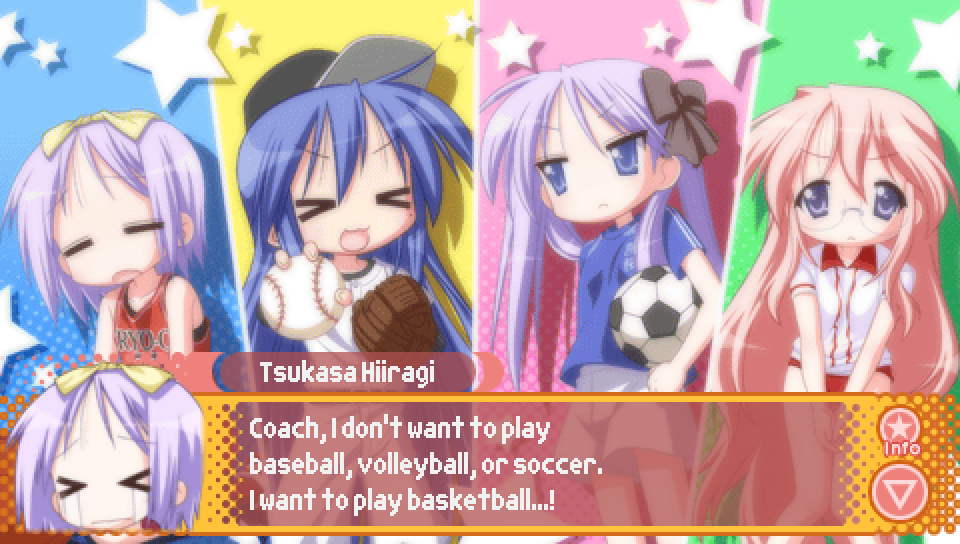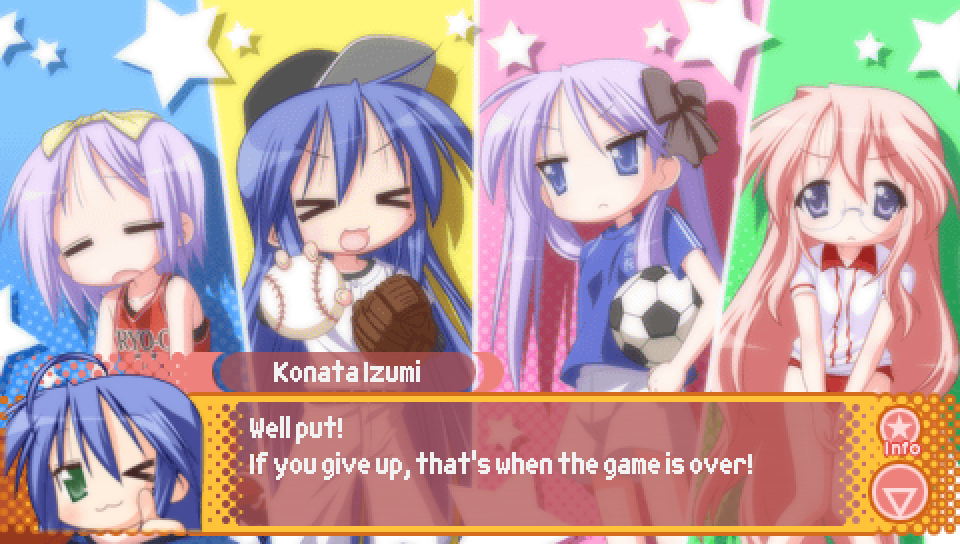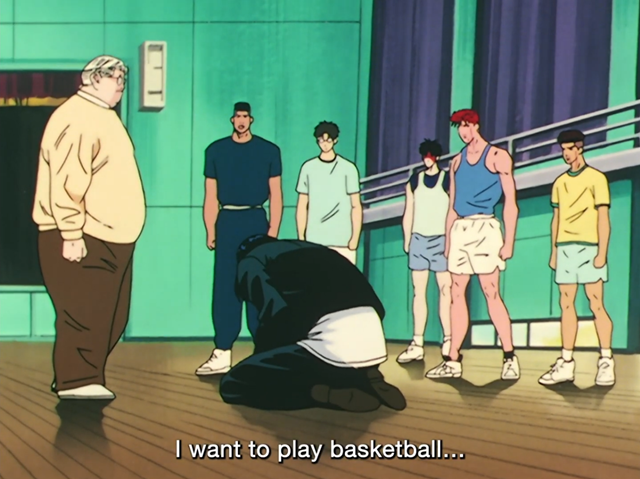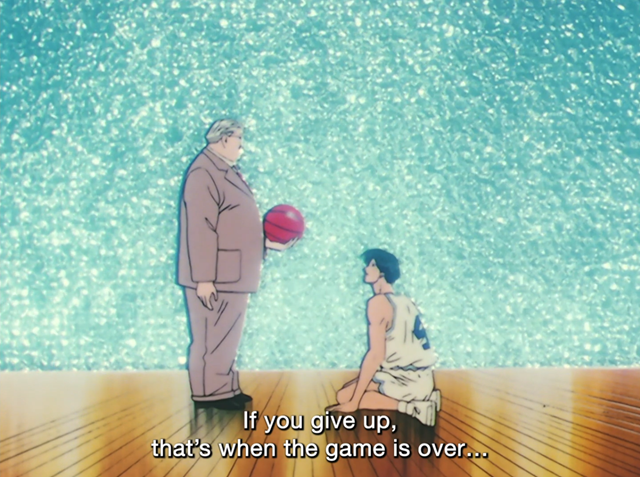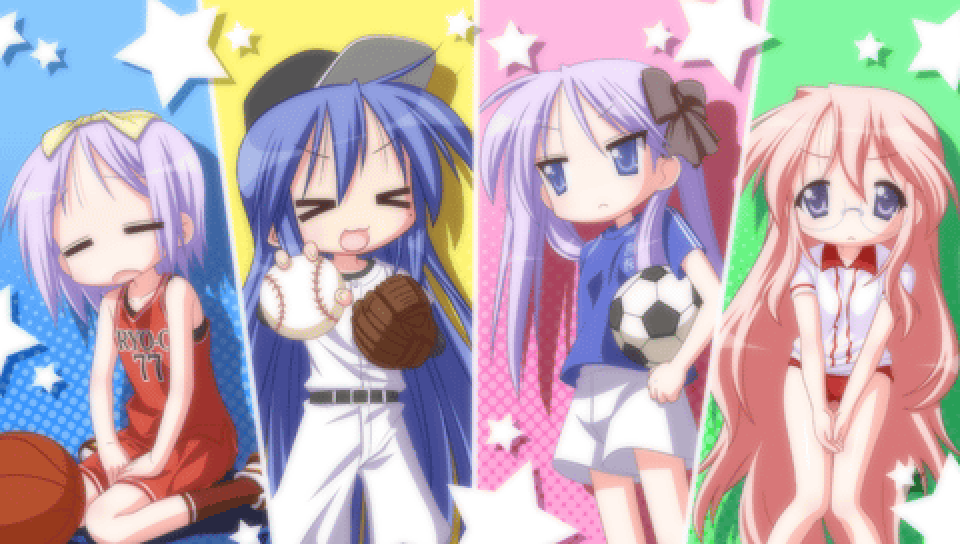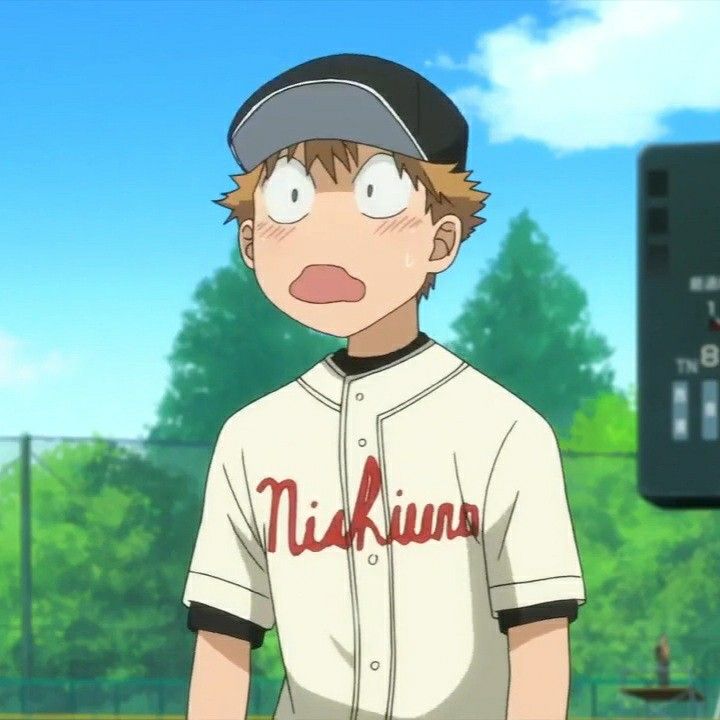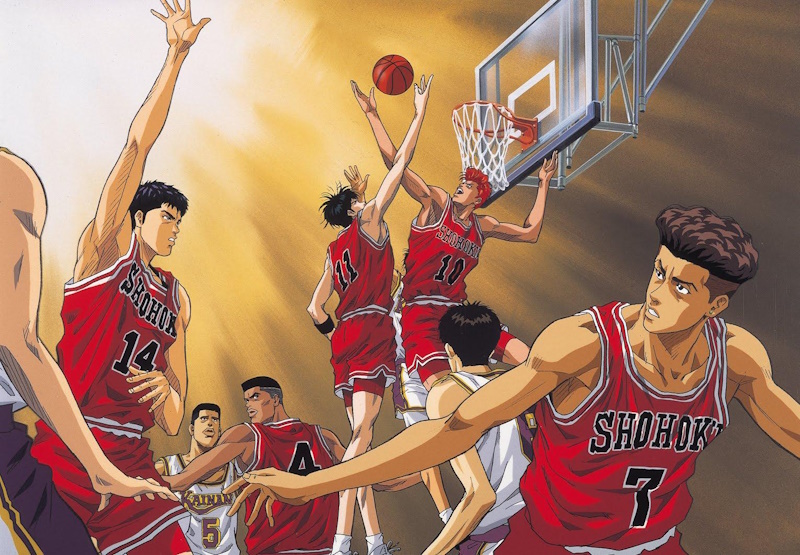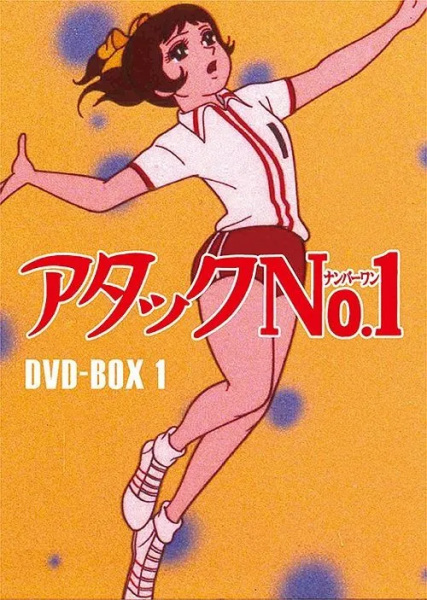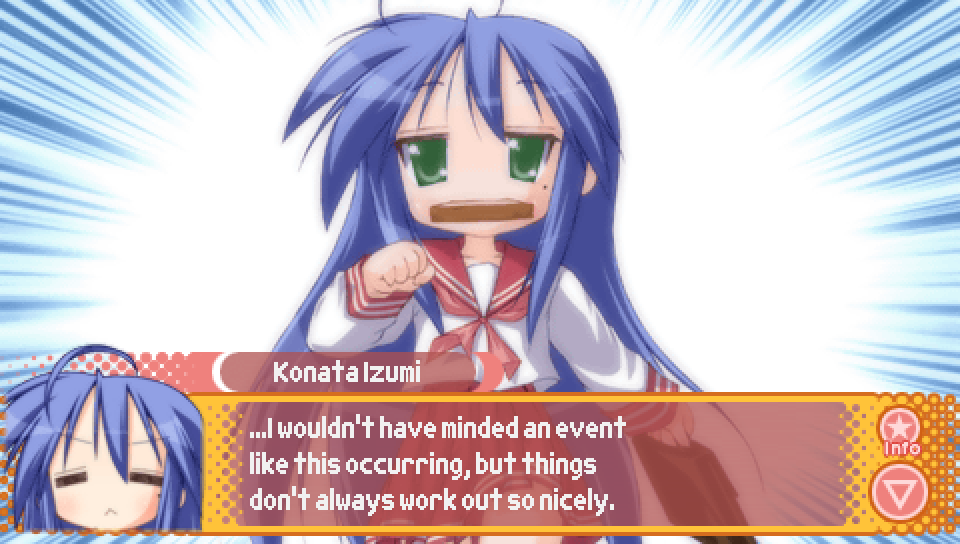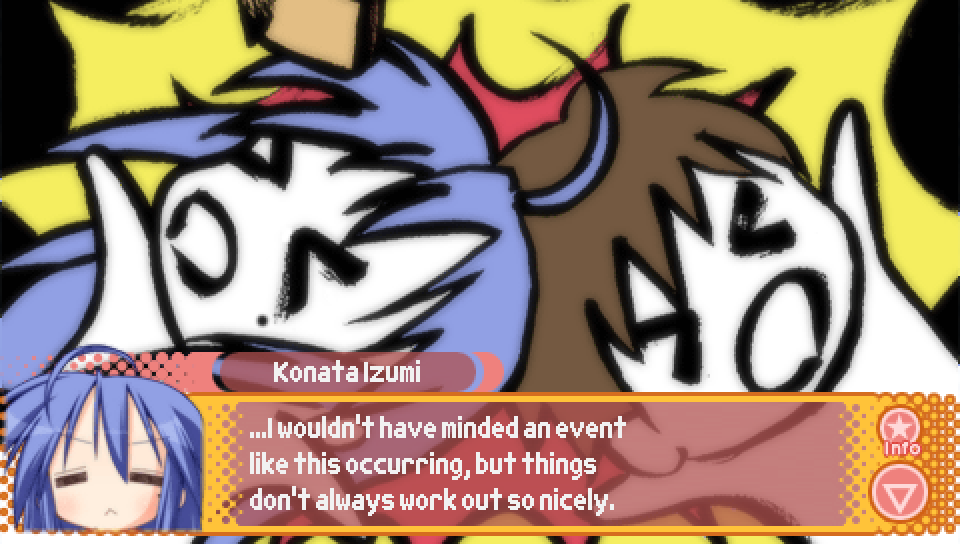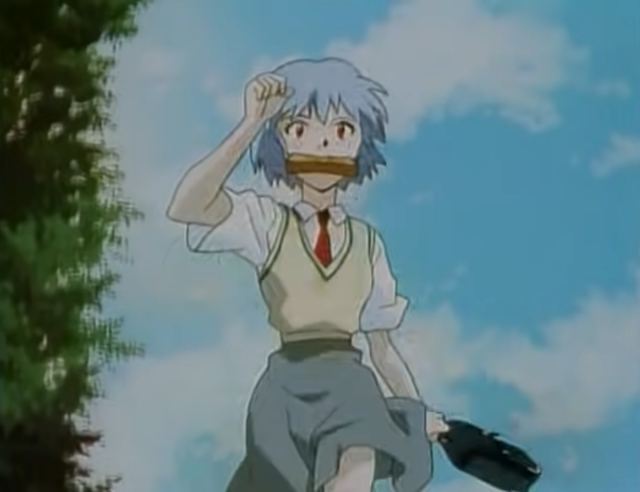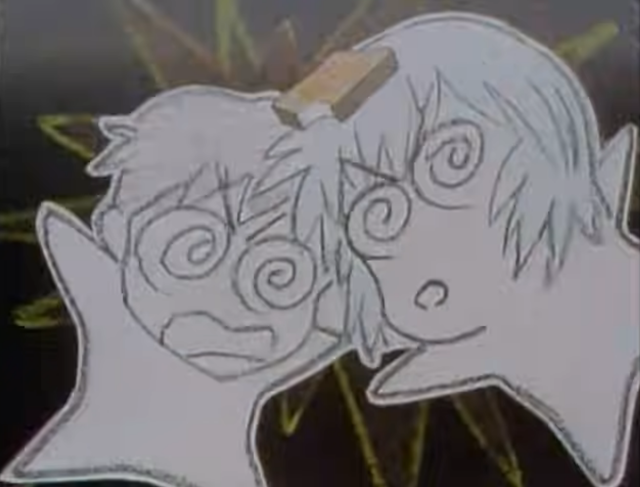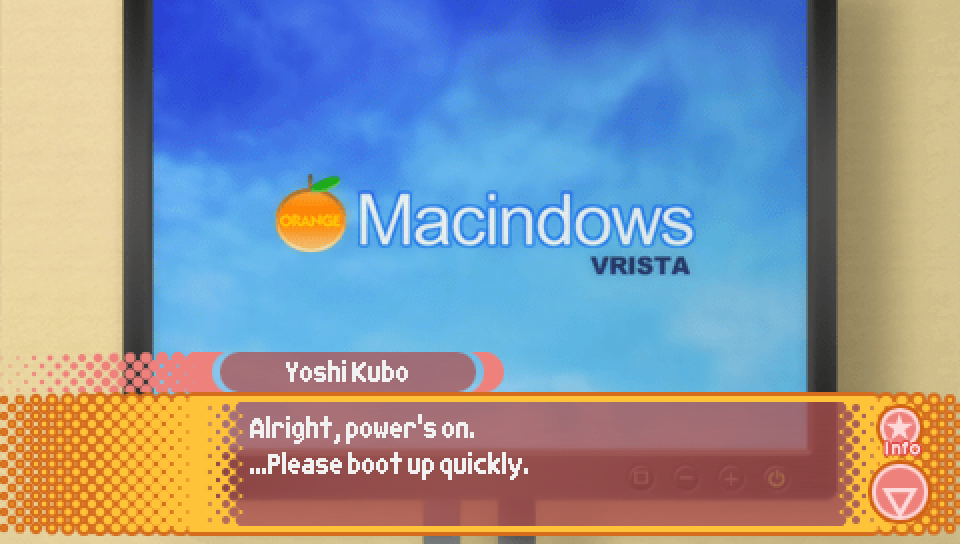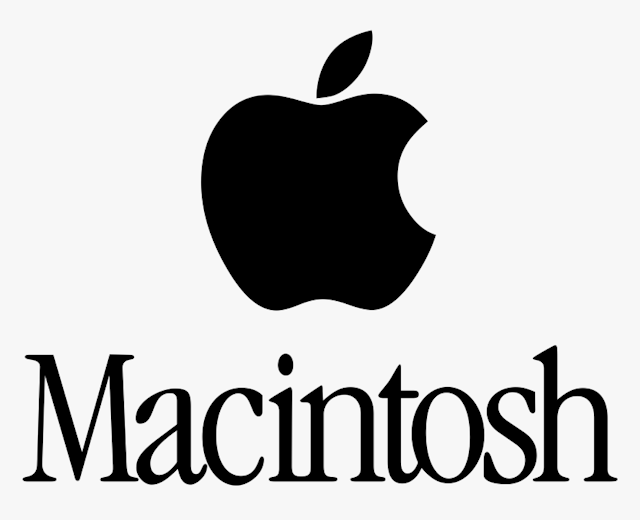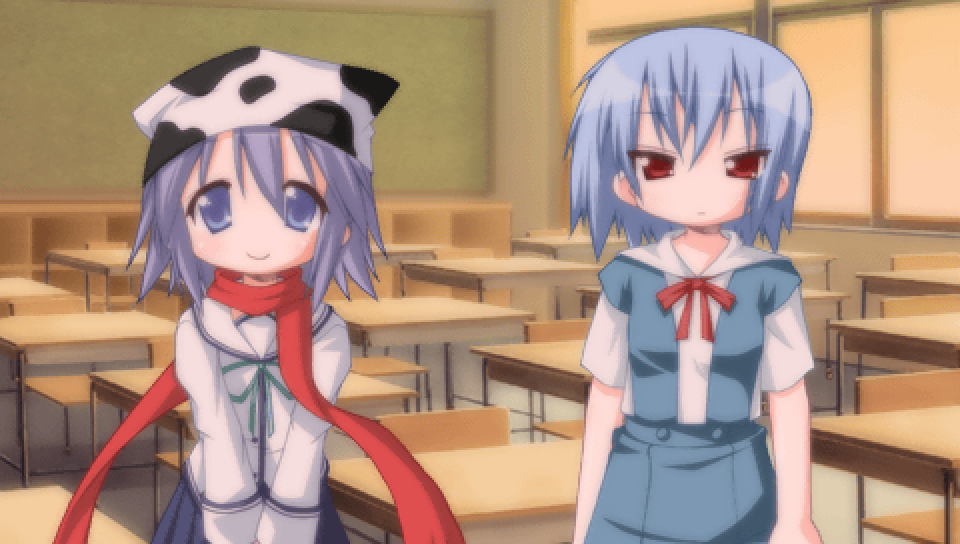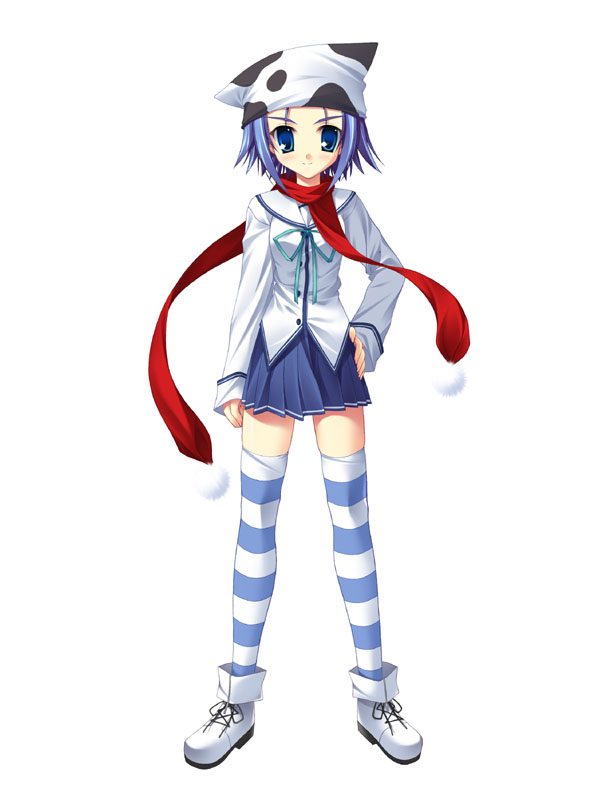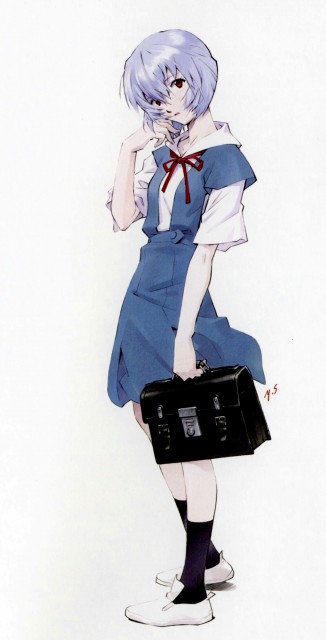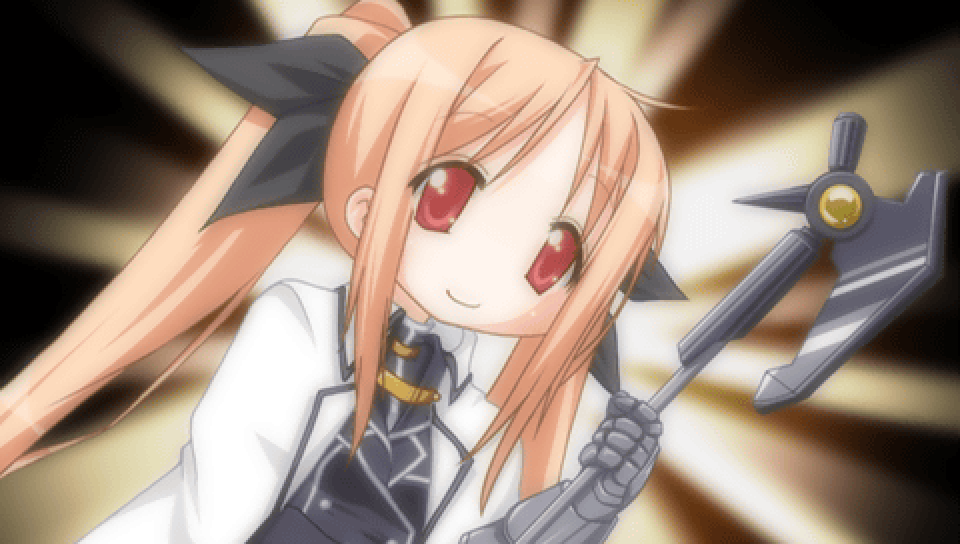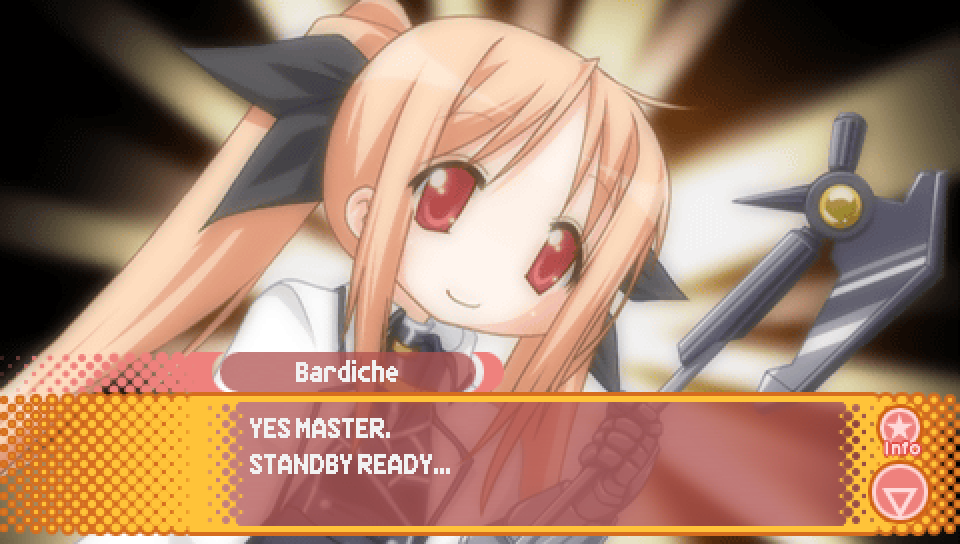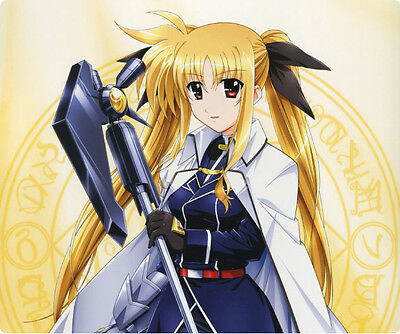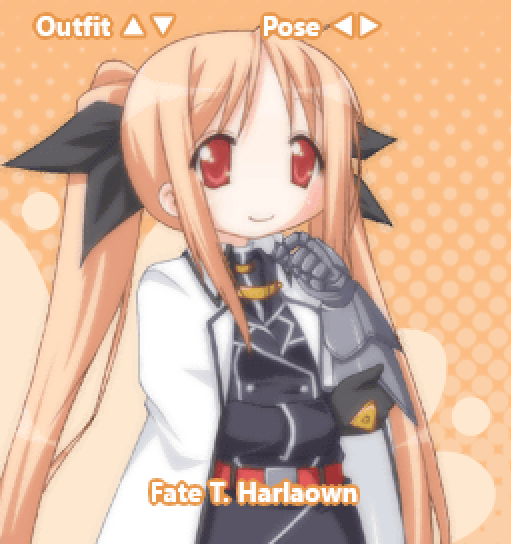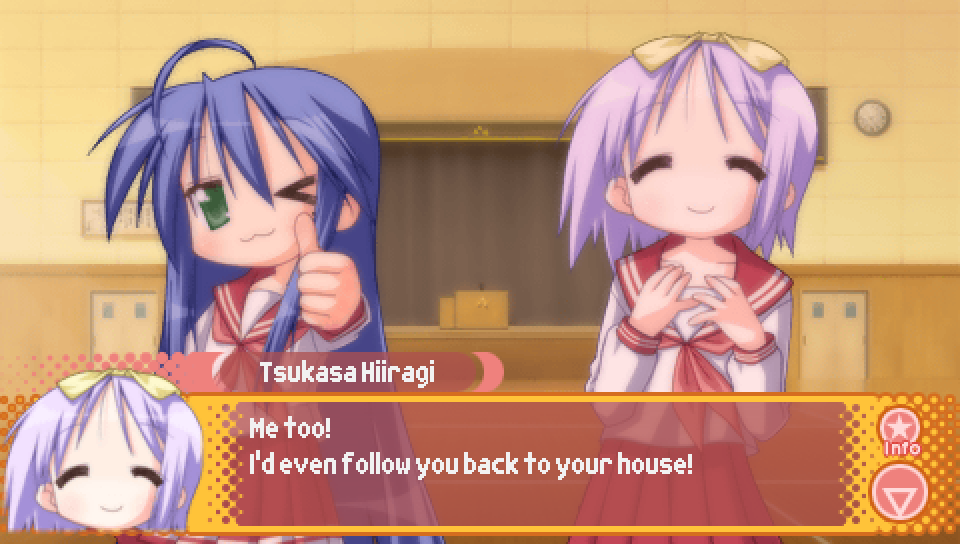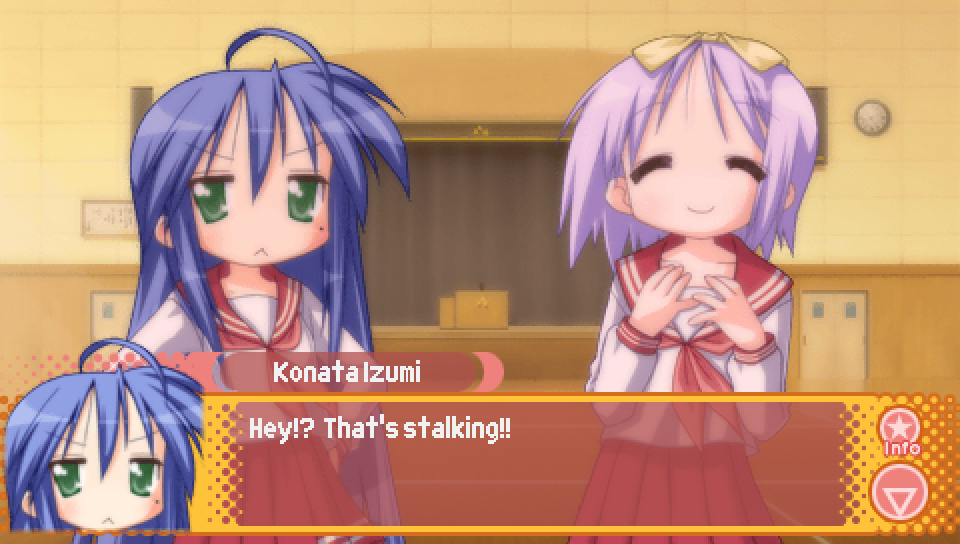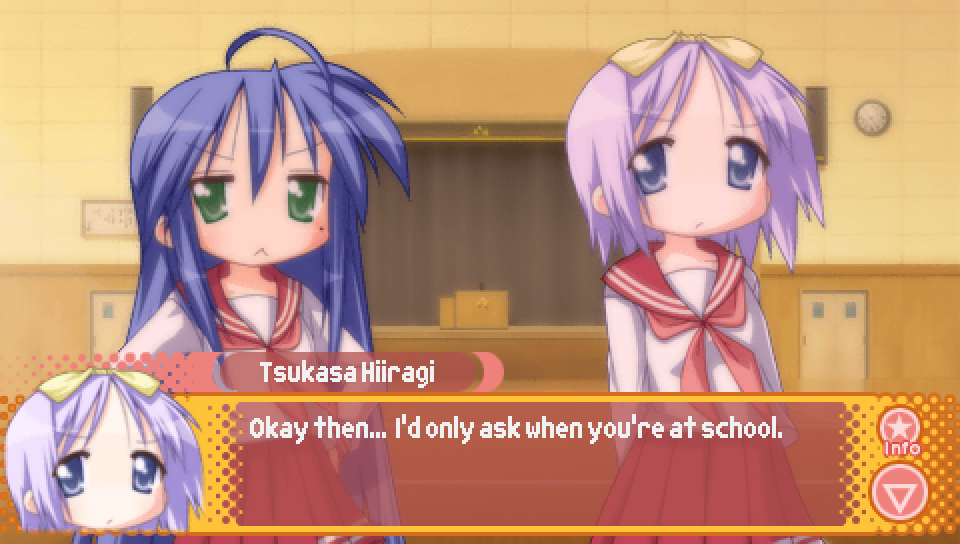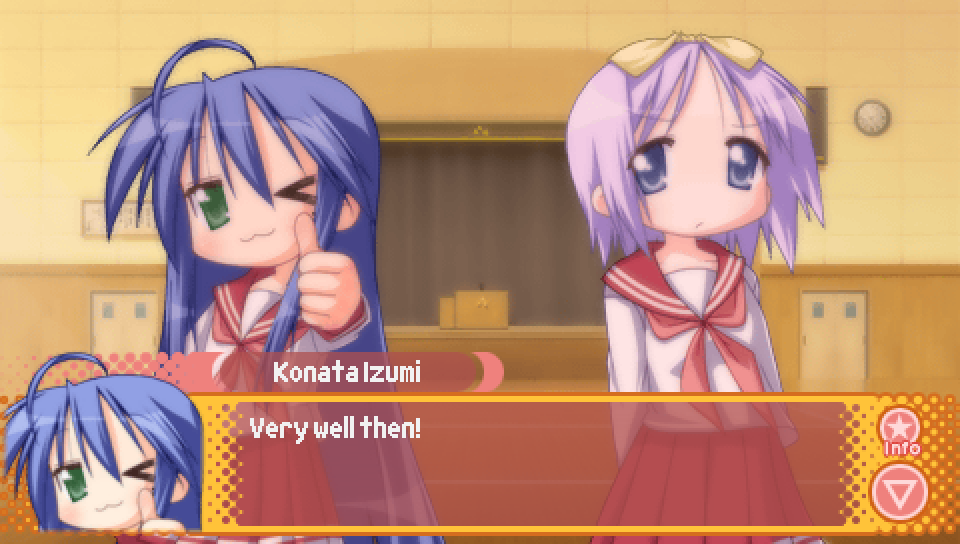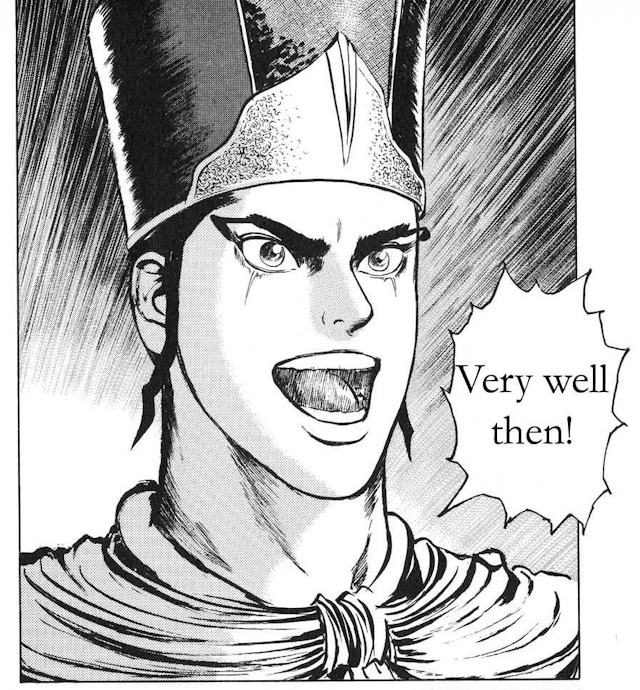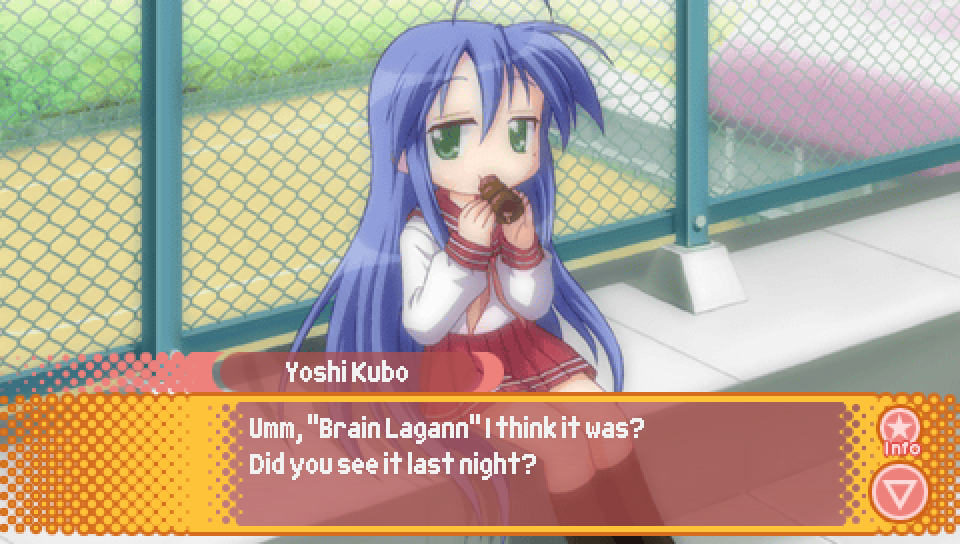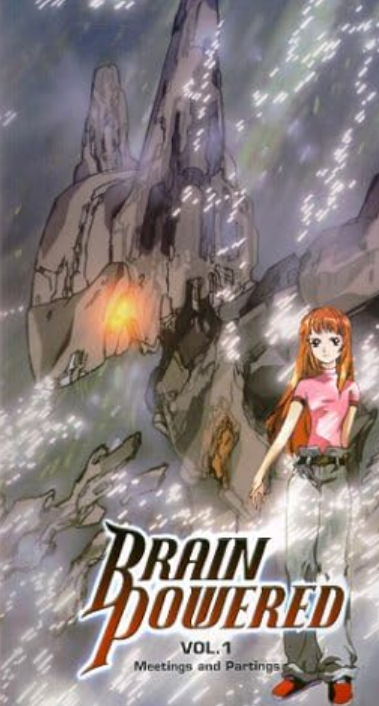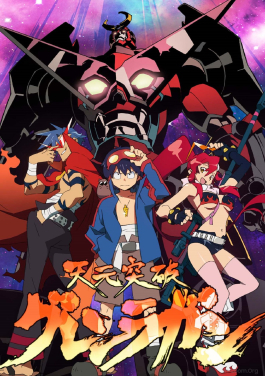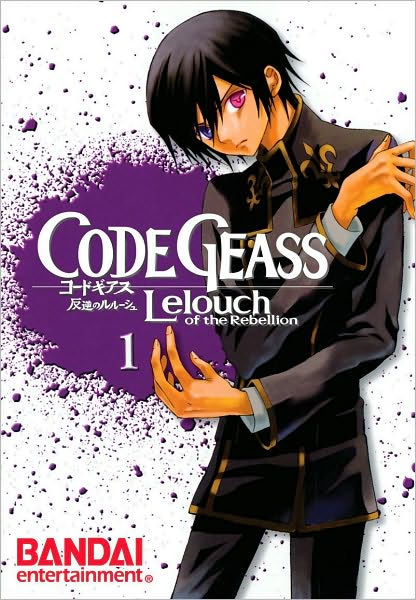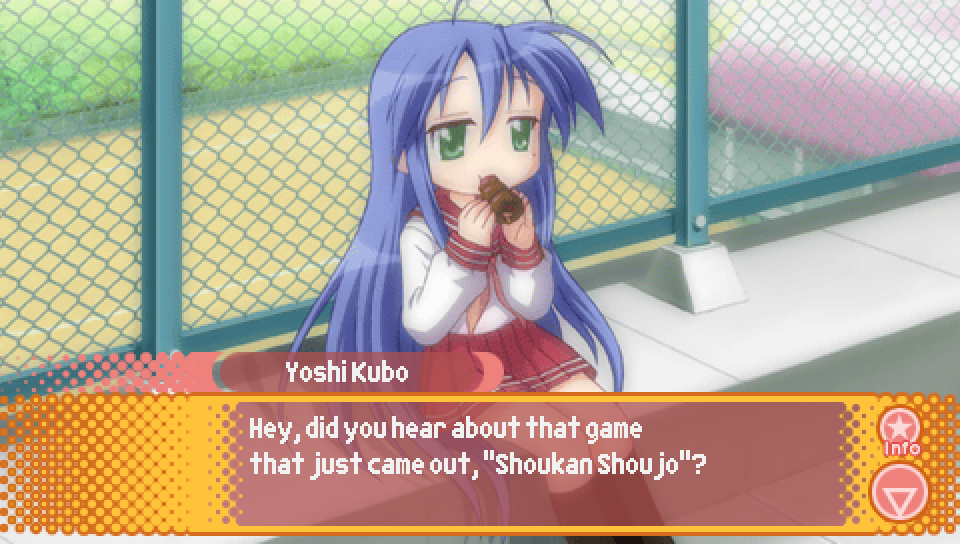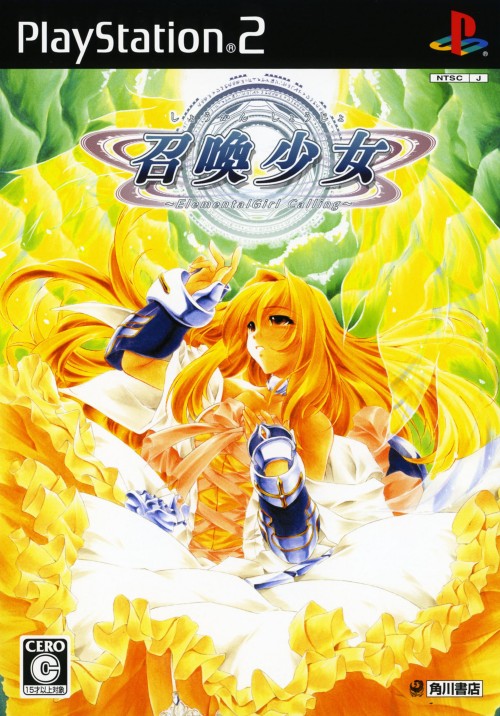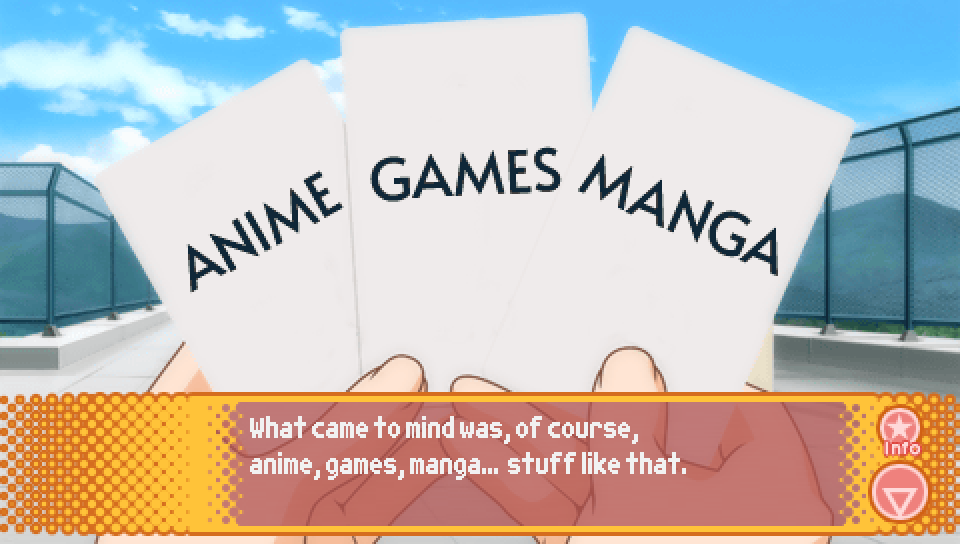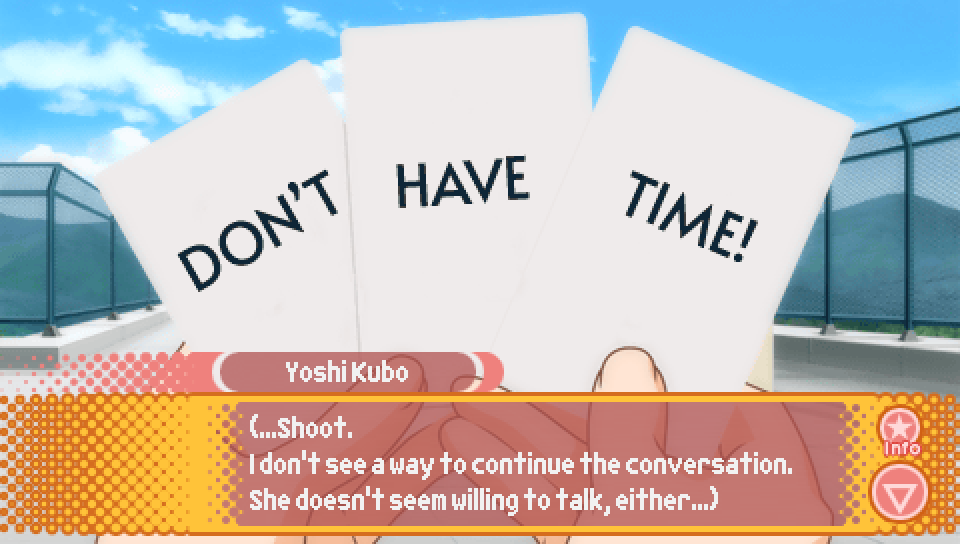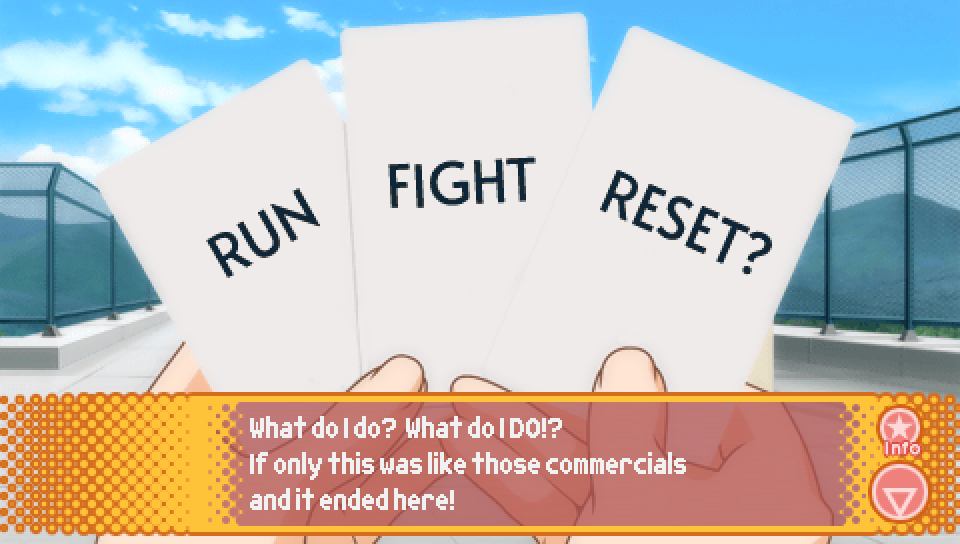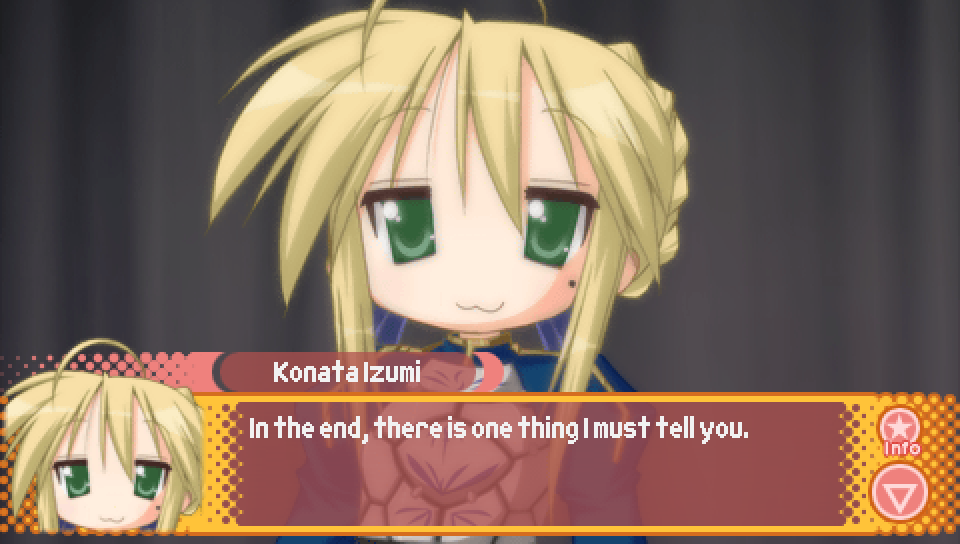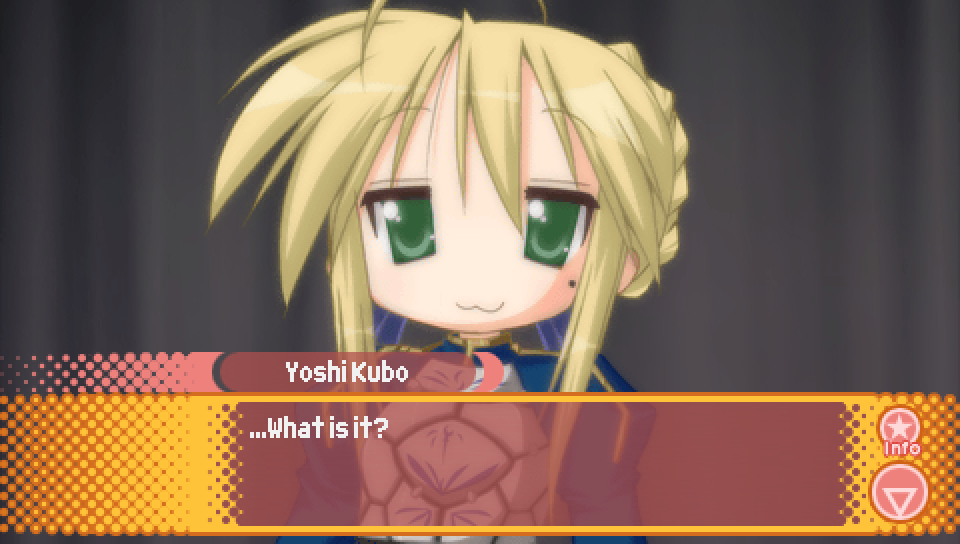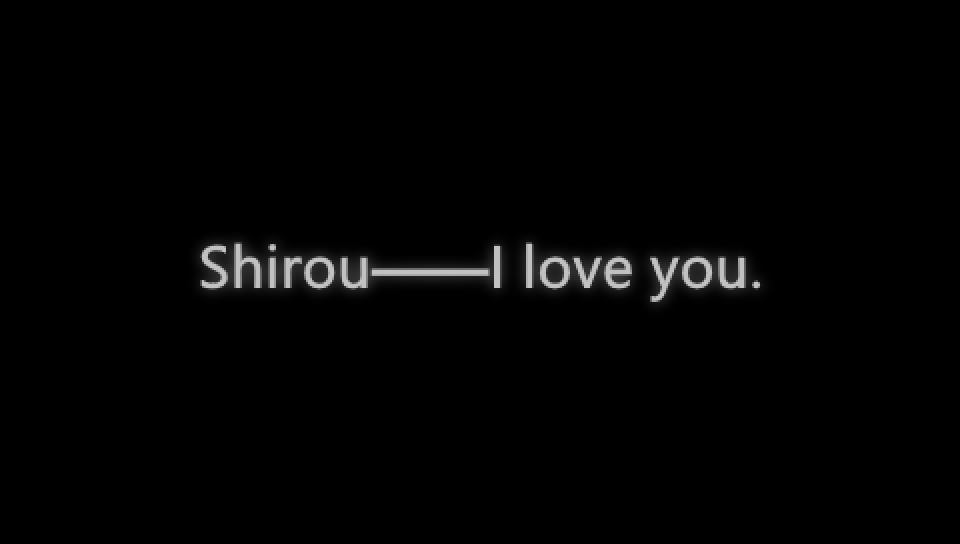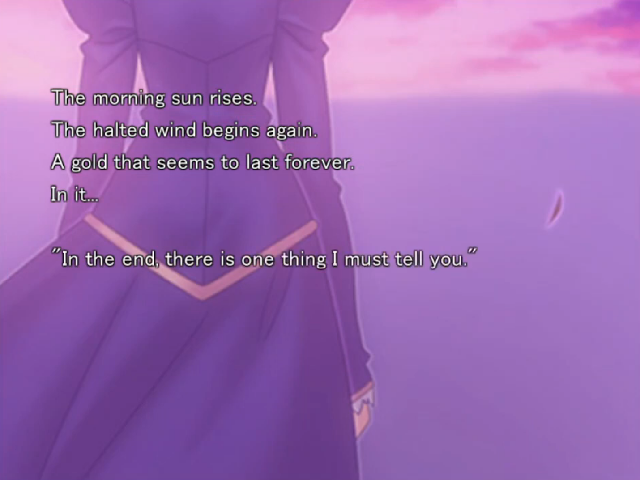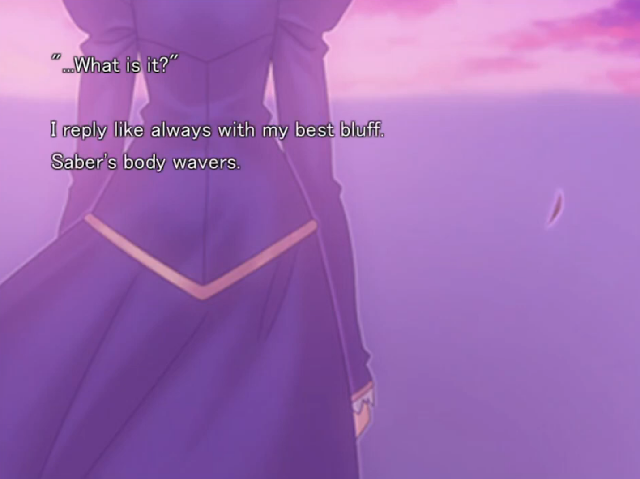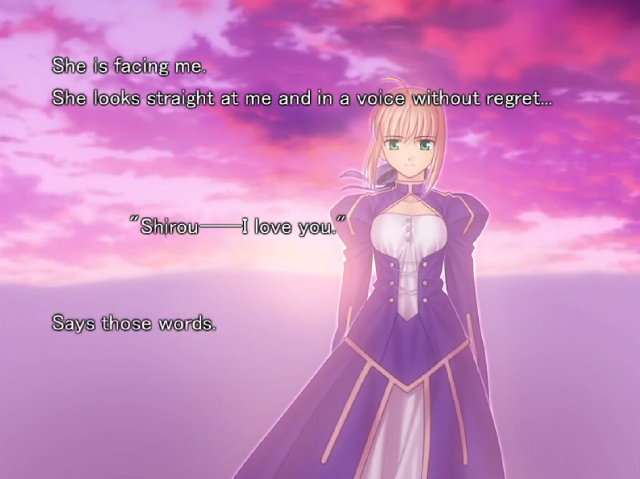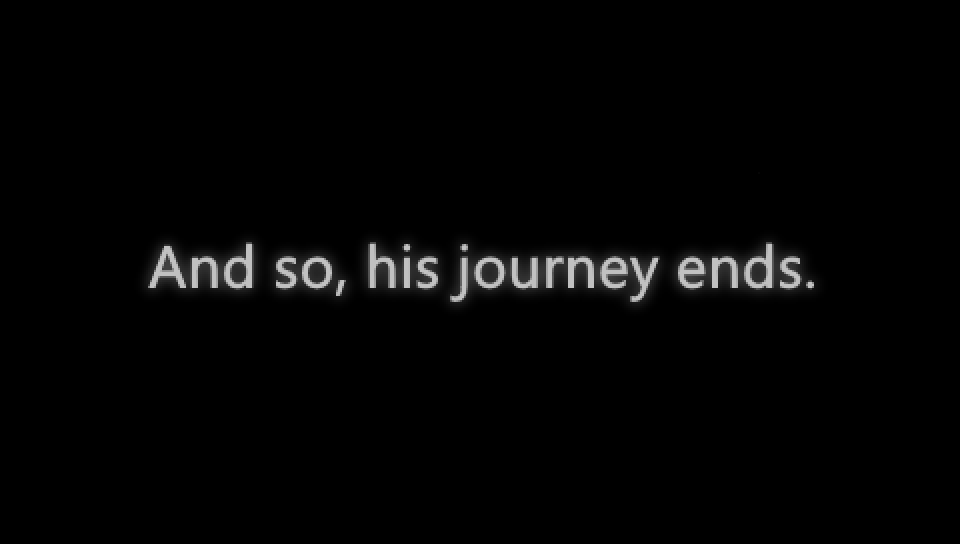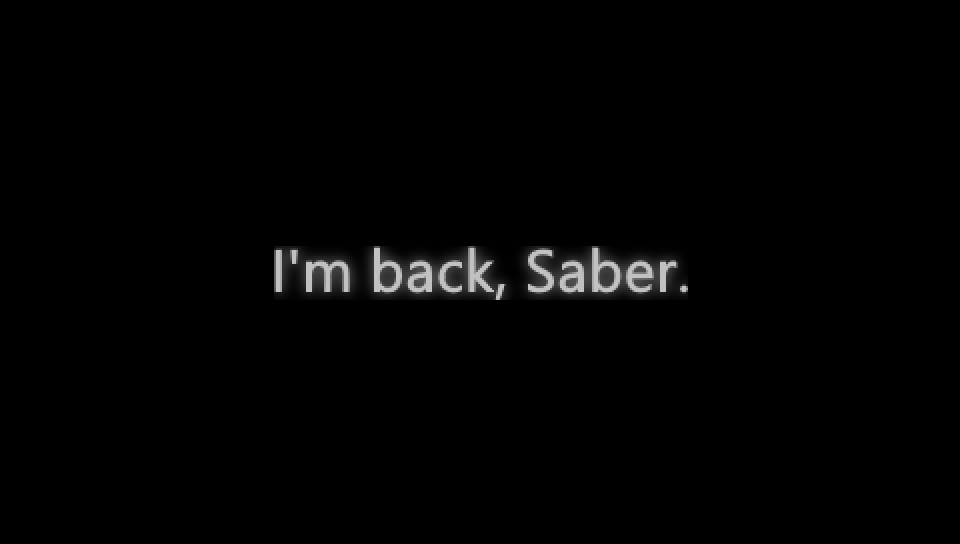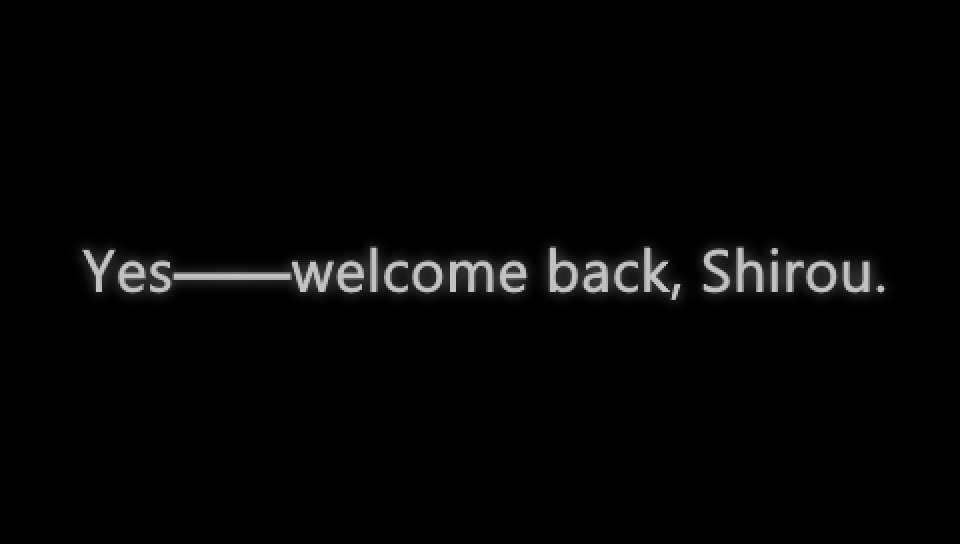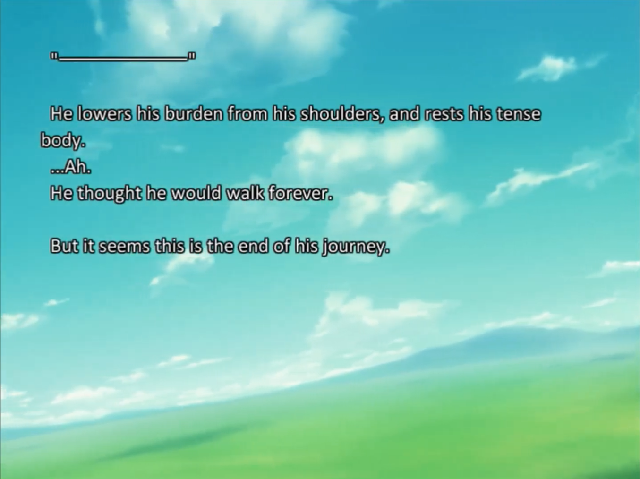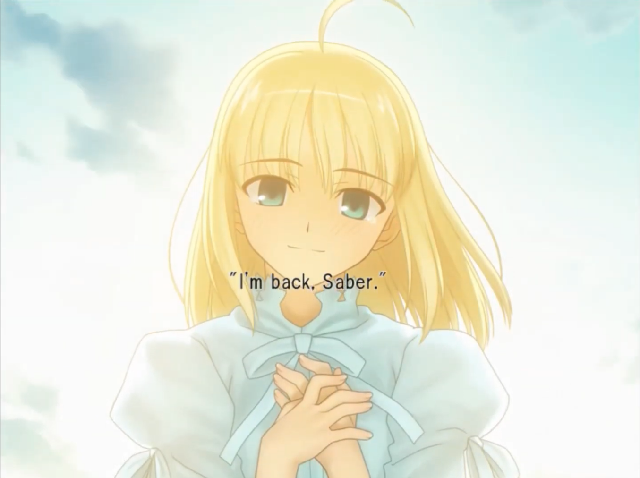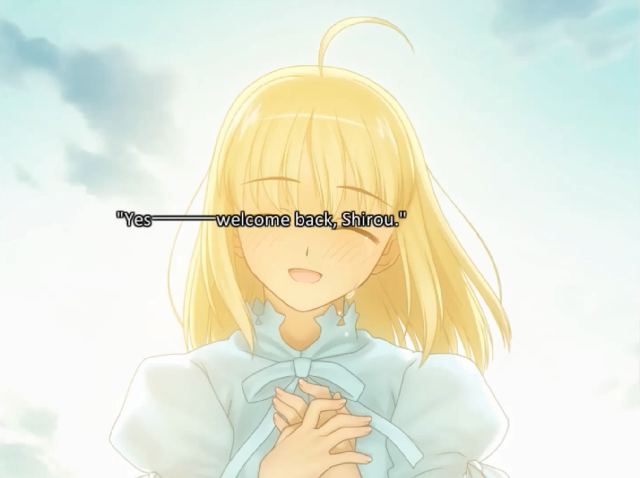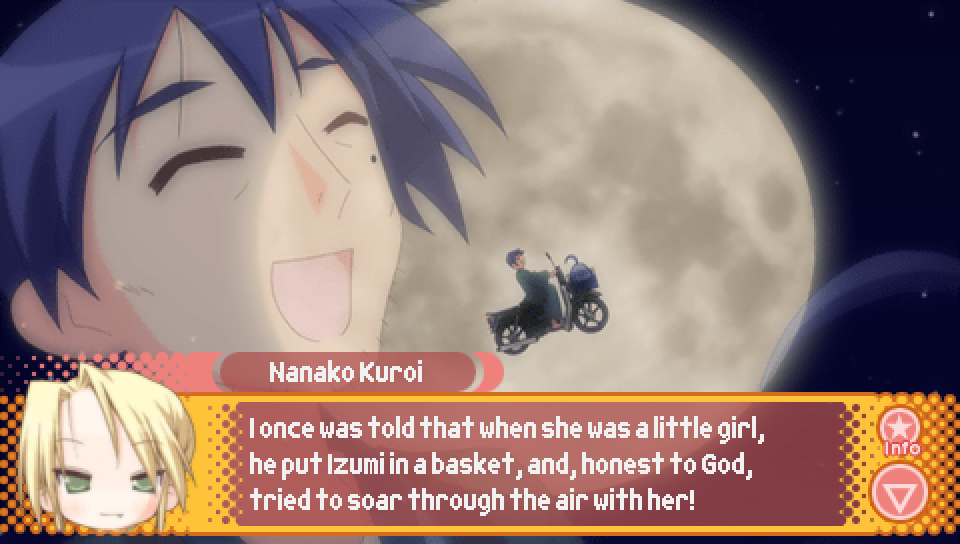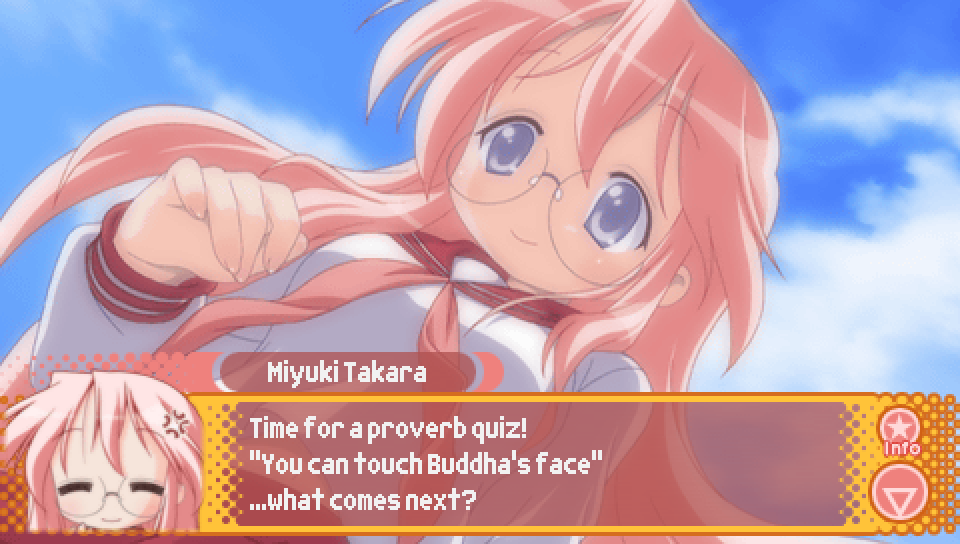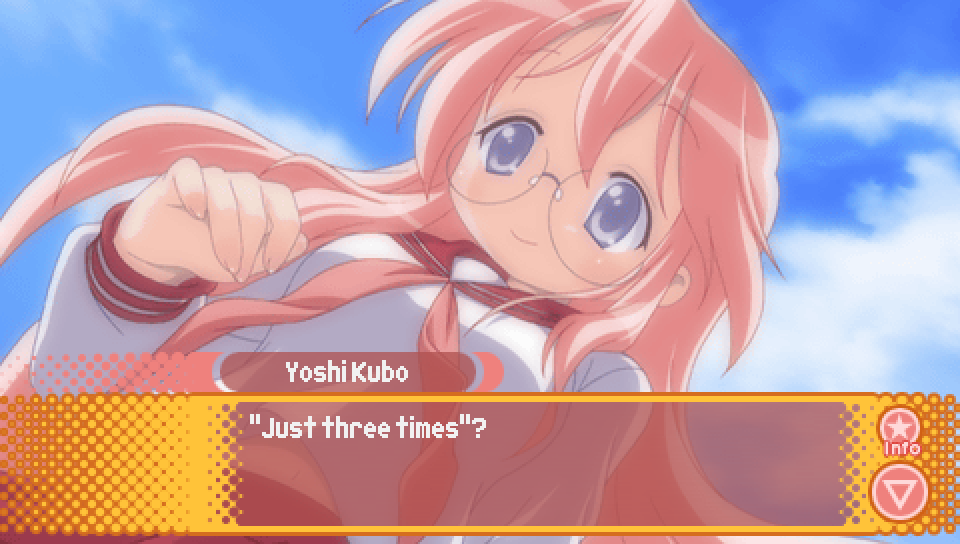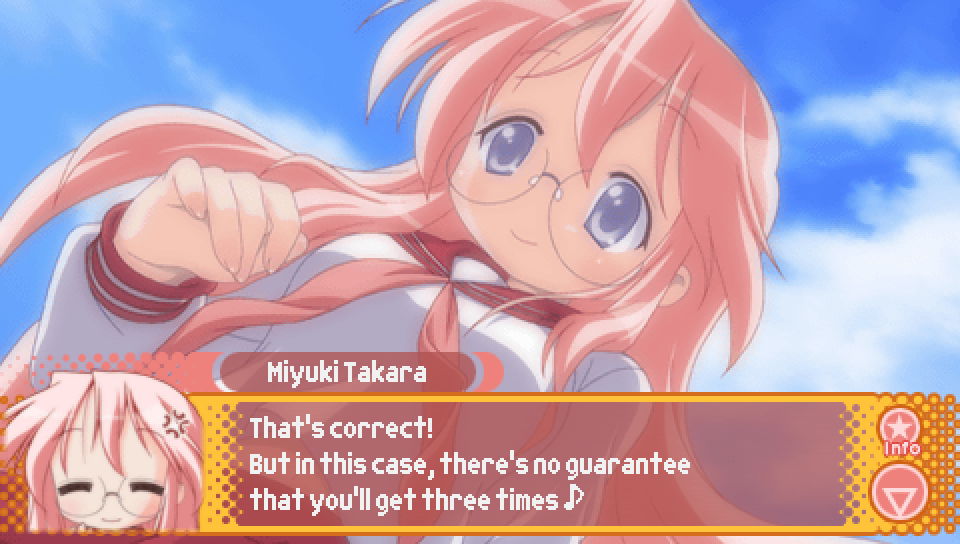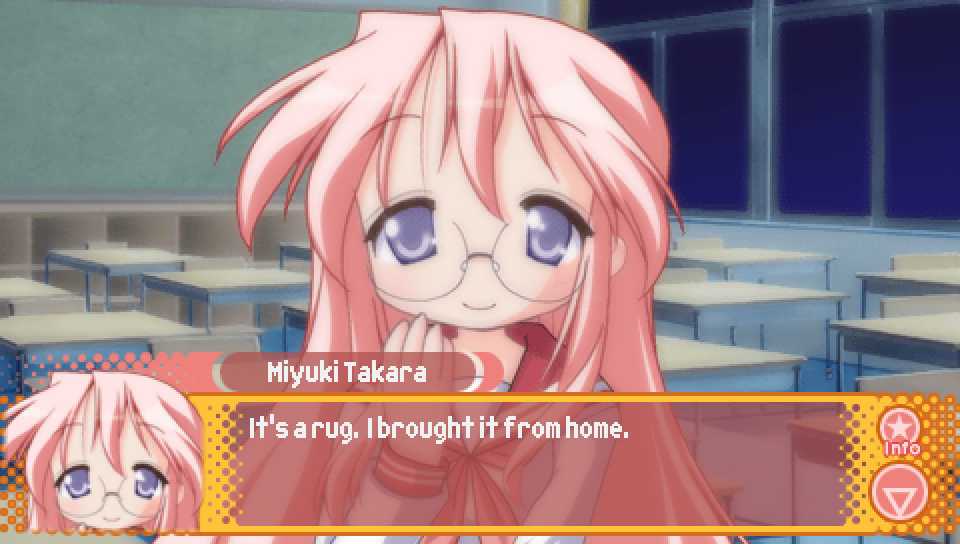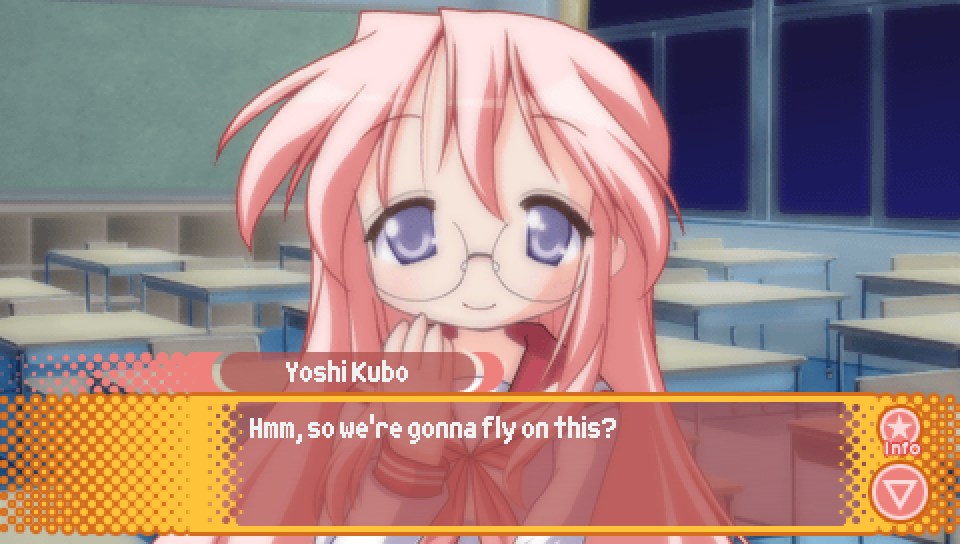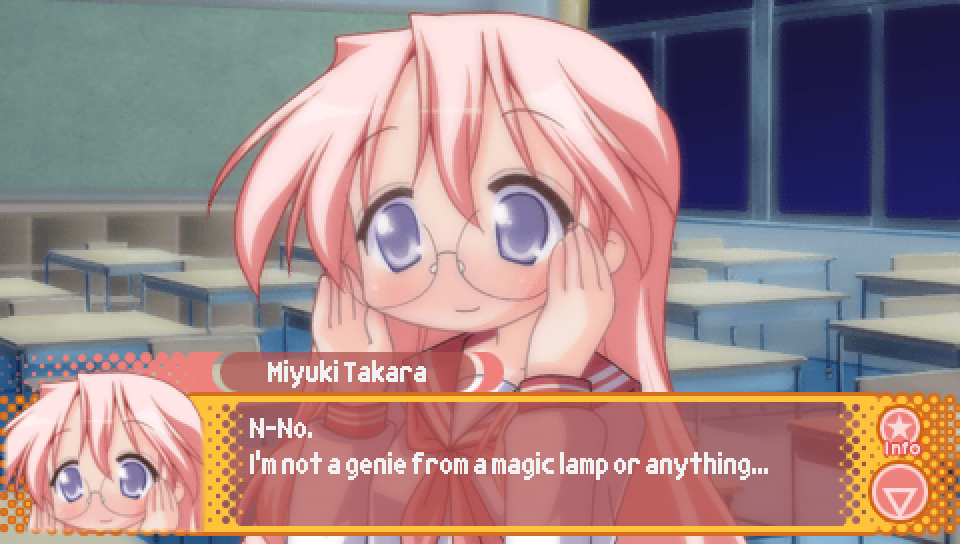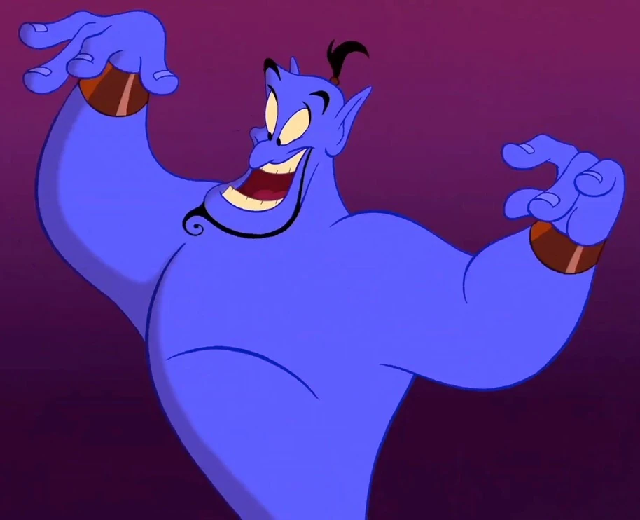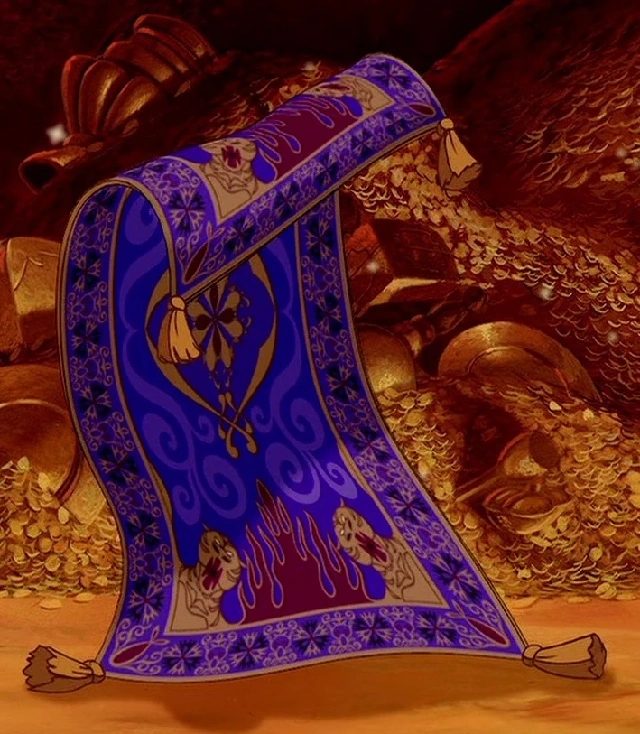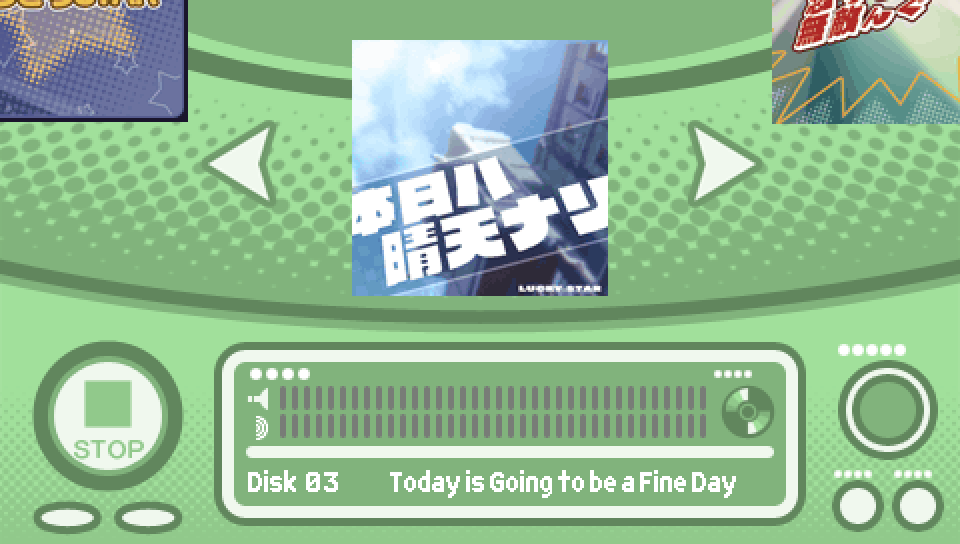Episode 1: Lucky Lucky Memorial |
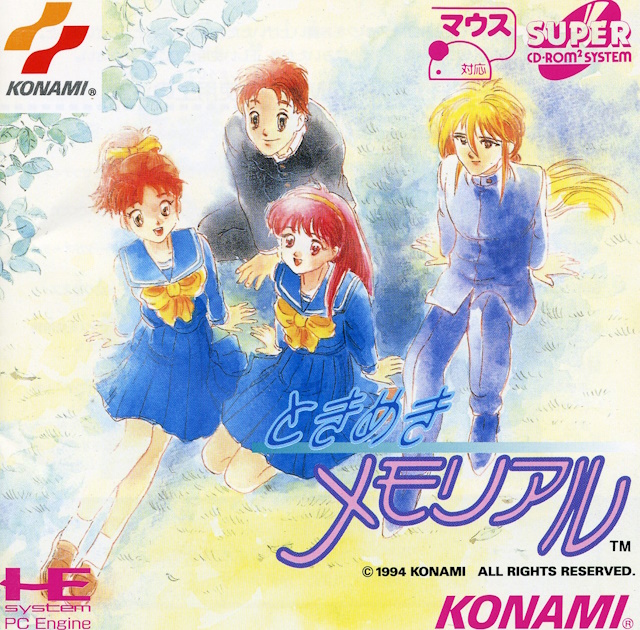
The name of the Episode itself is a parody of "Tokimeki Memorial",
a pioneer of the dating simulation genre of video games and is generally
what inspires the romantic elements of this Episode.
|
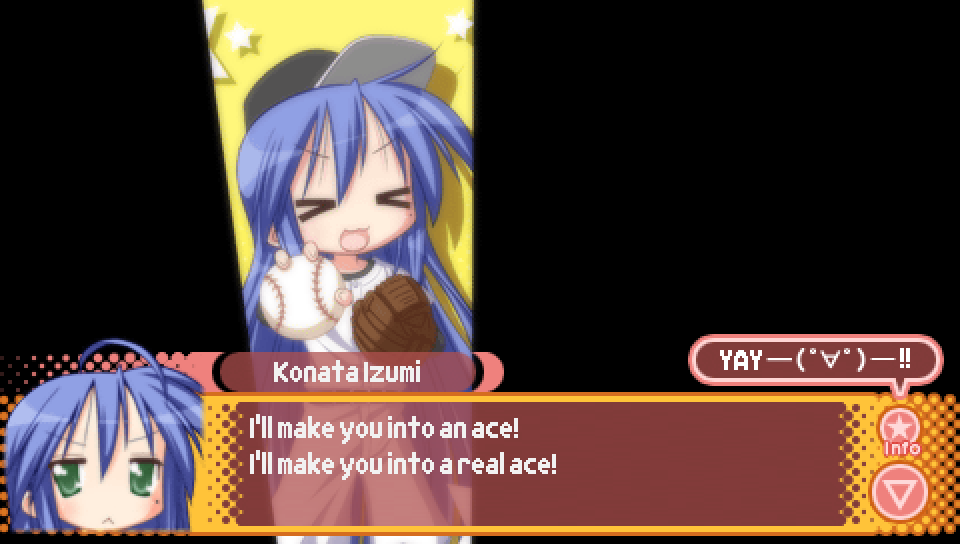
In the intro scene, when Konata is cosplaying as a pitcher,
she is quoting a line said by the character Abe Takaya from the
series "Big Windup!" in which he tells Ren Mihashi that he'll help him in becoming a great pitcher.
This can be seen in the first episode of the anime adaptation at 14:30.
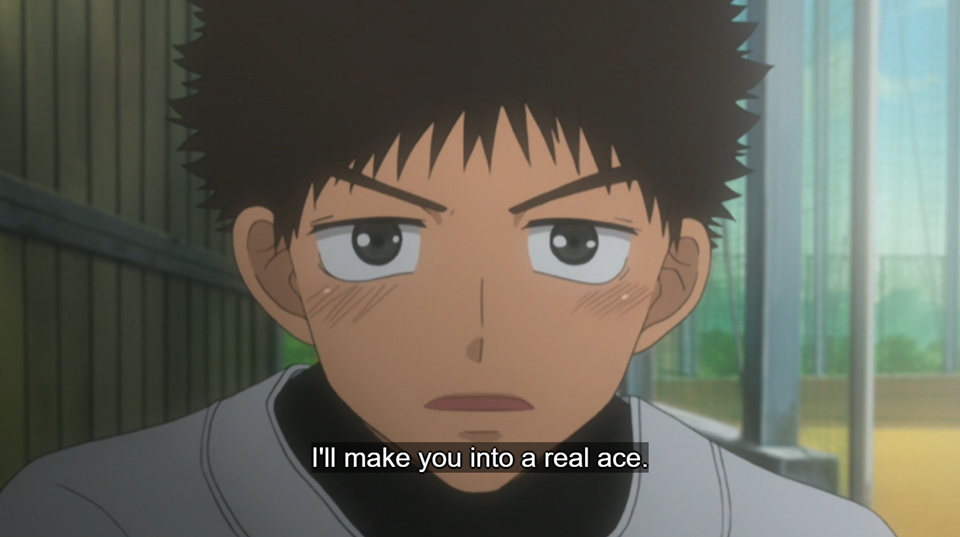
|
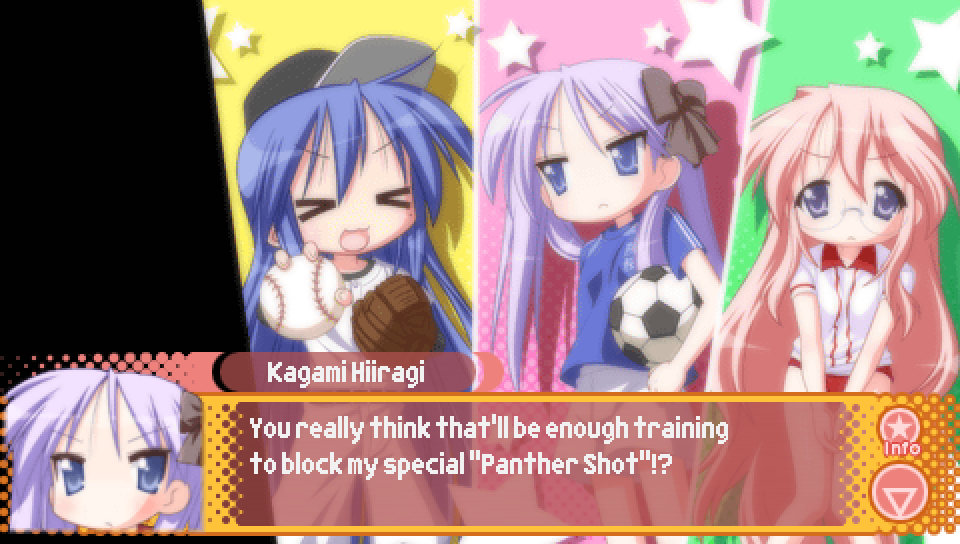
In the intro scene, when Kagami is cosplaying as a soccer player,
her "Panther Shot" is potentially in reference to the "hissatsu techniques"
from the soccer video game series "Inazuma Eleven".
While there is a hissatsu technique introduced in "Inazuma Eleven GO" called
"Panther Blizzard", that game released in December of 2011, which comes after
the release of Lucky Star: Ryouou Gakuen Outousai Portable, which released
in December of 2010.
Linked is a showcase of the Hissatsu Techniques in the original Inazuma Eleven game,
originally released in Japan in August of 2008: https://www.youtube.com/watch?v=LfPC_xB3ick
|
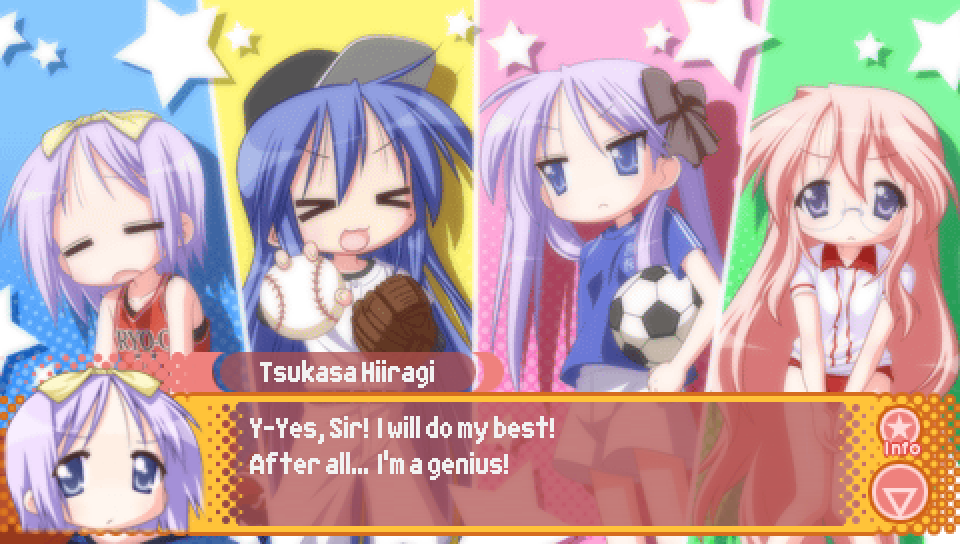
Immediately following the above "Slam Dunk" reference,
Tsukasa quotes the character Sakuragi Hanamichi from "Slam Dunk",
who is known for referring to himself as a genius.
The specific wording used by Tsukasa in the Japanese matches a notable panel
from "Slam Dunk: 10 Days After", a short sequel to "Slam Dunk" that was released in 2004.
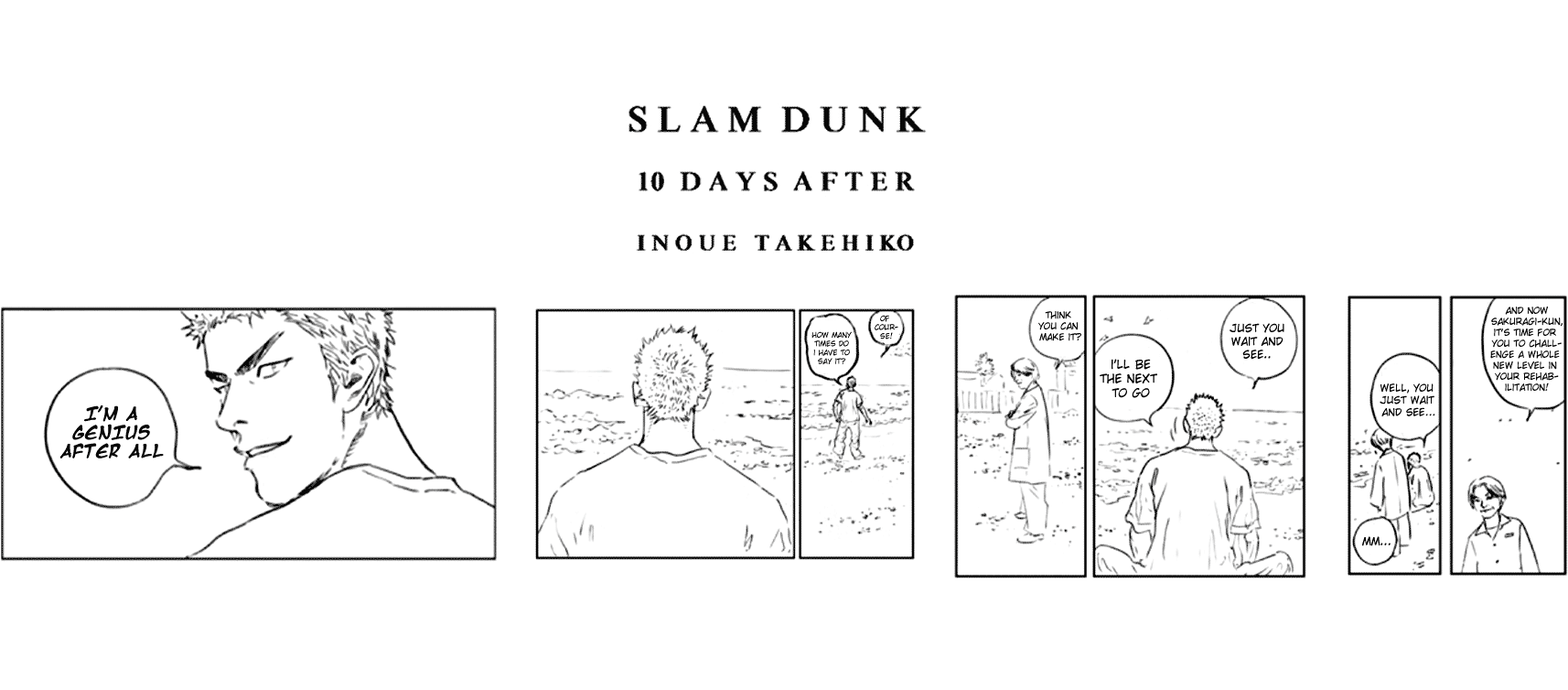
|
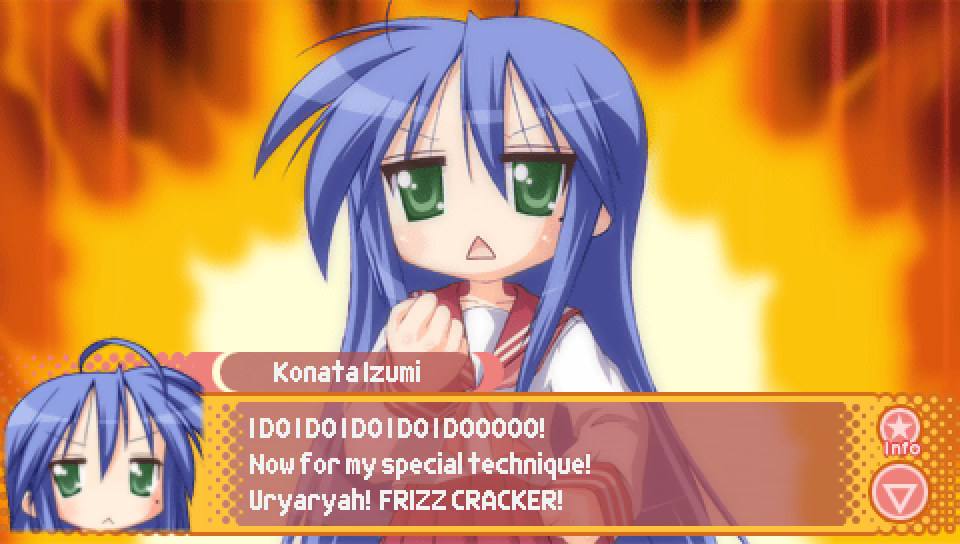
In the intro scene, when Konata is trying to summon the power of
"the spirits of the stars", the "Frizz Cracker" ability she uses
is in direct reference to an ability of the same name from the "Dragon Quest" series.
https://www.youtube.com/watch?v=o7Mgs-N2iV8&t=20s
|
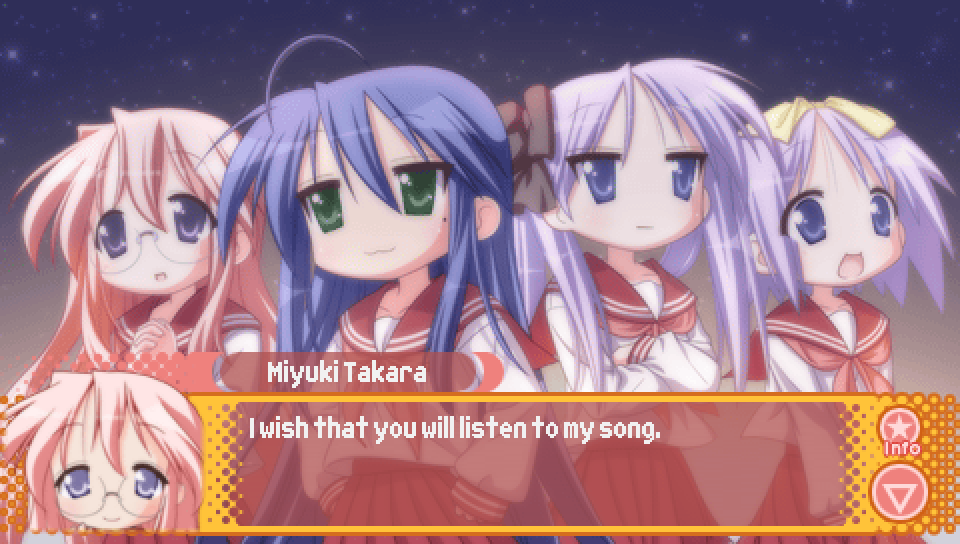
In the intro scene, when Miyuki makes a wish "that you will listen to my song",
it is possibly in reference to Miyuki's voice actress, Aya Endou, who also voiced
the character "Sheryl Nome" from "Macross Frontier", who is a singer.
Ironically, Aya Endou does not voice Sheryl when she is singing, with that role
instead being performed by Japanese artist May'n.
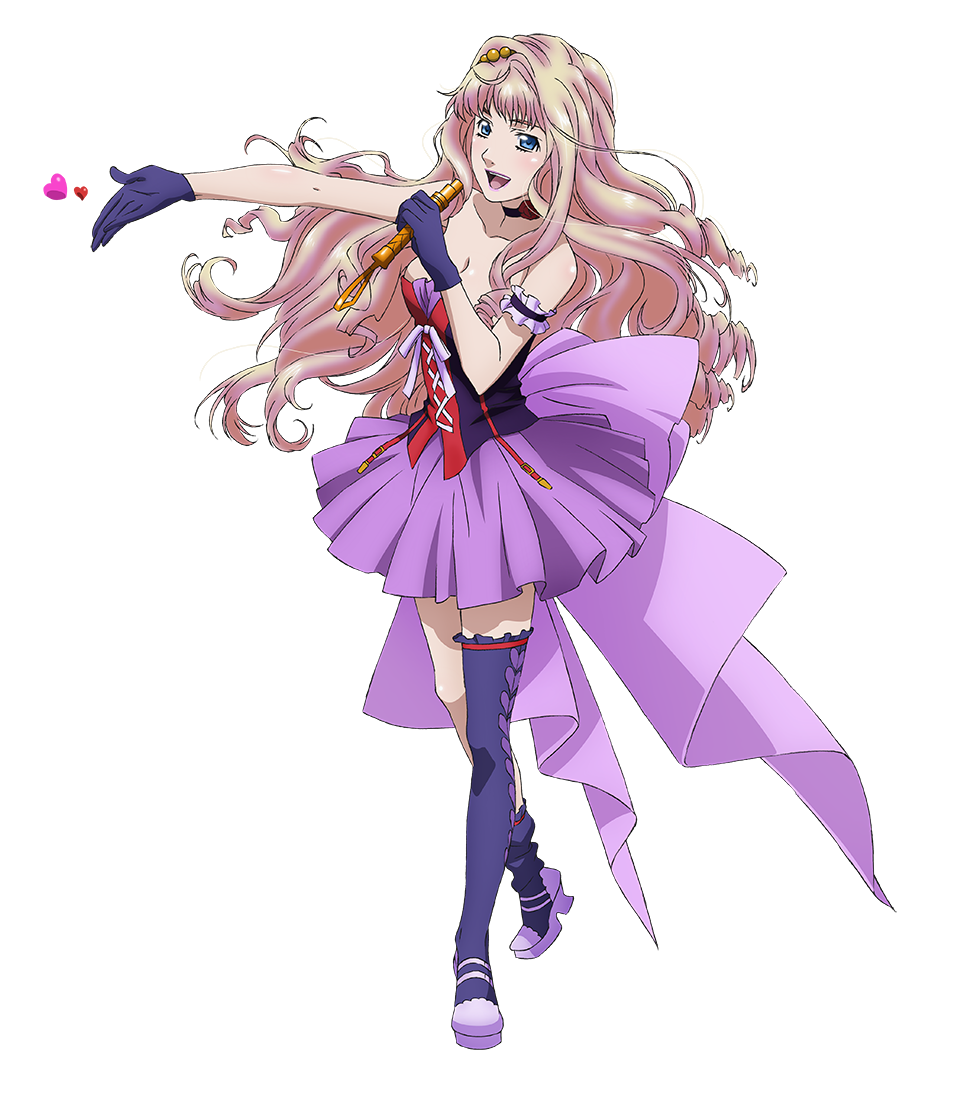
|
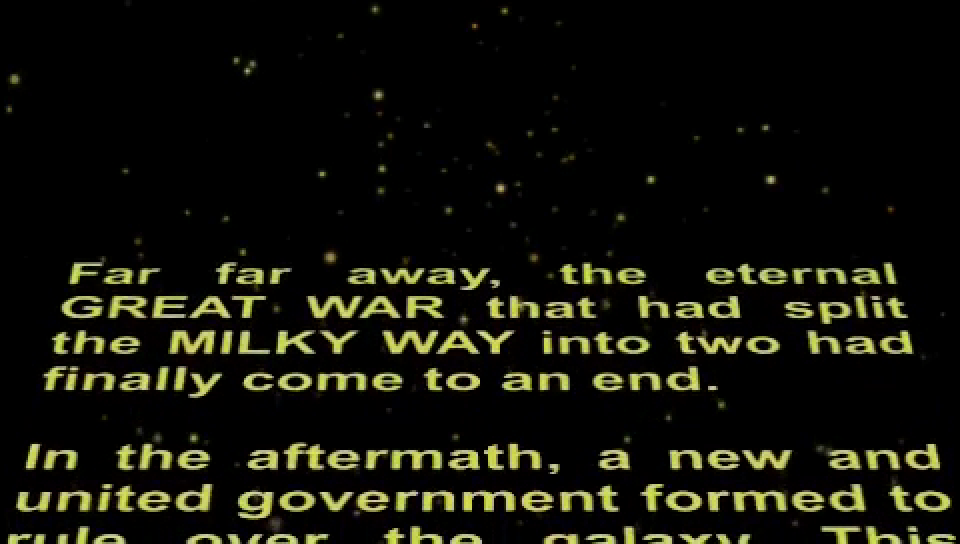
Though it likely goes without saying, the text crawl
featured at the start of the cutscene following the intro scene
is in reference to the text crawls that appear at the beginning
of movies in the "Star Wars" series.
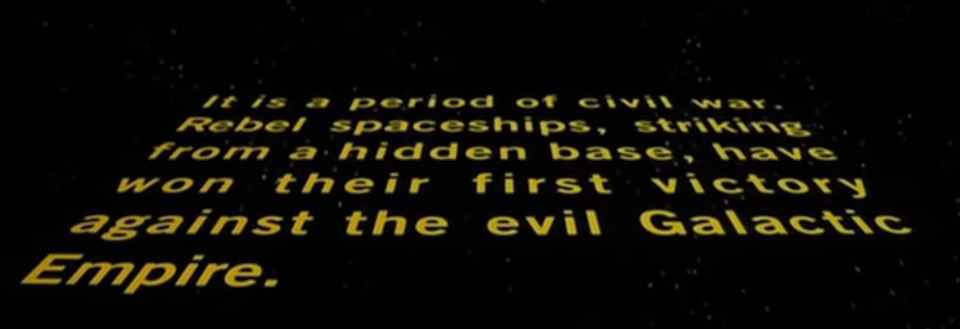
|
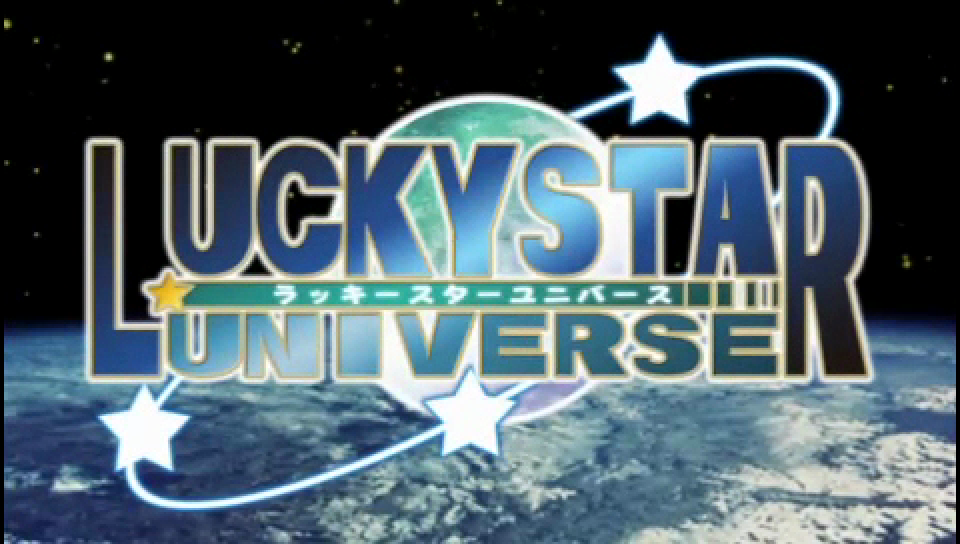
The name "Lucky Star Universe" is a reference to the RPG "Phantasy Star Universe",
developed and published by Sega in 2006.
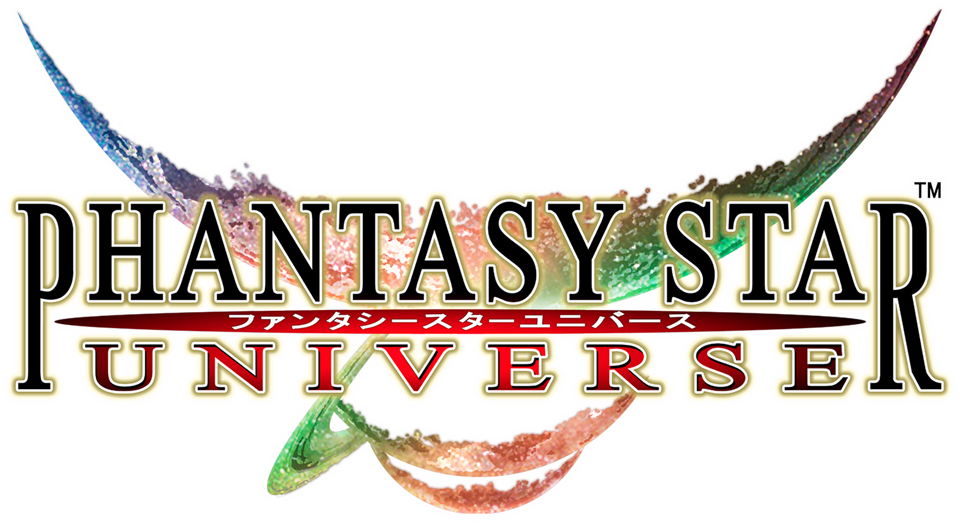
|
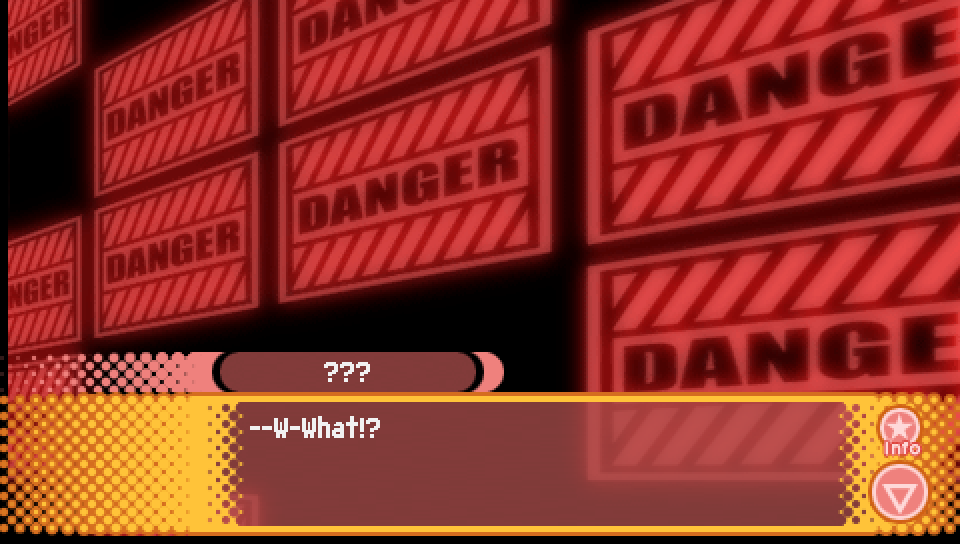
The TV show the protagonist watches on the morning of the first day
takes some inspiration from the anime series "Neon Genesis Evangelion".
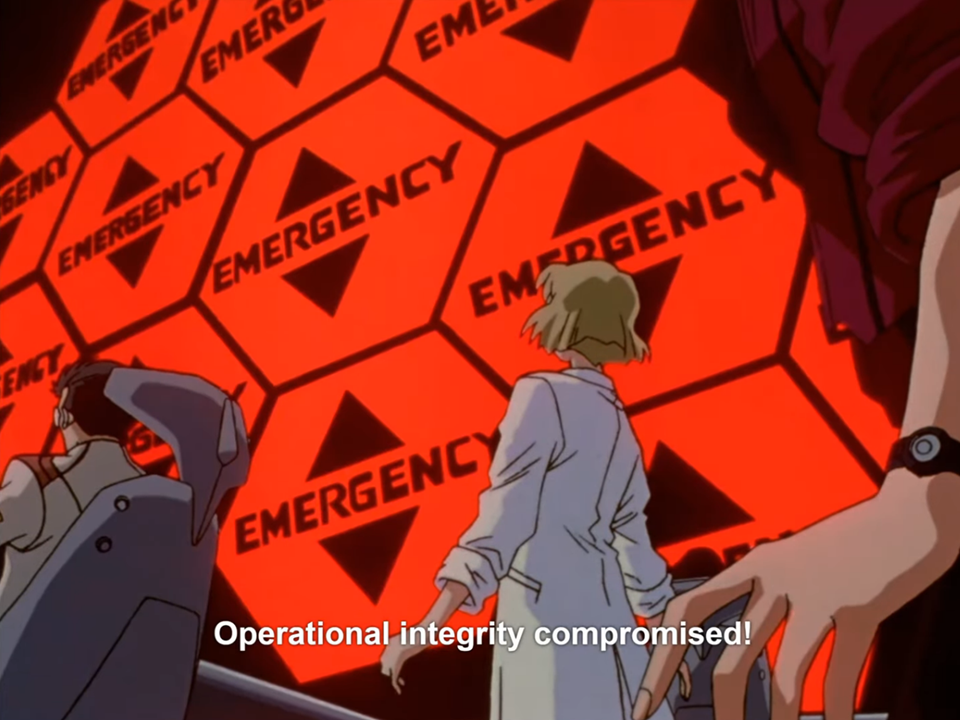
|
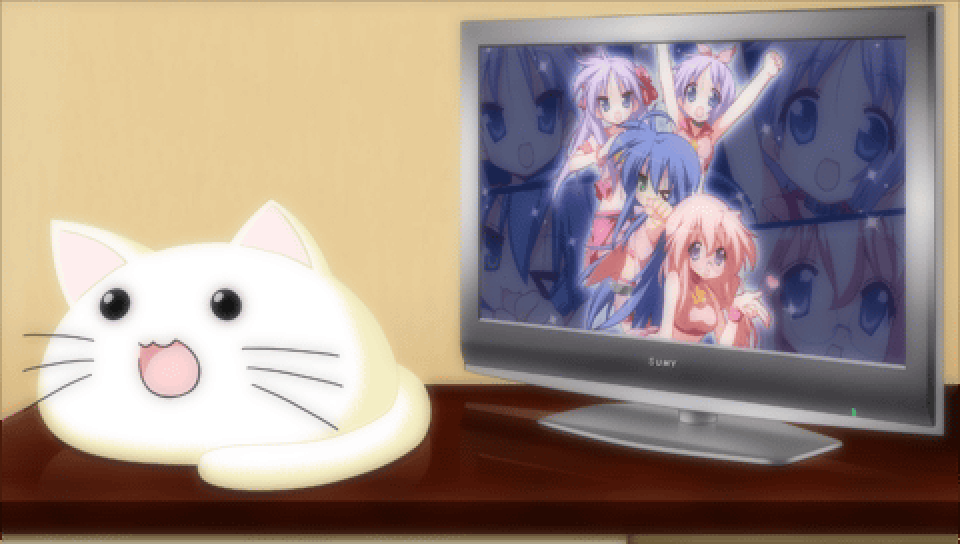
The advertisement that appears on the TV on the morning of the first day
is based on the key art for Lucky Star: Net Idol Meister,
another Lucky Star game for the PSP, which released in 2009.
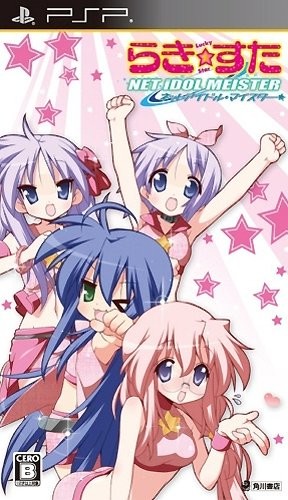
|

The protagonist's thoughts flashing on the screen in quick succession
are presented with a unique typographical style that is a reference to the title cards
from "Neon Genesis Evangelion".
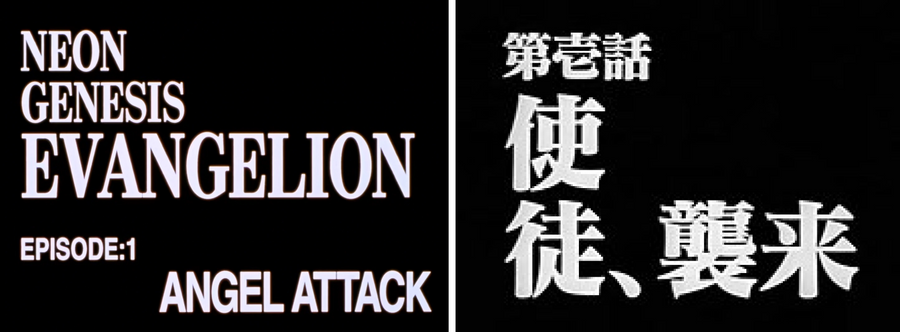
A compilation of these title cards used in "Neon Genesis Evangelion" can be viewed here:
https://www.youtube.com/watch?v=Qpc8bb798NQ
Unfortunately, this is a reference that ended up being a bit lost in translation as the
unique style seen in the Japanese Evangelion title cards doesn't translate well to
English text. Even the title cards used in the English translation of Evangelion does not
preserve the style perfectly, as can be seen above.
This sequence as it appears in the original Japanese version of
Lucky Star: Ryouou Gakuen Outousai can be seen here:
https://www.youtube.com/watch?v=9JJvLMu4uoA&t=756s
|
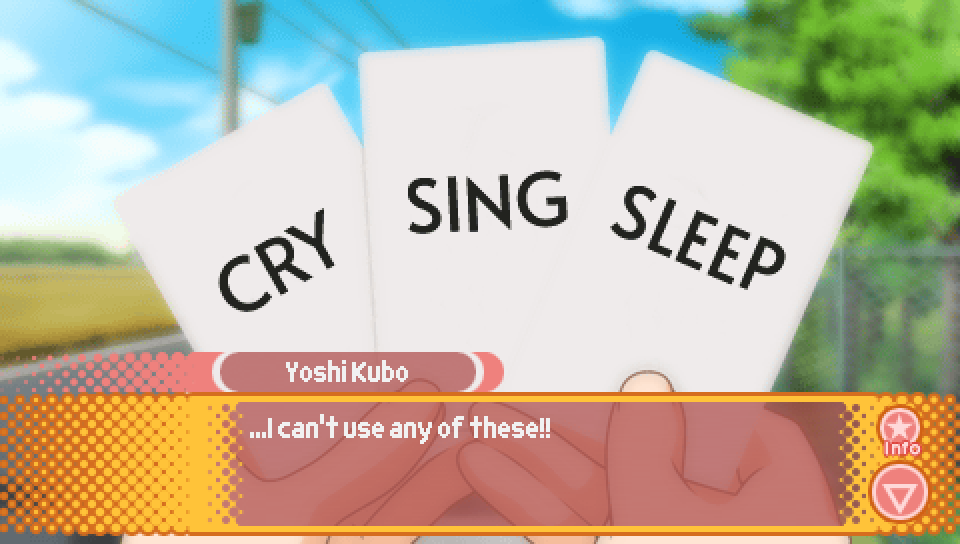
When running into Miyuki on the way to school on the first day,
the protagonist holding various cards in his hands is in reference
to a series of commercials for the credit card company "Life Card"
that involve actor Shugo Oshinari pulling out several "Life Cards"
that each offer a different option for what to do in various situations.
https://www.youtube.com/watch?v=wanJhJWgQpc
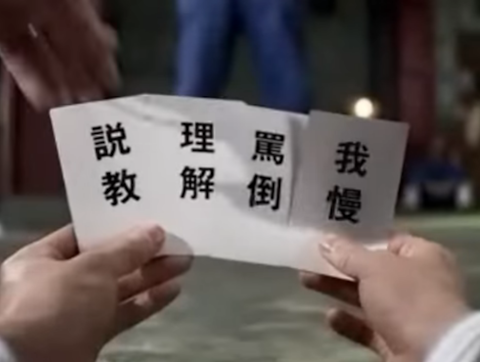
|
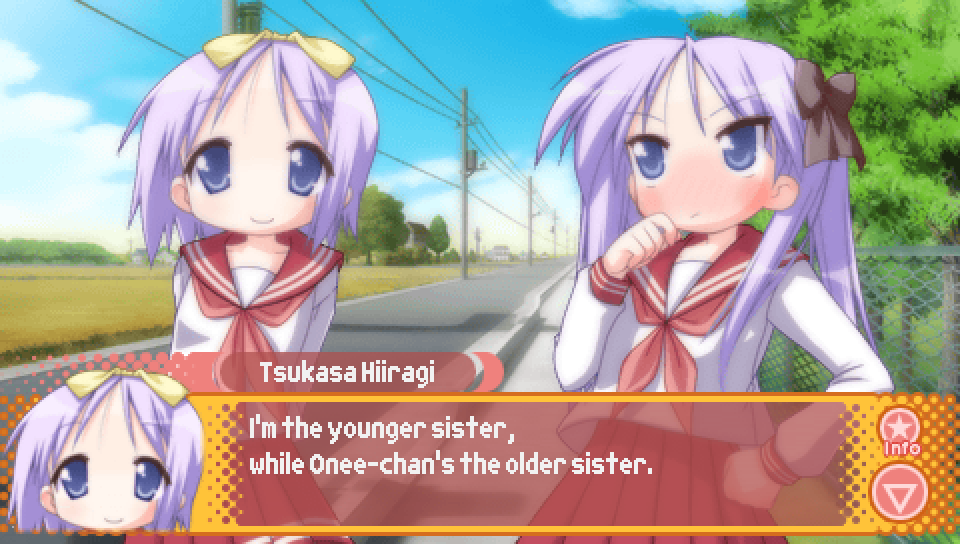
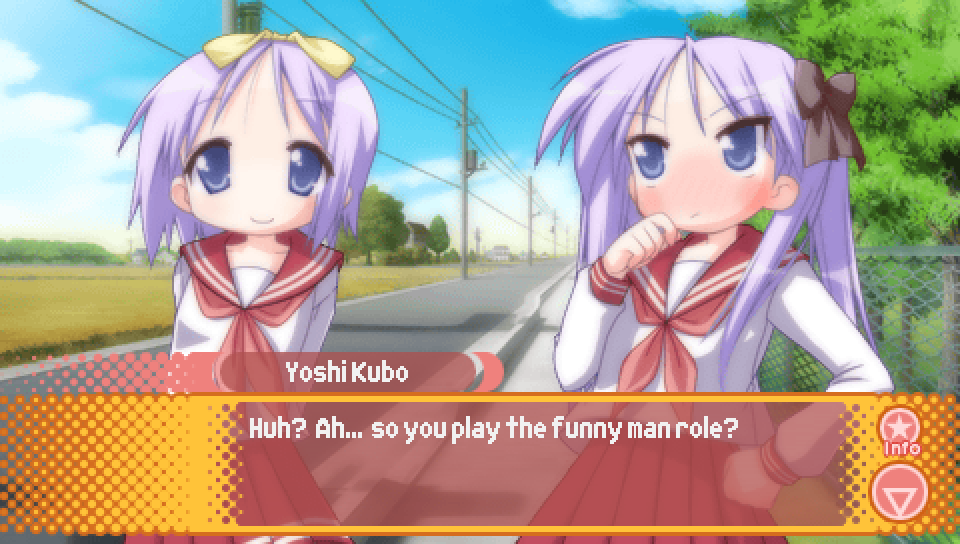
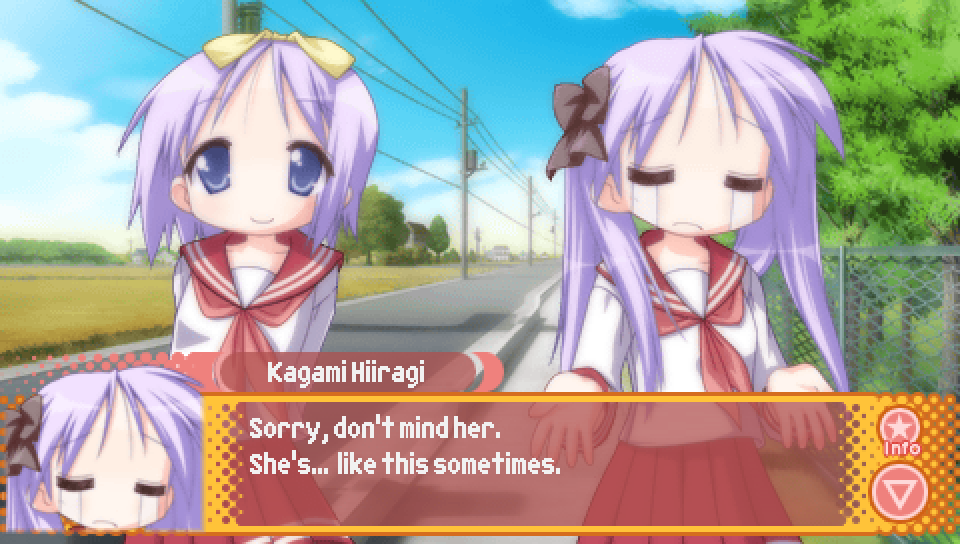
This exchange when running into the Hiiragi twins on the way to school on the first day
can be a bit confusing if you don't understand the form of Japanese comedy knows as "manzai".
In this kind of comedy routine, the humor primarily revolves around a duo consisting of
the "funny man" role, also known as the "boke", who talks and acts in a ridiculous way,
and the "straight man" role, also known as the "tsukkomi", who reacts to the funny man
with great incredulity.
Having just met the Hiiragi twins, the protagonist sees Kagami being more uptight and aggressive
and so acts like the "straight man" in a manzai duo. The protagonist then appears to view
Tsukasa's comment as being a bit dopey as it's stating the obvious and thus concludes
that she complements Kagami by playing the "funny man" role.
An example of a Japanese manzai routine: https://www.youtube.com/watch?v=Pfo0uWvKi8g
|
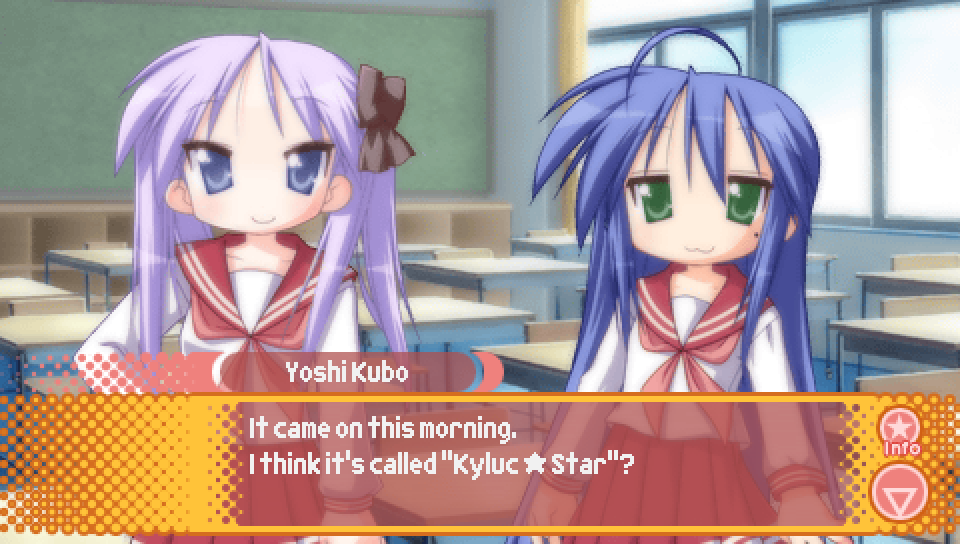
From lunch on the first day if the protagonist says he's worried about not having free time.
Obviously, this is a parody of Lucky ★ Star itself!
Though one thing that may not be as well known is that this isn't the first time
this name has been used to refer to an in-universe alternate version of the series.
It was also used in "Shin Lucky ★ Star: Moe Drill ~Tabidachi~",
the Nintendo DS game from 2007, though I translated it as "Twinkle ★ Star"
in that game as it's another way to interpret its Japanese title of "kira star".
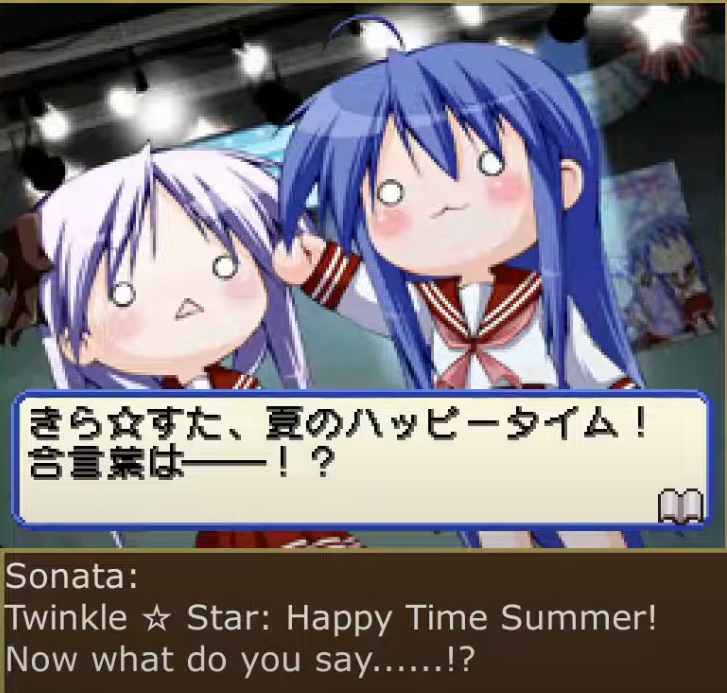
|
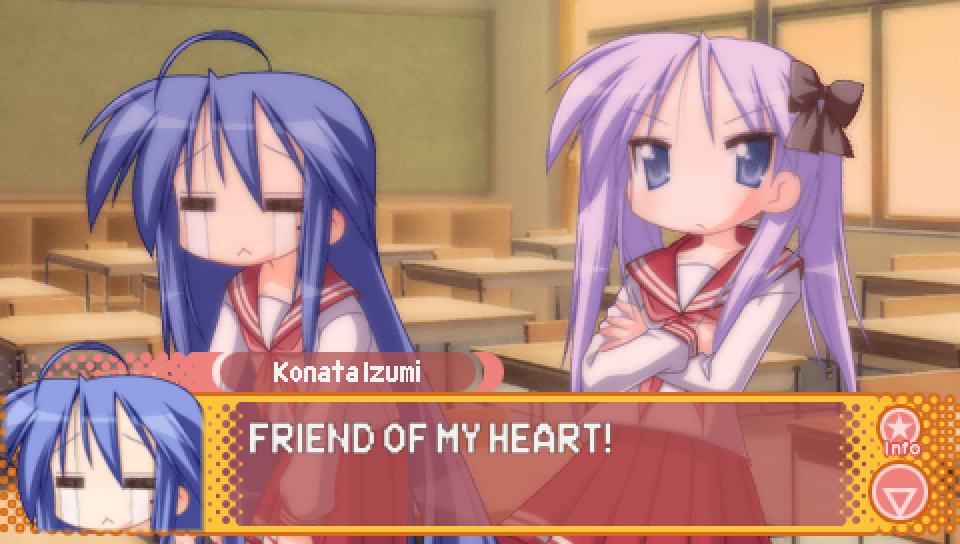
In the after school scene on the first day, if the protagonist says he is
really into maid cafes, Konata will be overjoyed and say this line.
This is actually a reference to a catchphrase said by the character Takeshi Gouda (also known as "Gian")
from the anime series "Doraemon".
A song was made based on this catchphrase, showcasing the friendship between Takeshi and Suneo Honekawa.
It can be listened to here:
https://www.youtube.com/watch?v=E8p4yHAChyg
|
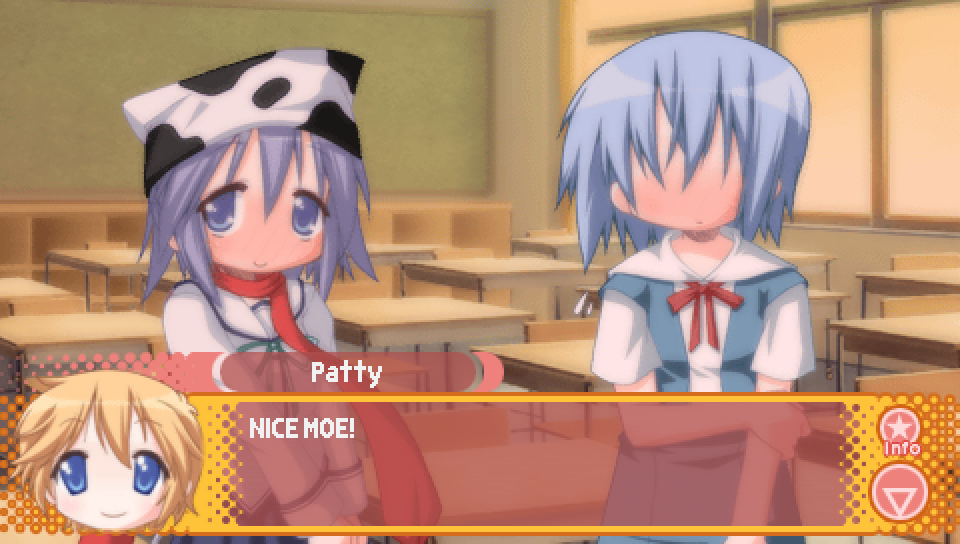
Patty's reaction to Yutaka and Minami's cosplay in the after school scene on the first day
is a reference to a famous 4chan thread, the "nice boat" thread, reacting to the airing of the final episode of the anime
"School Days" being replaced with scenic live action footage. This decision to not air the episode
was due to the at the time recent axe murder of a teenage girl by her father in Japan,
as the "School Days" episode featured a similar murder scene involving someone being killed with a knife.
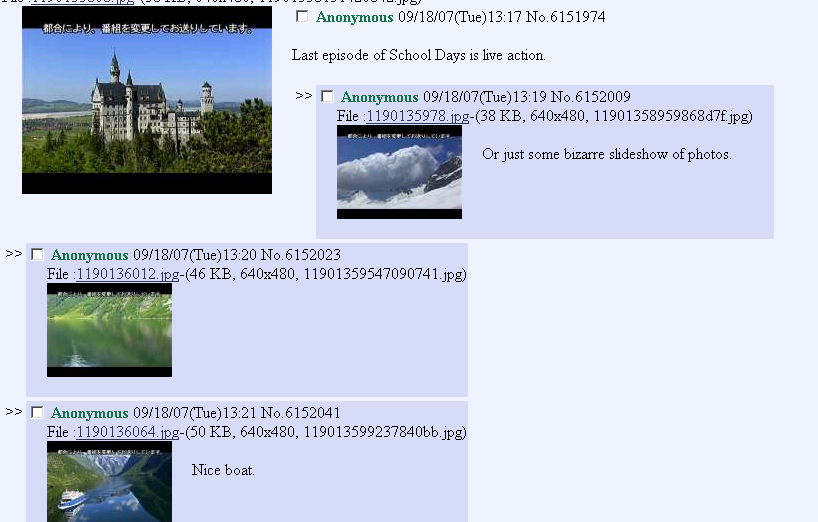
The first three minutes of this clip feature the murder scene contained within the episode that caused its delay.
WARNING -- GRAPHIC CONTENT: https://www.youtube.com/watch?v=9Gd6u8nCIW4
The footage that was aired instead. The "nice boat" appears on screen at the 45 second mark:
https://www.youtube.com/watch?v=YwortdC_o14
|
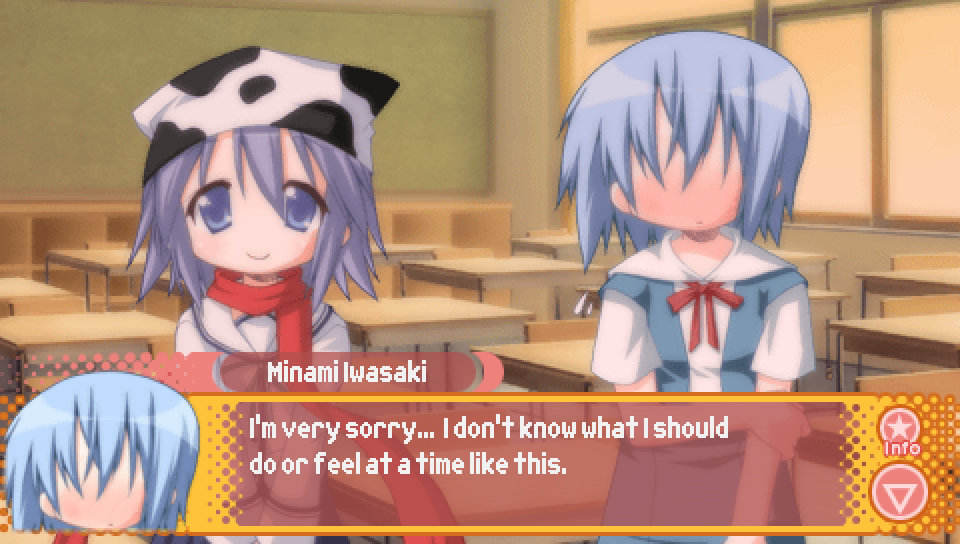
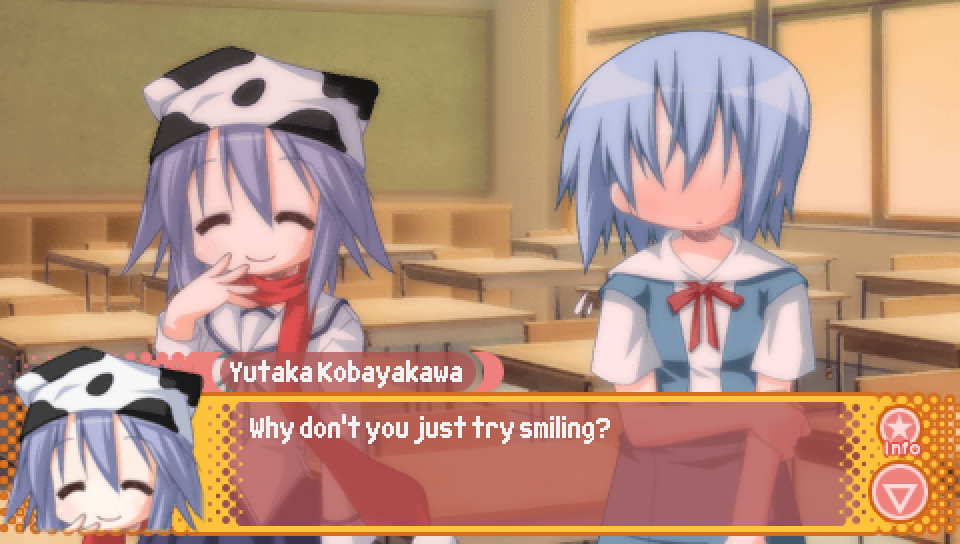
These two lines are in reference to a scene from the end of Episode 6 of "Neon Genesis Evangelion",
where Shinji, after forcing Rei's Evangelion open after it took considerable damage, finds her
unharmed. Still, he ends up crying because he was worried about her, leading to the above exchange.
The scene in question can be viewed here, though the wording differs slightly due to not being
the ADV dub of Neon Genesis Evangelion, which is what my translation of these lines are based on.
https://www.youtube.com/watch?v=CQj4_8geHd0
|
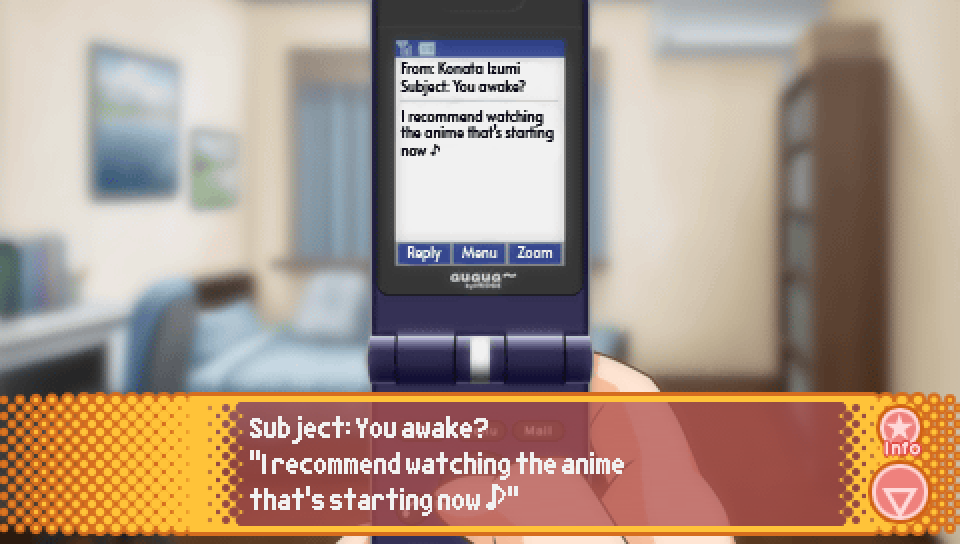
The brand of cell phone that the protagonist owns, "auaua~", is in reference to
the Japanese mobile phone carrier "au". It is also an onomatopoeia comparable to "ahhhhh" in English,
and is also sometimes used as an onomatopoeia for incoherent stuttering.

|
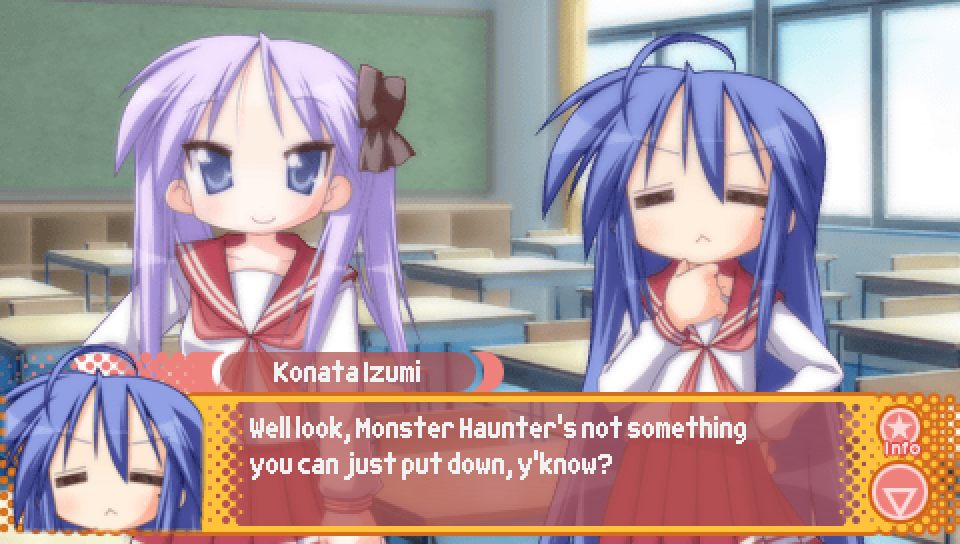
This line from Konata during lunch on the second day is in reference to the
"Monster Hunter" series of games. Konata is likely playing one of the entries for the PSP.
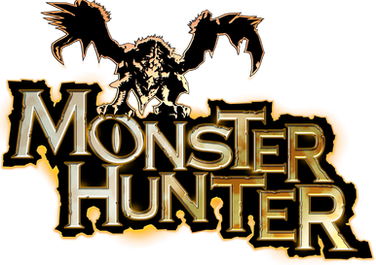
|
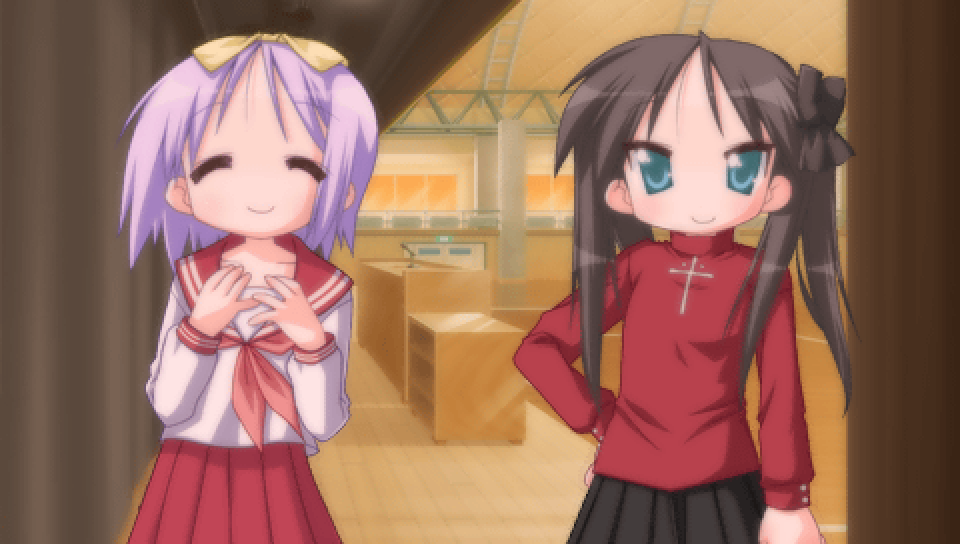
After school on the second day, during practice for the play,
it's revealed that the role Kagami is playing is that of Rin Tohsaka
from the visual novel "Fate/stay night". This is what Rin looks like.
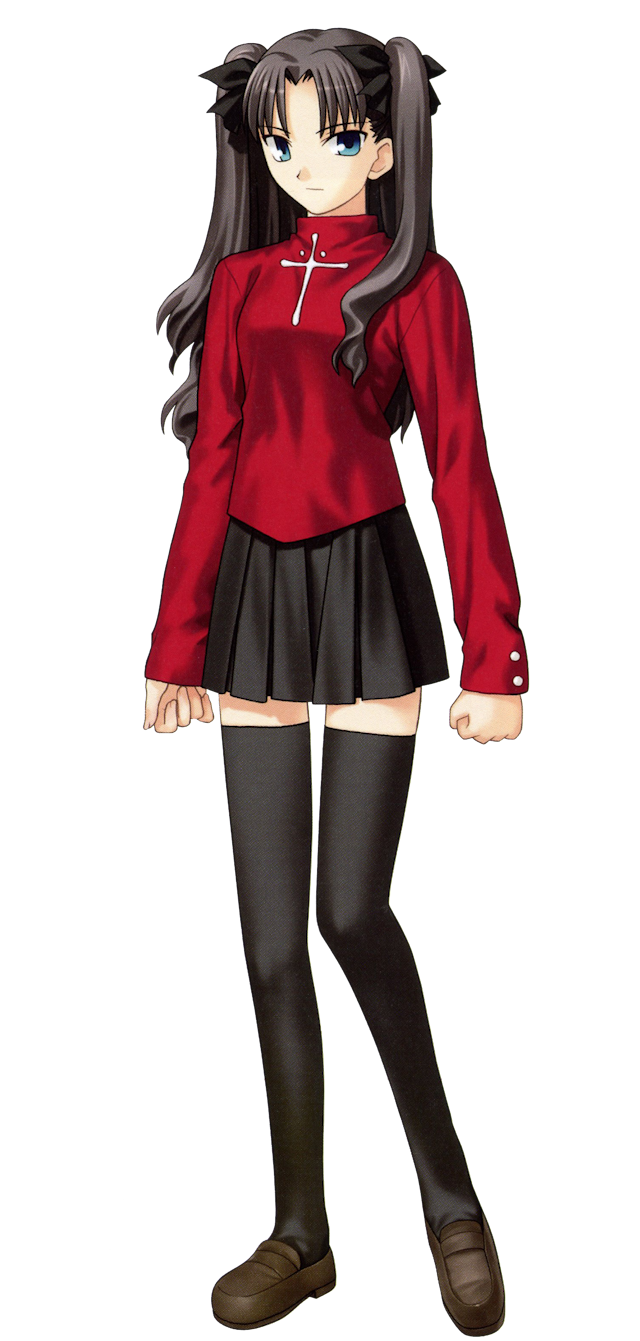
|
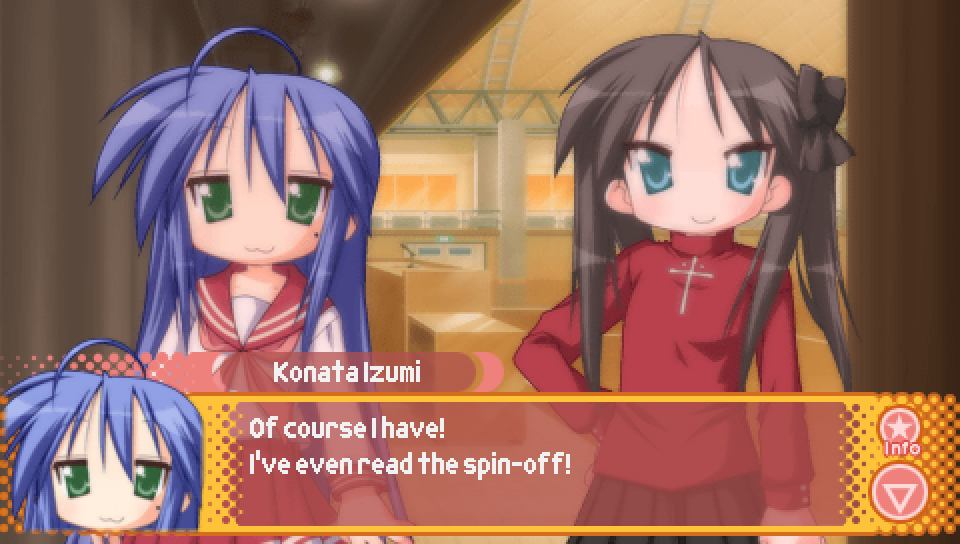
During play practice on the second day, after it's been revealed that
the script isn't done yet and Konata is asked to help, Konata mentions
having even read the spin-off of "Fate/stay night". This spin-off she is
referring to is "Fate/ZERO" a light novel that serves as a prequel to "Fate/stay night".
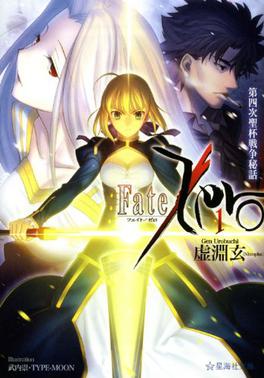
|
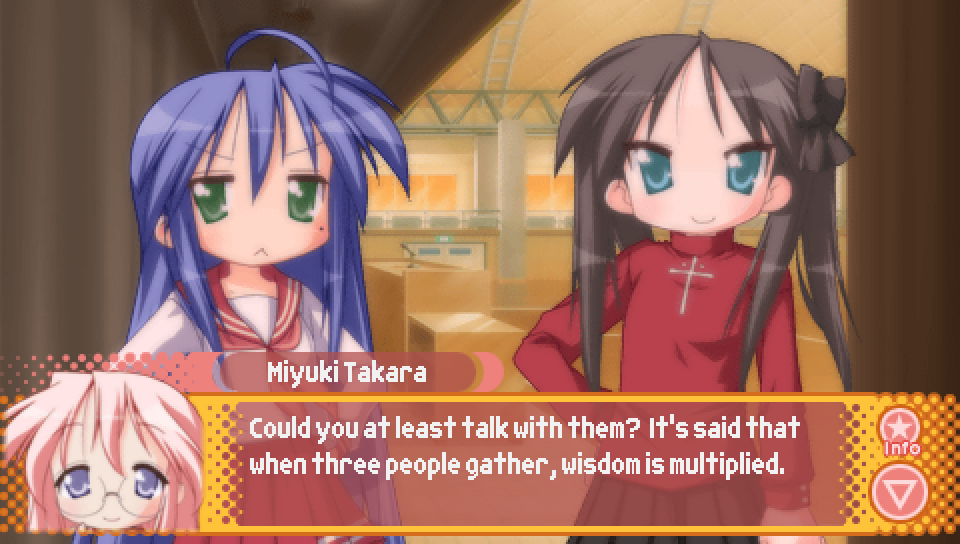
What Miyuki is saying here while trying to convince Konata to help
with finishing the script for the play is the Japanese proverb that more literally
translated means "when three people gather, the wisdom of Manjushri" and if often used
similarly to the English expression "two heads are better than one".
Manjushri is a Bodhisattva representing transcendent wisdom in Mahayana Buddhism.
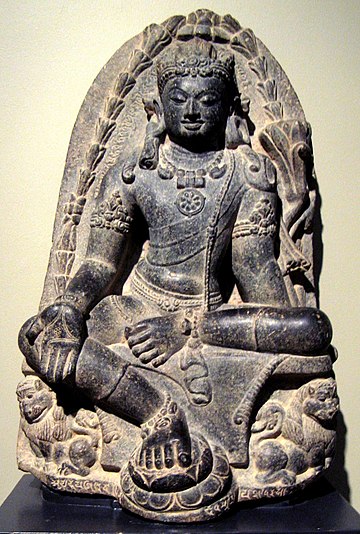
|
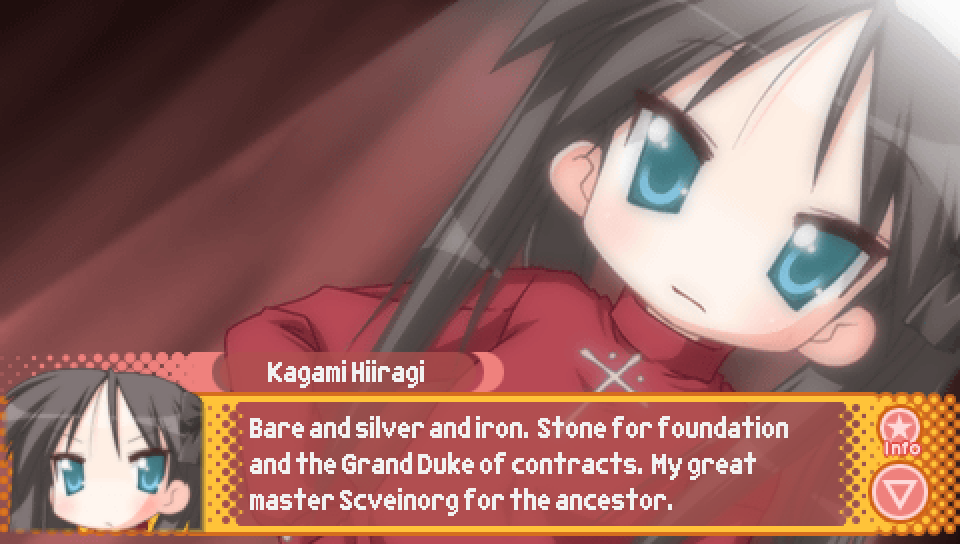
The Archer summoning ritual scene performed during practice on the second day is an abridged version
of the actual scene from "Fate/stay night". Though there are many English translations of the chant Rin says
during this scene, I have gone with the translation used for the English patch for the original release
of "Fate/stay night". Credit to Mirror Moon for using their translation.
You can watch the original scene here. It goes from 44:37 to 49:42.
https://www.youtube.com/watch?v=D-jvq32Ai_M&t=2677s
|
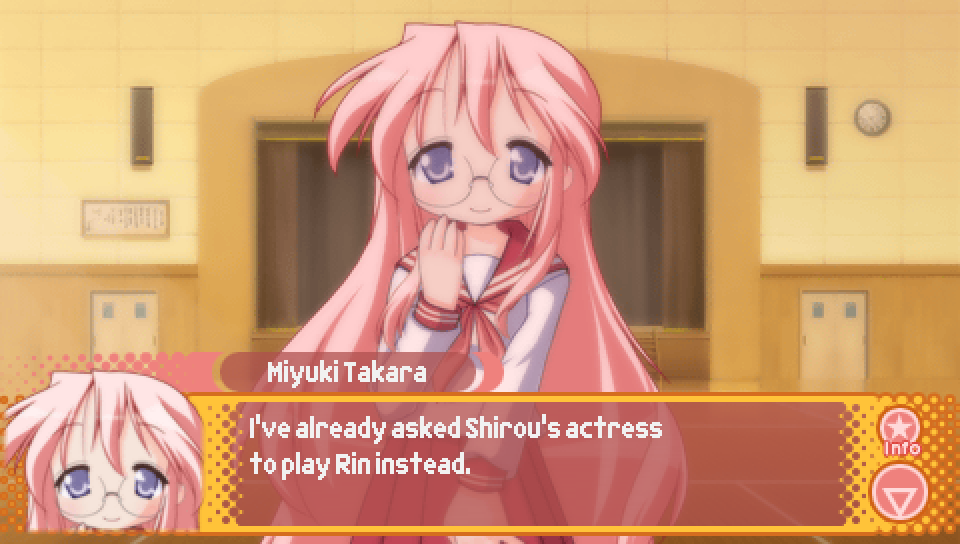
The "Shirou" being referred to as the role Miyuki is looking to fill after Kagami's injury
is Shirou Emiya, the main protagonist of "Fate/stay night".
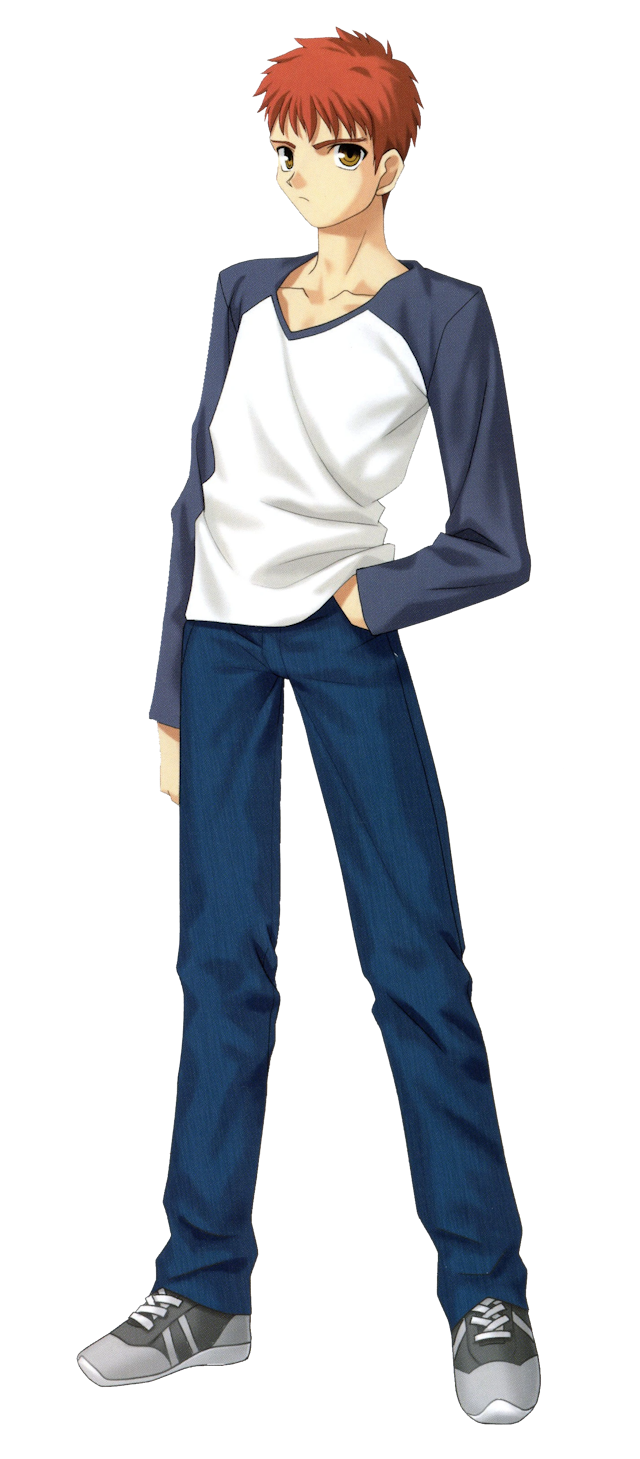
|
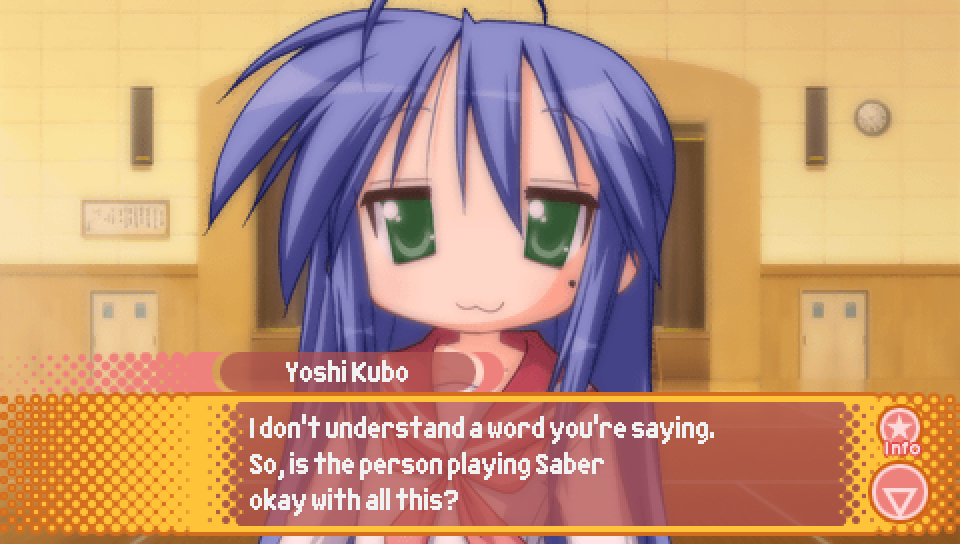
Saber is a servant of Shirou Emiya's and one of the main heroines/love interests in "Fate/stay night".
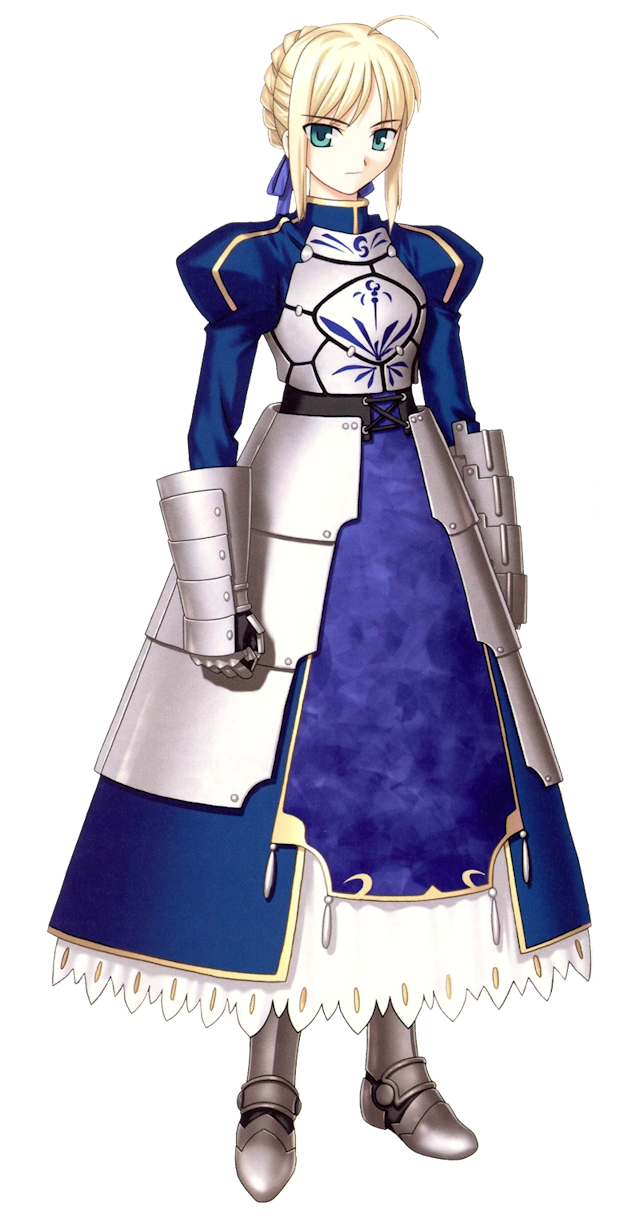
|
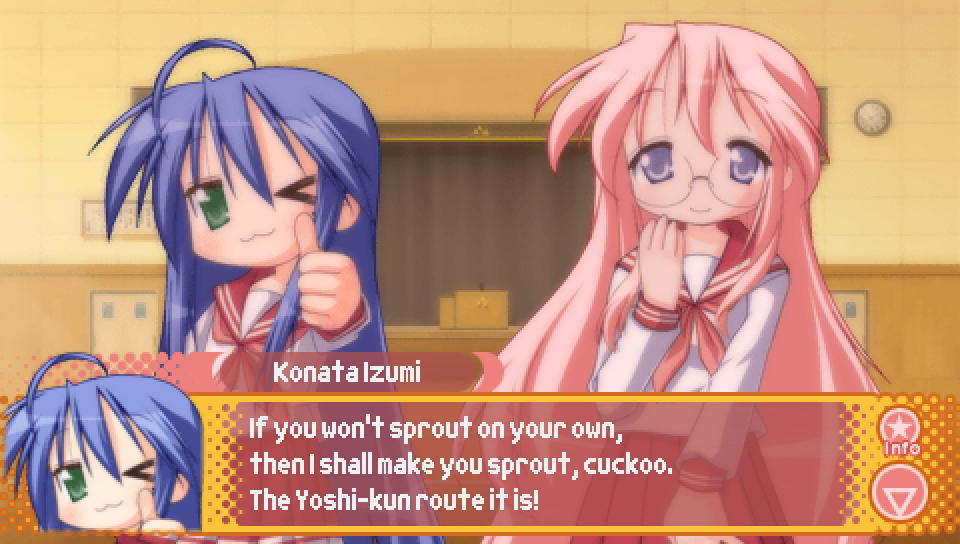
This line of Konata talking about how to get the protagonist
to be okay with doing the kiss scene for the play is in reference
to a poem taught to Japanese children about the three different approaches
taken by Japan's three great Daimyo, illustrated by three different responses
to a cuckoo not singing:
- "If the cuckoo does not sing, kill it" (Oda Nobunaga)
- "If the cuckoo does not sing, coax it" (Toyotomi Hideyoshi)
- "If the cuckoo does not sing, wait for it" (Tokugawa Ieyasu)
You can learn more here: https://blogs.transparent.com/japanese/the-three-major-daimy/
|
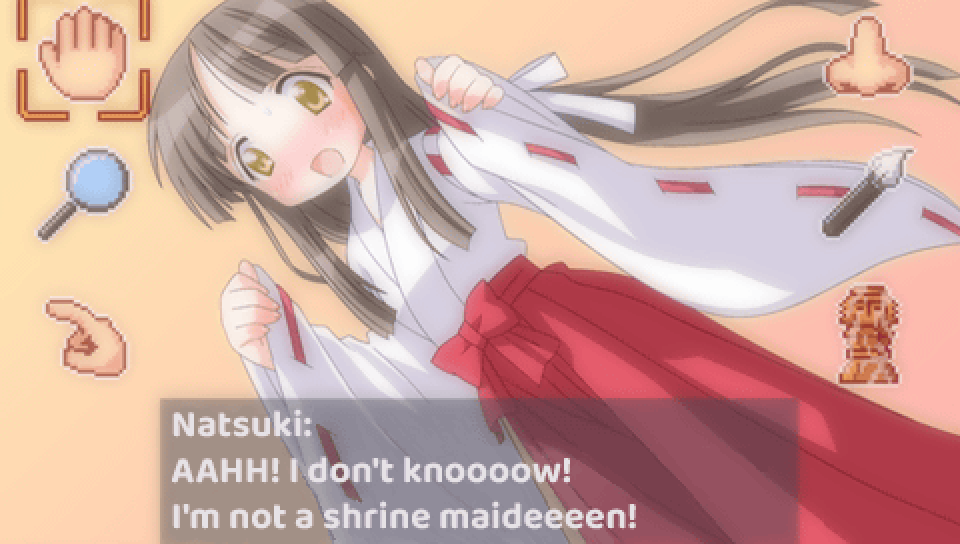
The shrine maiden themed game the protagonist plays during class on the third day
is a reference to the minigame "Lucky Lucky Shrine Altar" from Shin Lucky Star Moe Drill ~Tabidachi~.
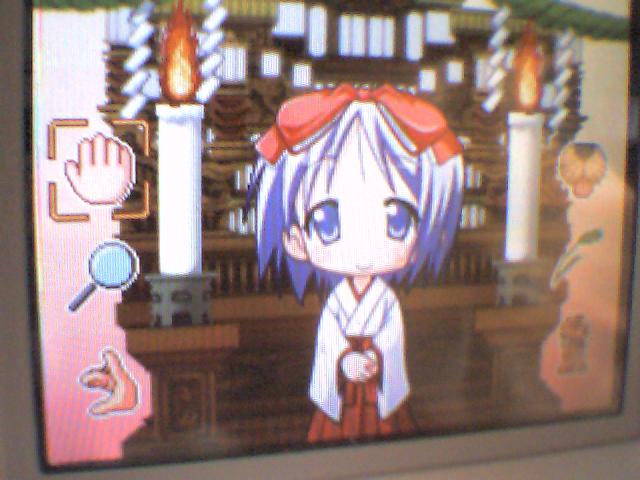
Unfortunately at this time, there is not much documented online about the specifics of this minigame
but a clip of it can be viewed here: https://www.nicovideo.jp/watch/sm527496
Additionally, the character featured, "Natsuki", is just Fuyuki Amahara with her name changed in a punny way.
Fuyuki's name can be split into "Fuyu + ki", where "fuyu" is the Japanese word for "winter".
"Natsu" is the Japanese word for "summer" so her name was changed to "Natsu + ki" = "Natsuki".
|
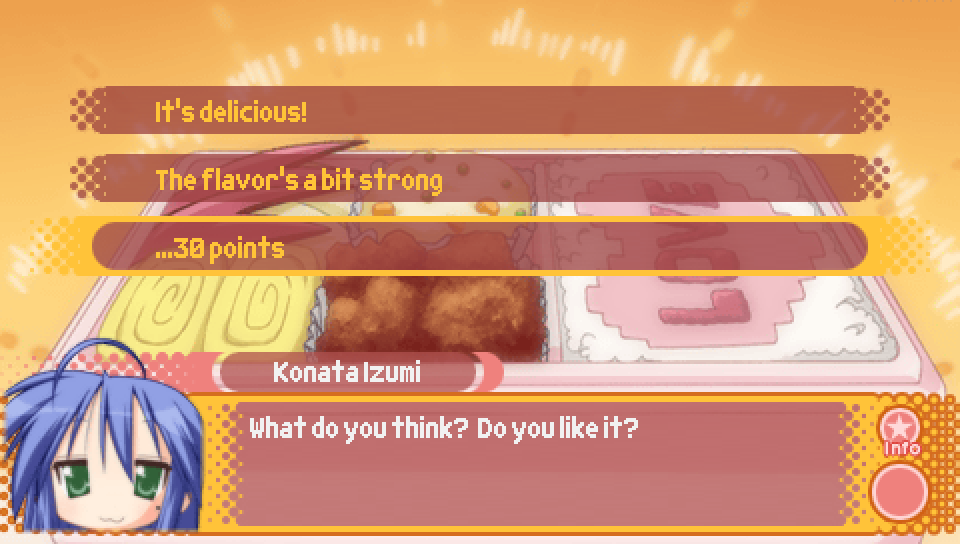
During the first lunch scene of the Konata route, the option to pick "30 points"
as an option for what the protagonist thinks of Konata's bento is a reference
to a scene from Episode 9 of the anime "Oishinbou". In it, the protagonist Shirou Yamaoka, a harsh food critic,
tries his work partner, Yuuko Kurita's, riceballs and nonchalantly gives the harsh rating
of "30 points" before walking out the door.
The scene can be viewed here: https://www.youtube.com/shorts/chjPgmggn0s
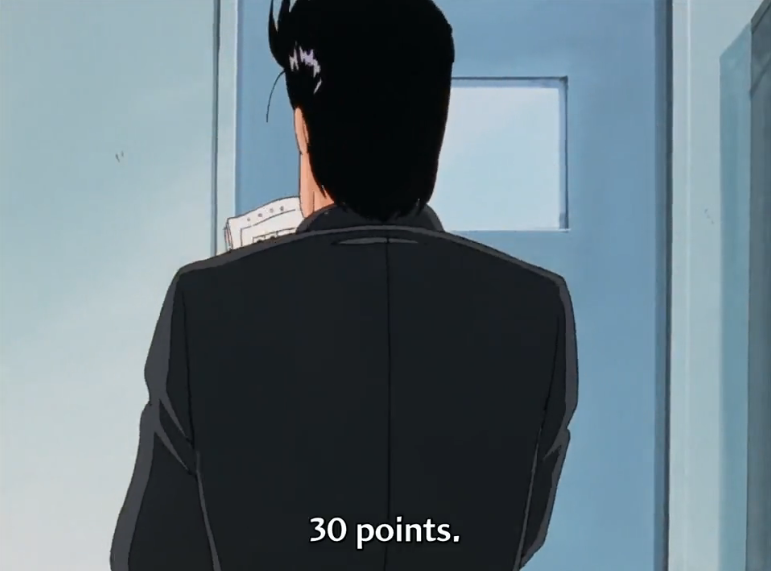
|
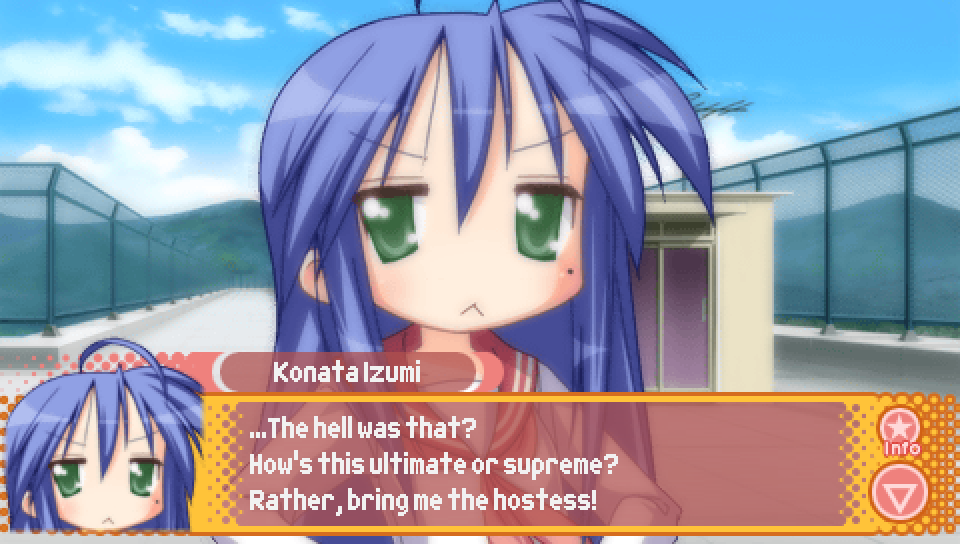
Following the choice to have the protagonist rate Konata's bento as "30 points"
are more "Oishinbou" references. When Konata asks how it's "ultimate" or "supreme",
she is referring to how the plot of "Oishinbou" revolves around Shirou Yamaoka
and his work partner, Yuuko Kurita, coming up with an "ultimate" menu of dishes
to celebrate the 100 year anniversary of the newspaper they work for.
As for "bring me the hostess", that is a line said by Shirou Yamaoka's father
and antagonist Yuuzan Kaibara in Episode 12 of the anime. Being invited out to a restaurant,
Yuuzan finds the food to be of poor quality and demands to speak to the hostess to demand
his food be made again.
The scene can be viewed here: https://www.youtube.com/shorts/9Ih_fuKuLaE
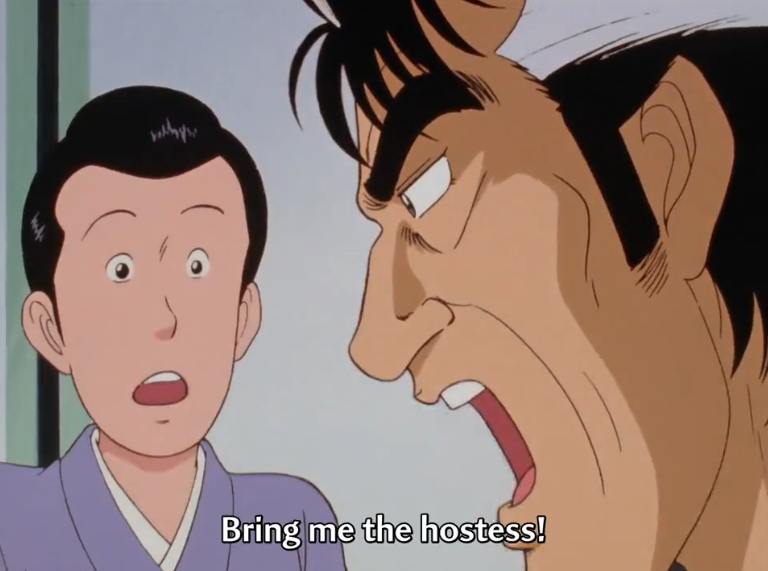
|
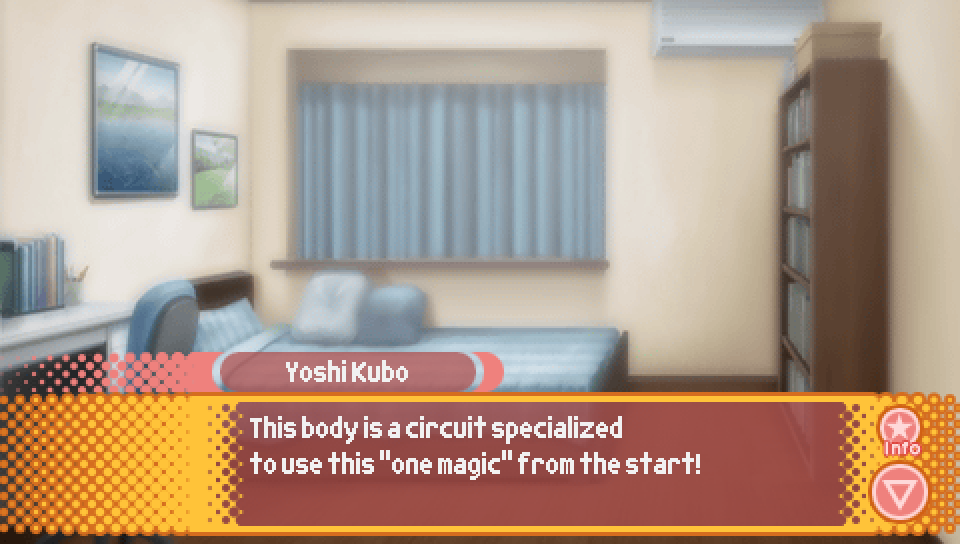
After returning home on the third day, as the protagonist is practicing his lines
for the play, the line that we see him recite is from a scene near the end of the
"Unlimited Blade Works" route of "Fate/stay night" where Shirou activates
"Unlimited Blade Works" in a face-off against the character Gilgamesh.
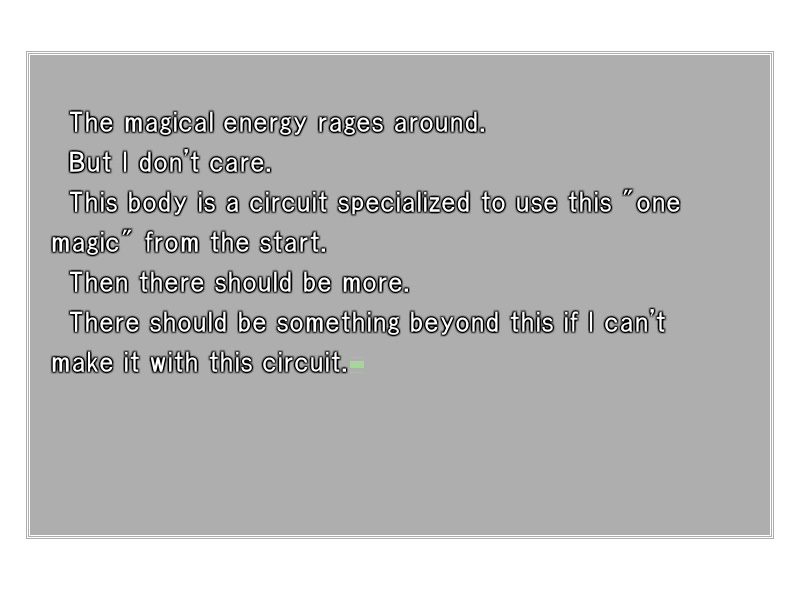
The scene can be viewed here from 58:30 to 1:02:40
https://www.youtube.com/watch?v=vXpaMlyWxfc&t=3510s
|
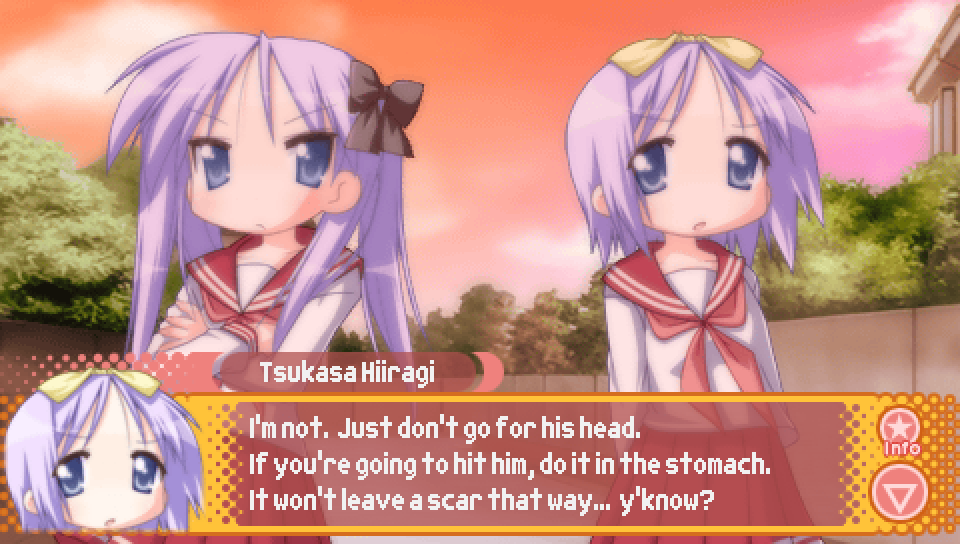
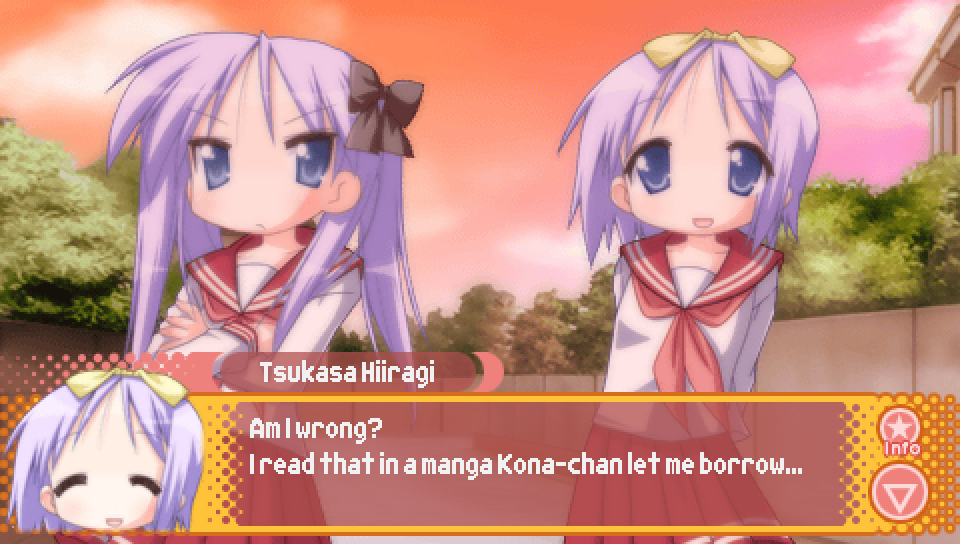
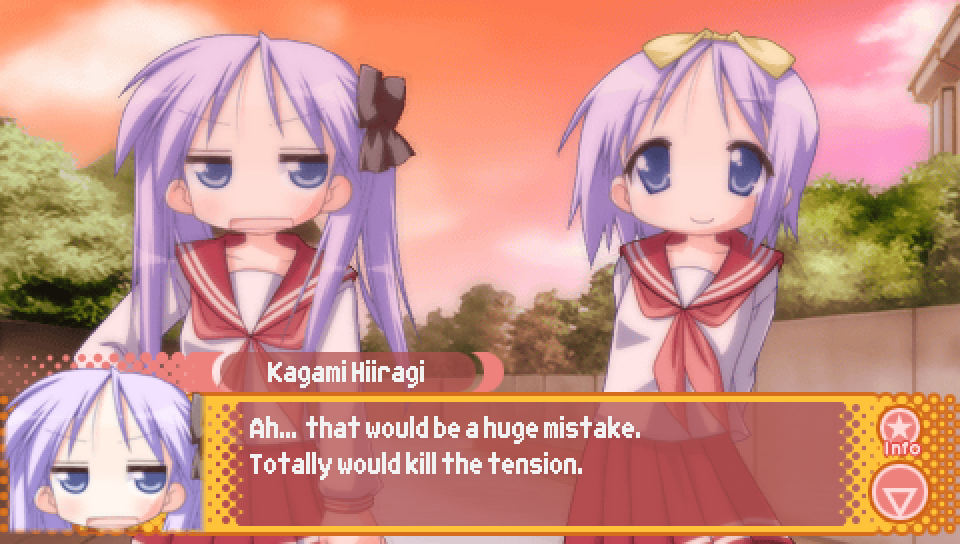
You might suspect that this exchange, taking place during the Konata route after
the protagonist upsets Konata, would be a reference to something.
However, as far as I can tell it isn't a reference to anything in particular.
With that said, punching characters in the stomach is a fairly common trope
in anime and manga fighting scenes.
As for Kagami saying it would kill the tension, this may be because
stomach punches can be seen as more comedic, though this is up to
interpretation.
|
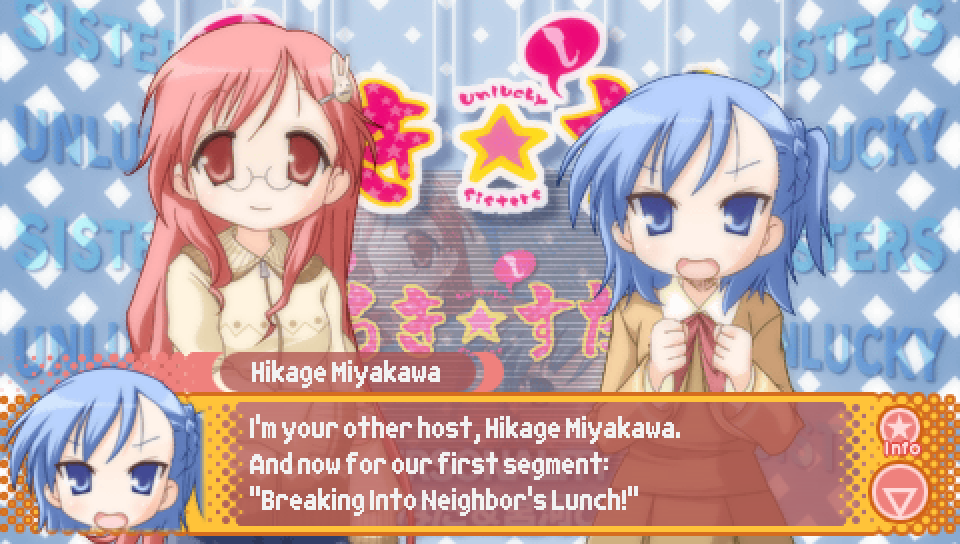
The name of this Unlucky ★ Sisters segment before the lunch scene where the protagonist makes up with Konata
is a reference to the Japanese reality TV show, "Totsugeki: Tonari no Bangohan" ("Breaking Into Neighbor's Dinner").
It's a show featuring Japanese TV personality, Yonesuke, where he will without advance notice
show up to Japanese people's houses and invite himself in for dinner and talk to the people there
about what they are eating.
A clip of an English television show trying this same premise, taking inspiration
from "Tonari no Bangohan": https://www.youtube.com/watch?v=QSv0oJh3qIM
An episode of "Tonari no Bangohan": https://www.youtube.com/watch?v=LEm-8n5gaa4
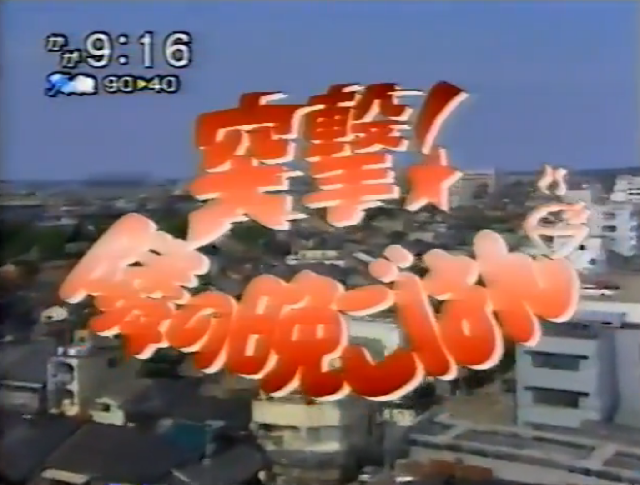
|
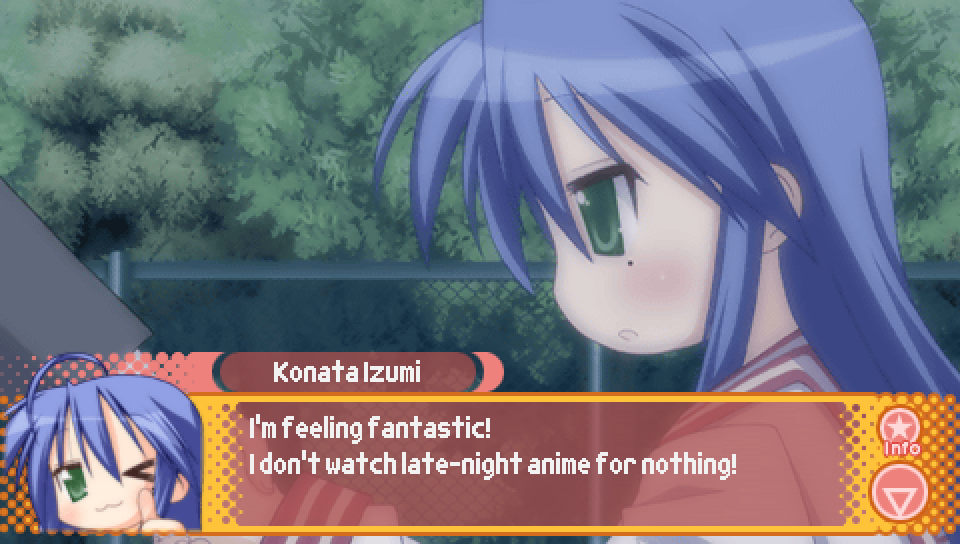
On the night before the school festival on the Konata route,
this line from Konata is in reference to a line said by the protagonist
of the series "YuYu Hakusho" during the next episode previews in the Japanese version
of the anime series. He would end off these segments with
"the other world isn't watching for nothing!".
Listen to the last line said in this clip and compare it with Konata's voice line:
https://www.youtube.com/watch?v=enbMoV4TOvU
|
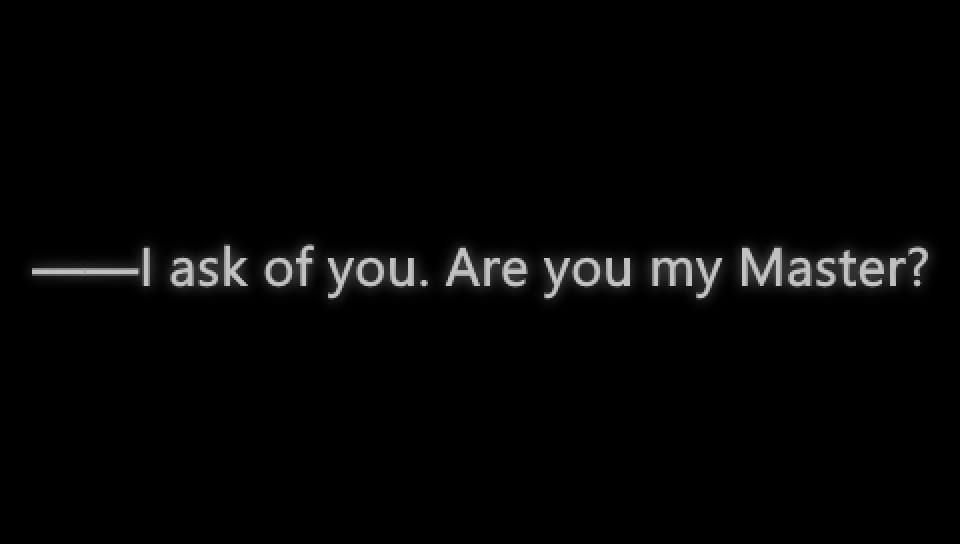
During the "Fate/stay night" play on the day of the school festival,
this line is from the beginning of the "Fate/stay night" visual novel
and is Saber's opening line.
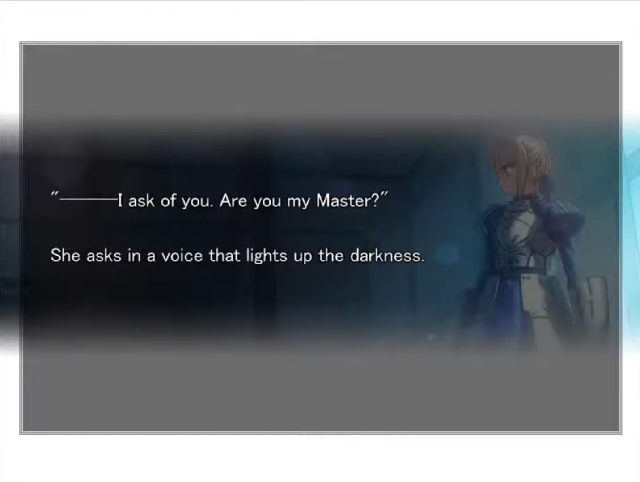
It can be seen here at 0:37:
https://www.youtube.com/watch?v=D-jvq32Ai_M
|
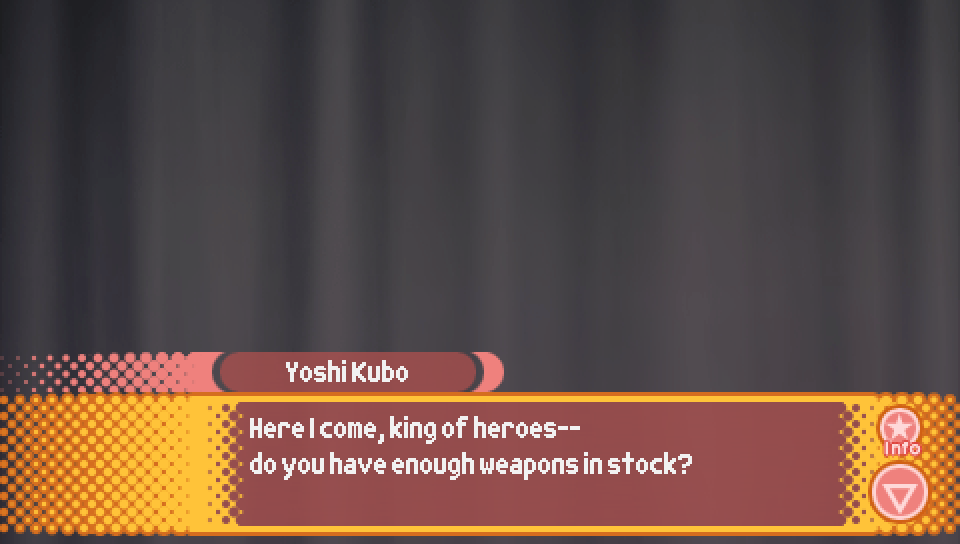
During the "Fate/stay night" play on the day of the school festival,
this line takes place within the same scene that we see the protagonist practicing
earlier in this Episode. In the fight against Gilgamesh, after Shirou activates
"Unlimited Blade Works".
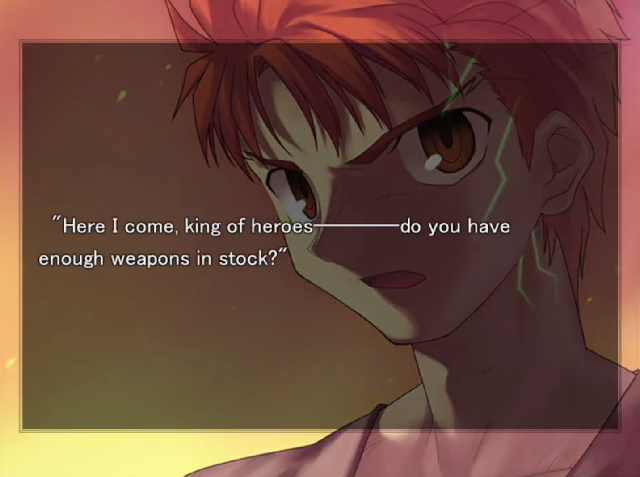
The scene can be viewed here from 1:02:40 to 1:04:20
https://www.youtube.com/watch?v=vXpaMlyWxfc&t=3760s
|
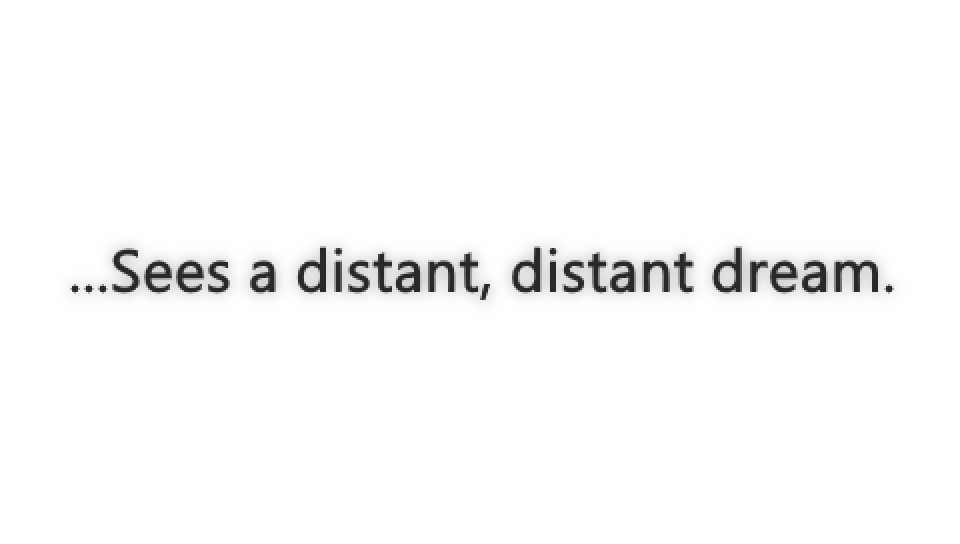
During the "Fate/stay night" play on the day of the school festival,
provided you did not get the good ending for the Konata route, this is how
the play will end. It's the final line of the Fate route as Saber, now as
King Arthur, passes away.
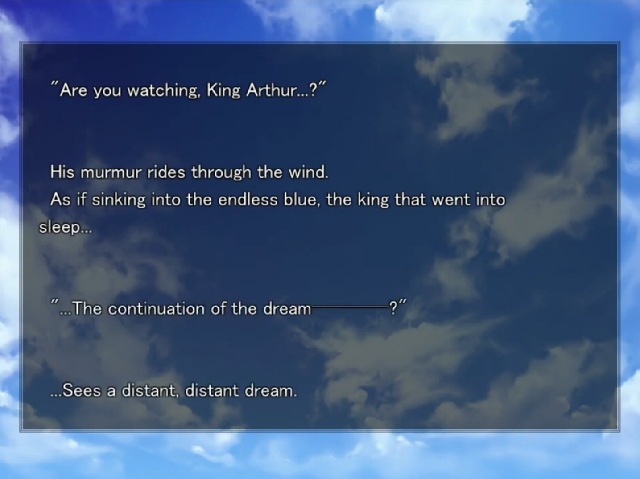
The scene can be viewed here from 3:57:48 to 4:00:10
https://www.youtube.com/watch?v=lJp9cSF2ekg&t=14268
|
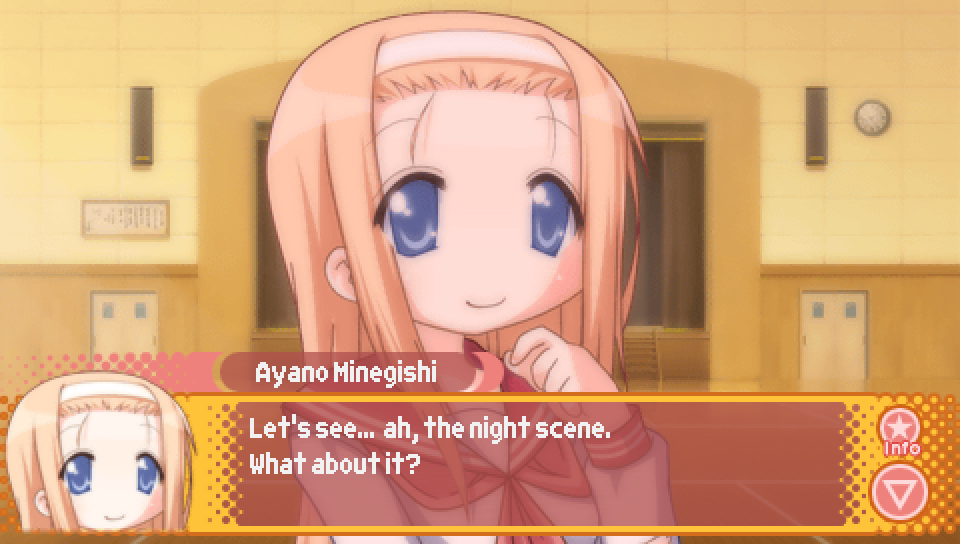
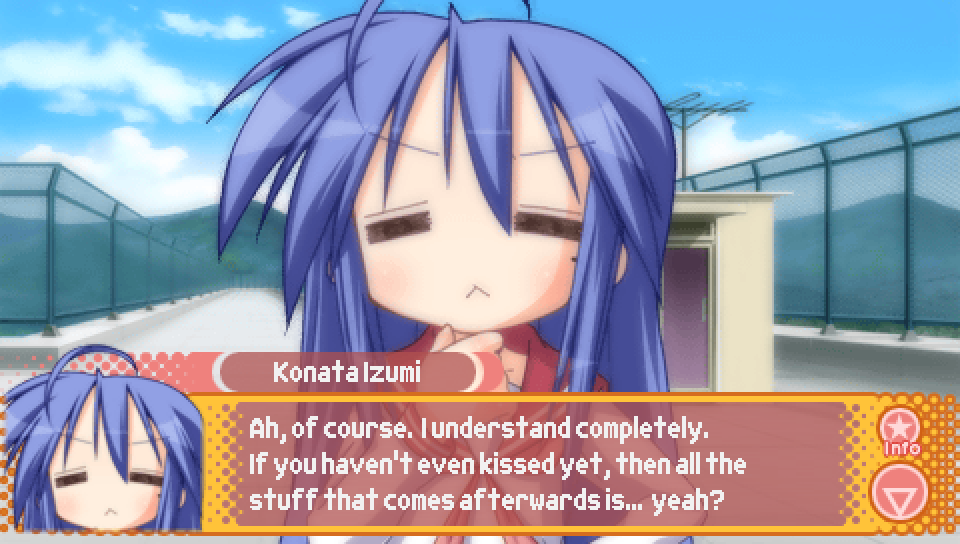
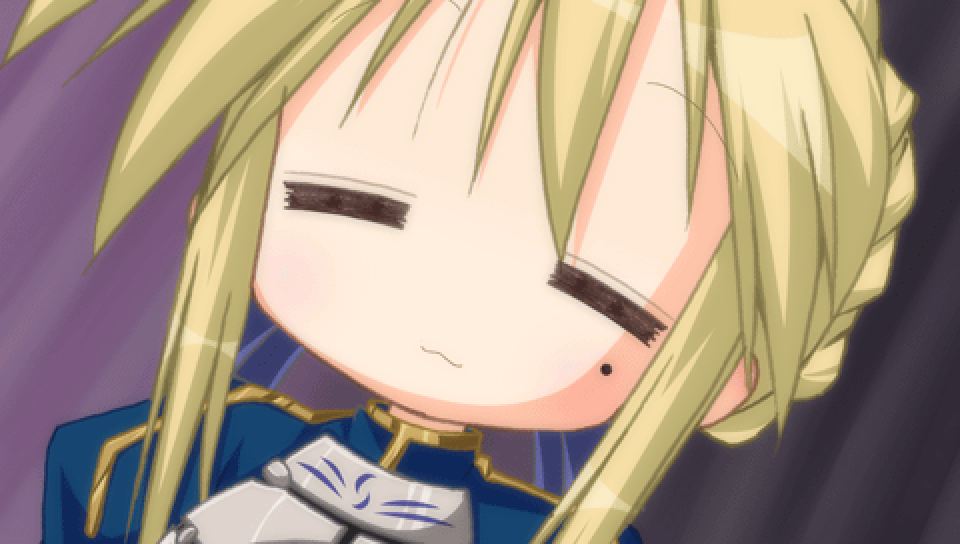
This gets a bit into speculation territory, but you may recall
that earlier in the Episode, the kiss scene of the "Fate/stay night"
play is referred to as "the night scene", which does not seem to line up
very well with the scenes from Fate that inspire the moments leading into
the kiss as seen in the play. Furthermore, there is no kiss in either scene
of the original source material.
This may be because the kiss scene may actually be its own separate scene
and may be an adaptation of the fact that the original release of
"Fate/stay night" has sex scenes (not linked here due to its NSFW nature),
which do indeed take place at night.
The kiss then serves as an age-appropriate way of representing the initation
of the sex, of which the rest of the scene is obviously only implied but not shown.
With that said, it doesn't seem that the kiss scene is an adaptation of any specific
sex scene within Fate.
This interpretation helps to explain the above lines, but it is possible
I could be wrong and the kiss is meant to be nothing more than an addition
to the ending scenes from Fate mentioned above.
|
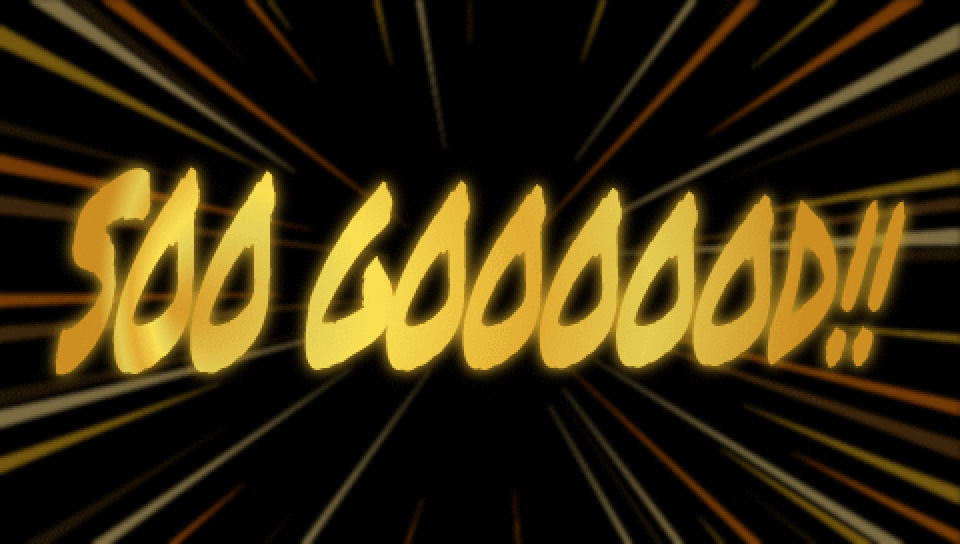
During the lunch scene unique to the Tsukasa route, the protagonist's
intense reaction to eating "Konata's" bento is in reference to the intense
reactions shown by the character Genjirou Murata from the series "Mister Ajikko"
when he eats something delicious. These reactions are usually accompanied by his famous
explosive shout of "UMAIZOOOOOOO!!" (translated to "SOO GOOOOOD!!" but literally just means "DELICIOUS!!").
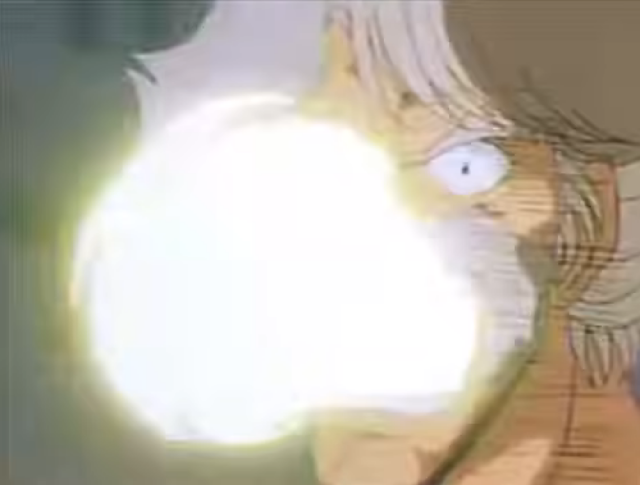
A MAD that showcases many of Genjirou Murata's intense reactions:
https://www.youtube.com/watch?v=cdE56dYmPpc
|
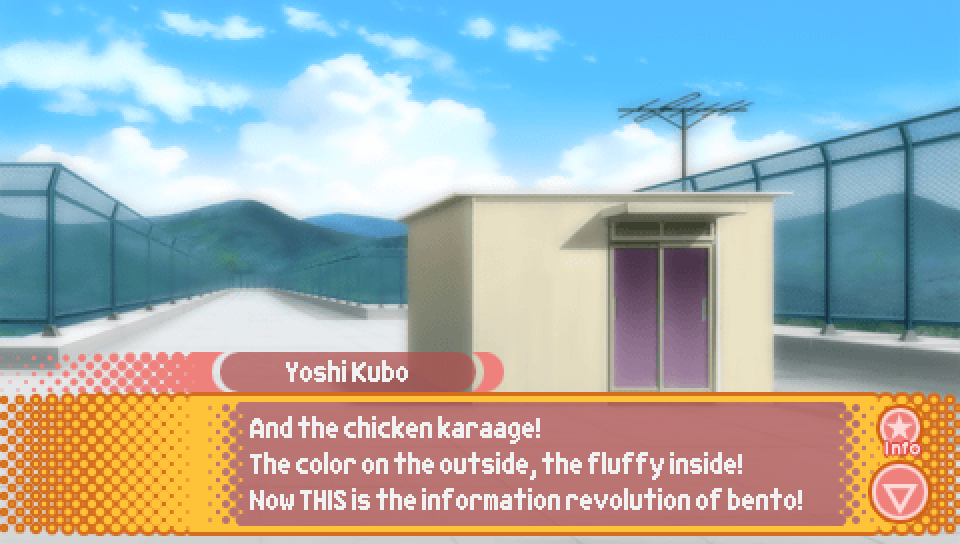
During the lunch scene unique to the Tsukasa route, as the protagonist
is raving about how good "Konata's" bento is, he makes what would seem
like a really strange compliment about it being the "information revolution of bento".
However, this is just in reference to a famous line by the Japanese comedian Hikomaro:
"the information revolution of taste!".
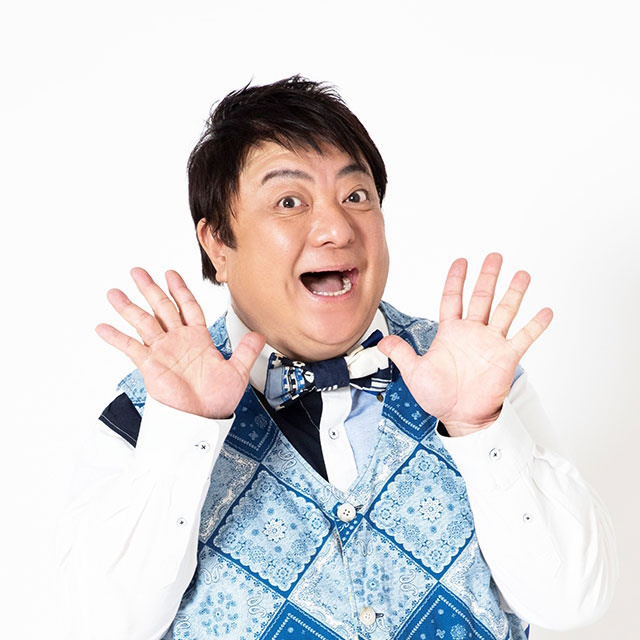
Specific information on the context behind this line is hard to come by, but it has
been referenced in various other media, such as Episode 86 of Gintama.
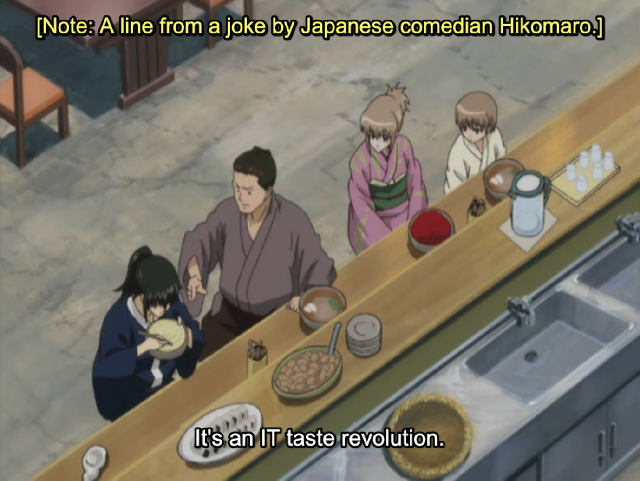
|
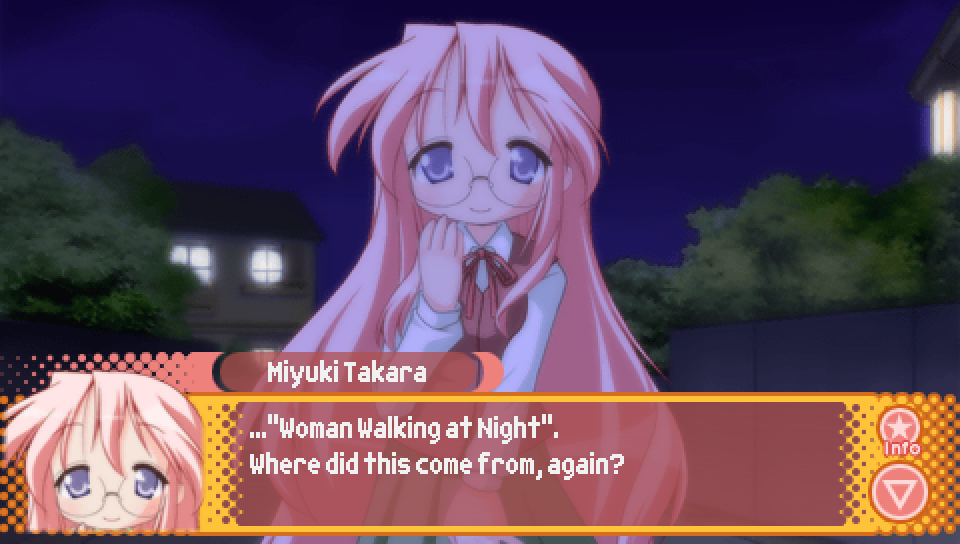
In Miyuki's mini scenario, the book that Miyuki was reading
when she fell asleep on the train, "Woman Walking at Night",
is a real book written by author Seishi Yokomizo, published in 1948.
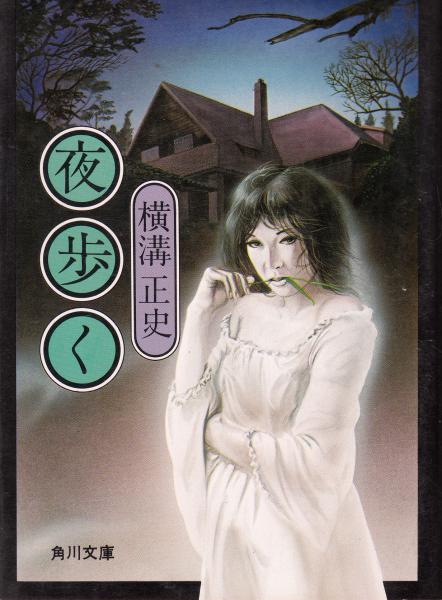
|
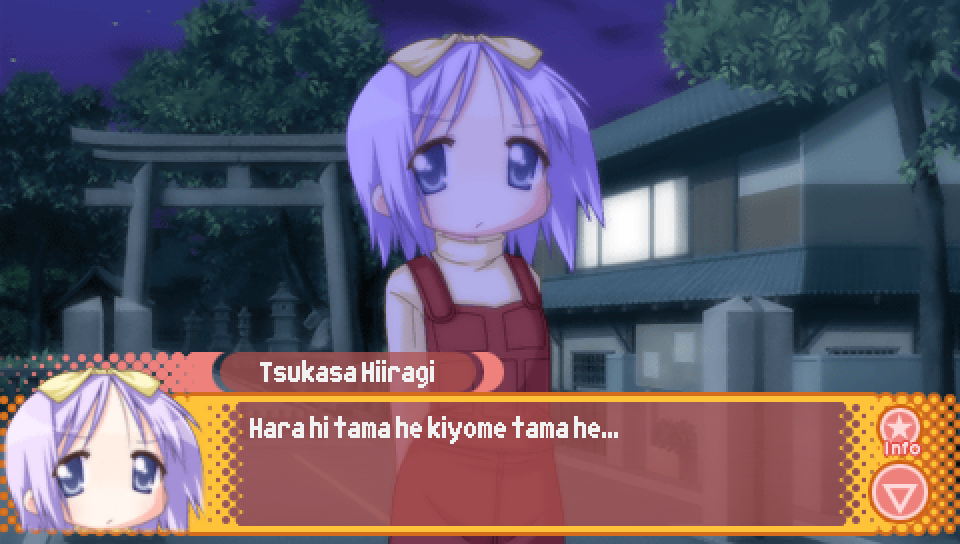
In Miyuki's mini scenario, the prayer that Tsukasa recites is a real Shinto incantation
known as the "Amatsu Norito", which means "Prayer of Heaven".
|
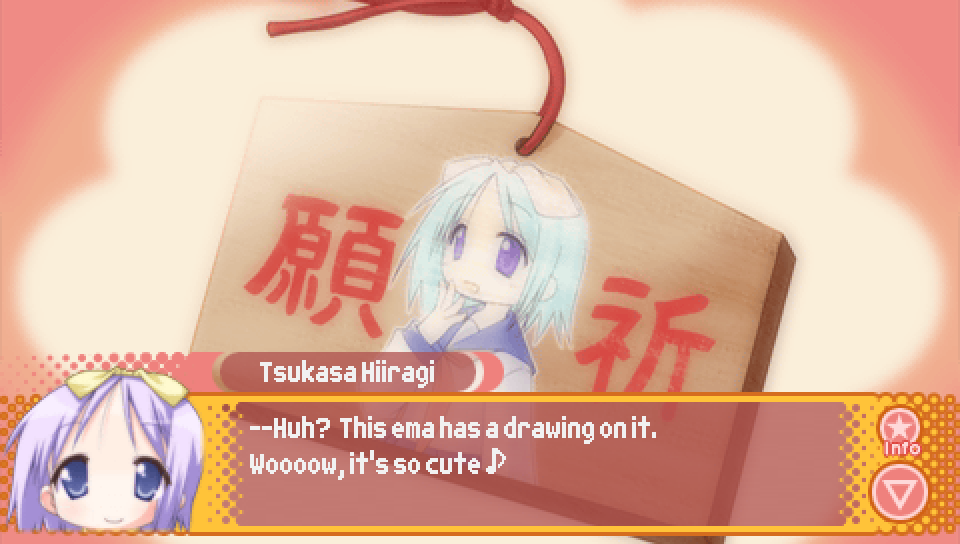
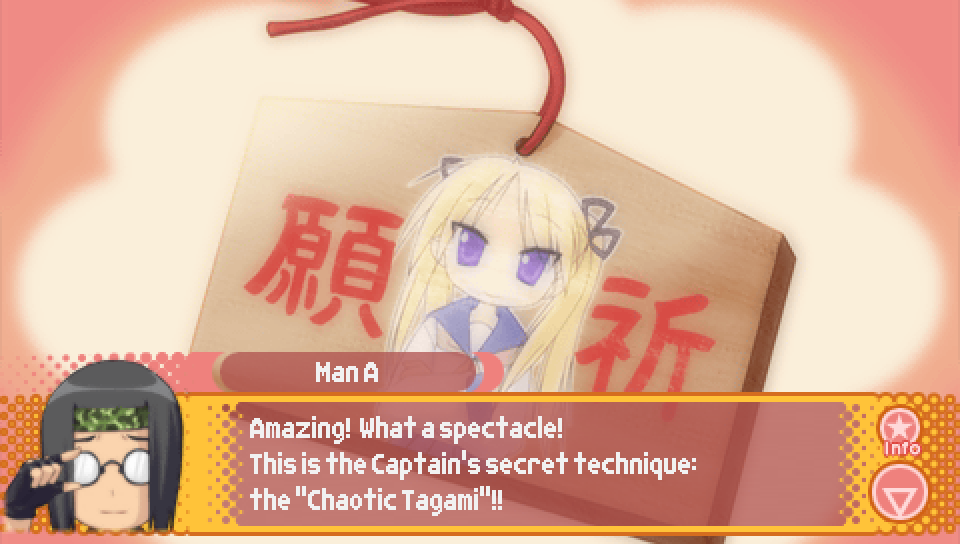
Seen in Tsukasa's mini scenario, ema are small wooden plaques on which prayers
or requests are written and then hung up at Shinto shrines.
The word "ema" means "wooden horse" as these plaques are an evolution of horses
historically being donated to shrines.
The kanji characters written on the ema above are 願, which is the kanji meaning
"request" and 祈, which is the kanji meaning "prayer".
In otaku culture, it's common to draw pictures of anime characters on ema,
with Washinomiya Shrine, the real life shrine off which the Hiiragi's
Takanomiya Shrine is based, being no exception. These kinds of ema
are affectionately known as "ita ema" (literally "painful ema").
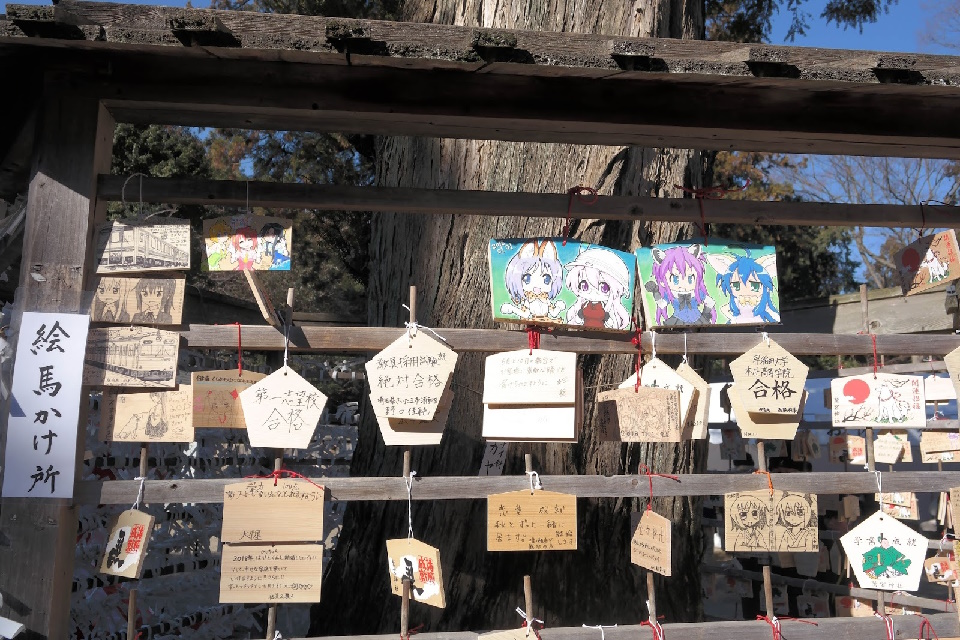
Various ema hung up at Washinomiya Shrine, including both ita ema and some more standard ema.
|
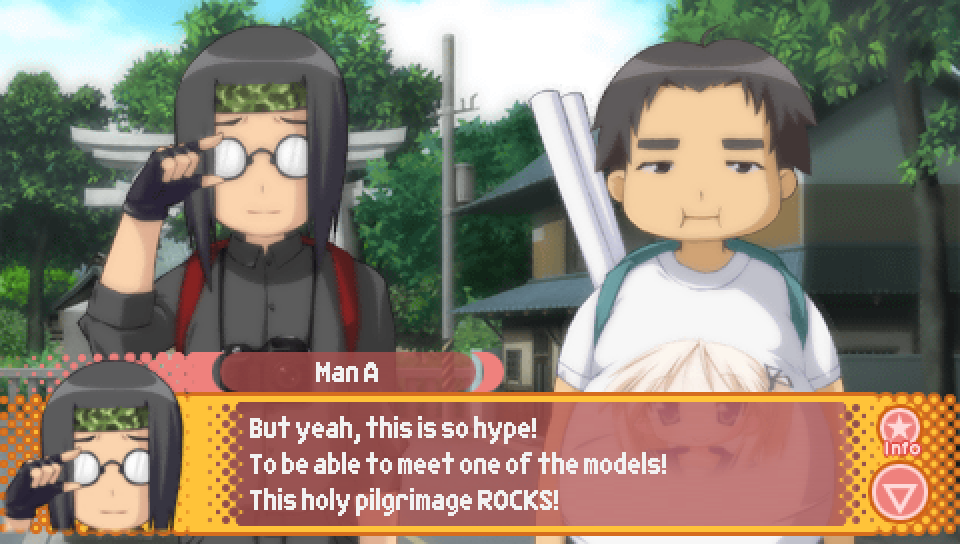
Seen in Tsukasa's mini scenario, these otaku visiting Takanomiya Shrine
are in reference to how many fans of Lucky Star regularly visit the real life
Washinomiya Shrine that Takanomiya Shrine is based on due to their love for the series.
Visiting the real life places featured in anime and manga are affectionately
compared to religious pilgrimages, with these locations jokingly referred to as sacred grounds.
|
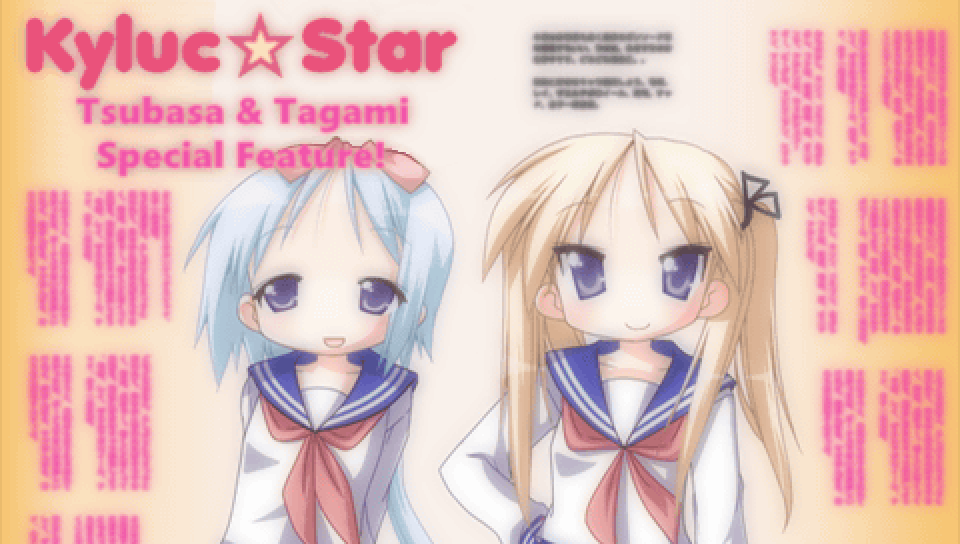
As mentioned above, the in-universe show the otaku from the Tsukasa mini scenario
are fans of is not "Lucky Star", but an alternate version known as "Kyluc Star".
Interestingly, notice that "Tsubasa" is not entirely a re-color of Tsukasa
as she has a long ponytail that Tsukasa does not have.
|
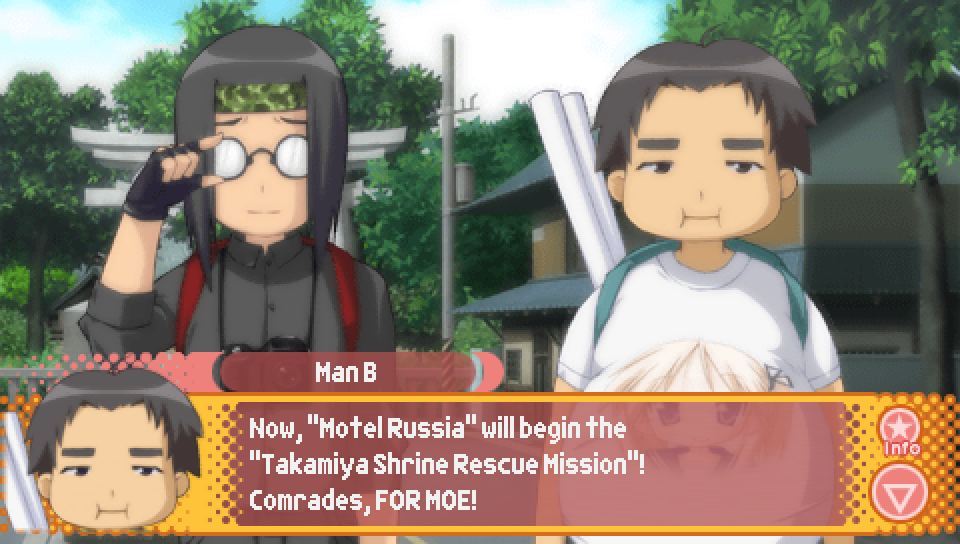
The "Motel Russia" group the otaku from the Tsukasa mini scenario are a part of
is a parody of "Hotel Moscow", a crime syndicate featured in the "Black Lagoon" series.
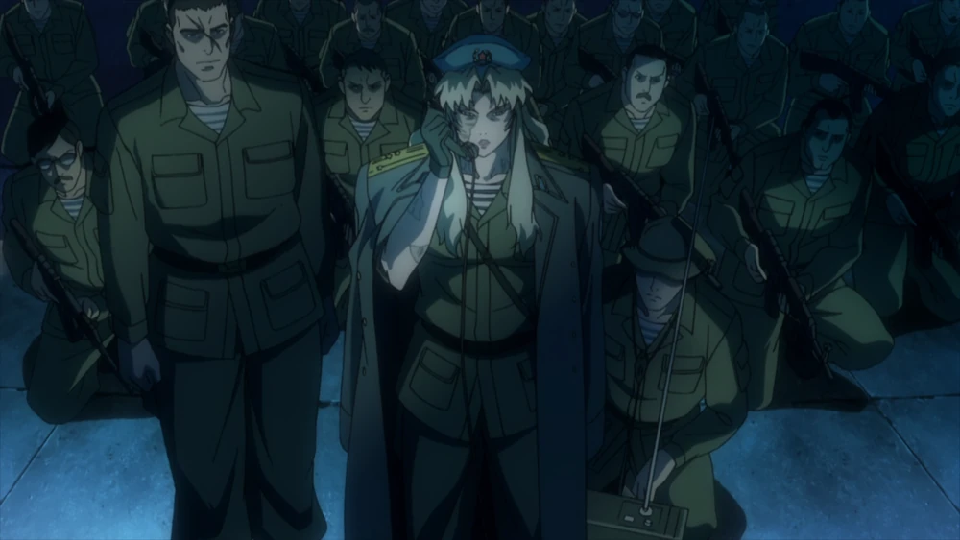
|
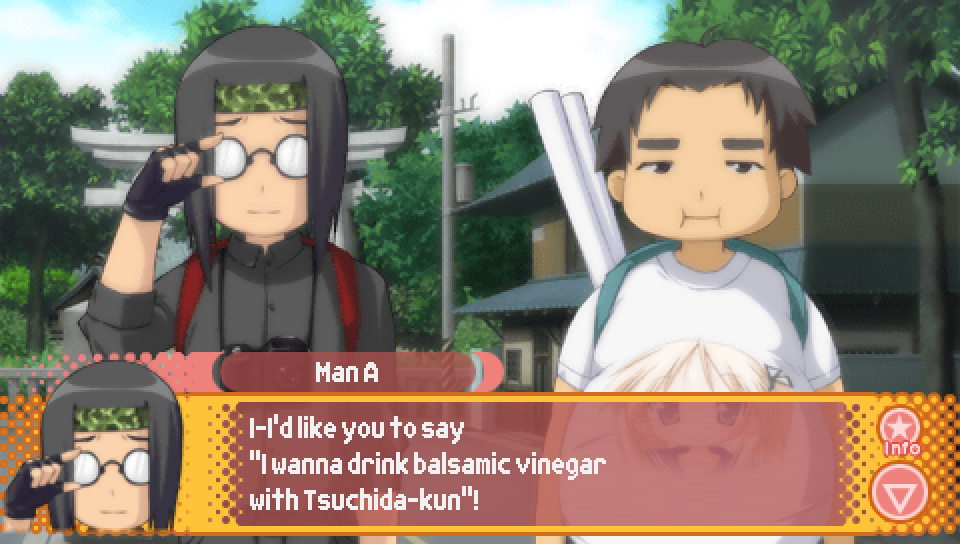
This otaku's request in the Tsukasa mini scenario is of course
in reference to balsamic vinegar becoming a popular catchphrase
associated with Tsukasa due to the Lucky Star anime.
https://www.youtube.com/watch?v=_-Lb0JoIqms
Though Lucky Star: Ryouou Gakuen Outousai was developed largely independently of the Lucky Star anime,
the above scene from the anime managed to gain popularity so quickly that it was able to make
its way into the game, as seen with MADs such as this, releasing months before
Ryouou Gakuen Outousai's original release date:
https://www.nicovideo.jp/watch/sm679403
|
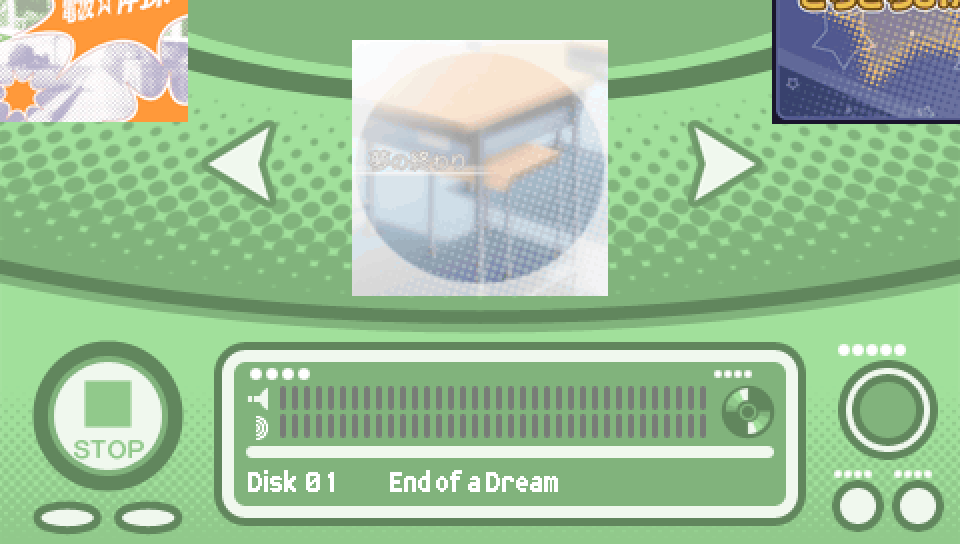
The song "End of a Dream" from the game's soundtrack is likely in reference
to the song of the same name from "Fate/stay night" and is the song that plays
during the "Realta Nua" ending talked about above.
https://www.youtube.com/watch?v=jIgvZIPepUU
|
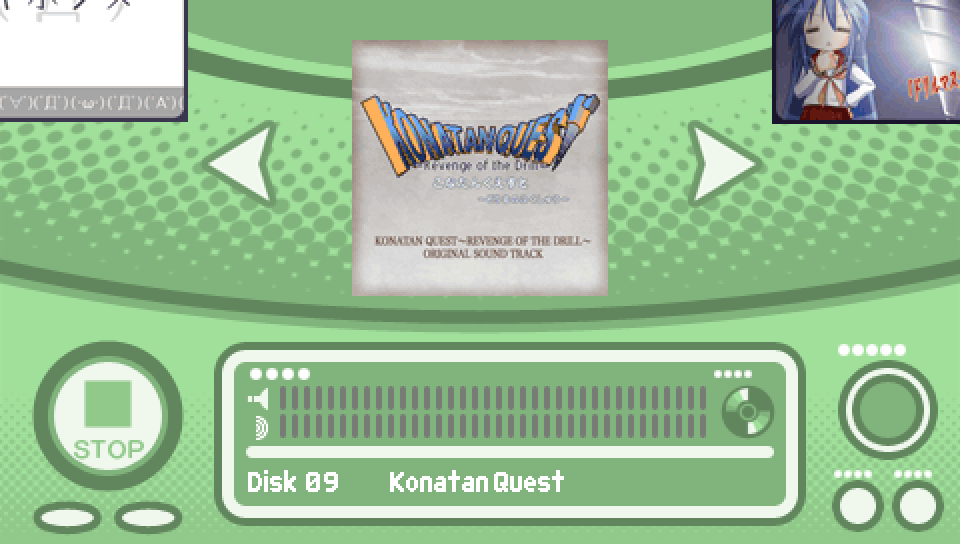
The song "Konatan Quest" from the game's soundtrack is in reference
to the "Dragon Quest" video game series. This can even be seen in the album art,
which parodies the "Dragon Quest" logo.

|
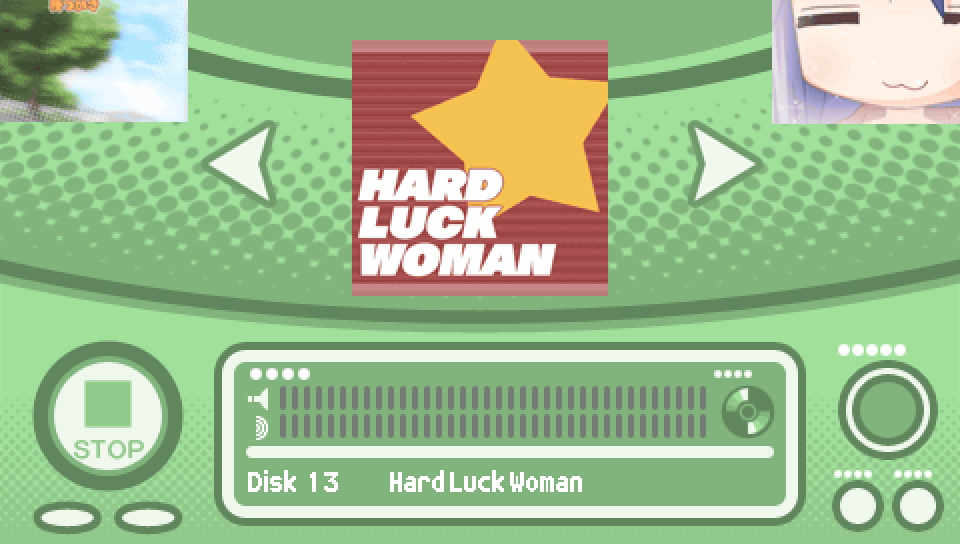
The song "Hard Luck Woman" from the game's soundtrack is possibly in reference
to the 1976 song of the same name by American rock band "Kiss".
It's also the name of the 24th episode (or "session") of the anime "Cowboy Bebop".
https://www.youtube.com/watch?v=yEioRXSgdsk
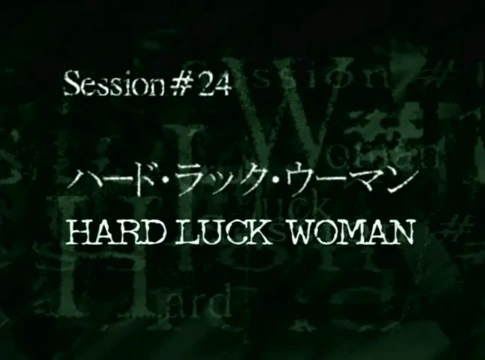
|
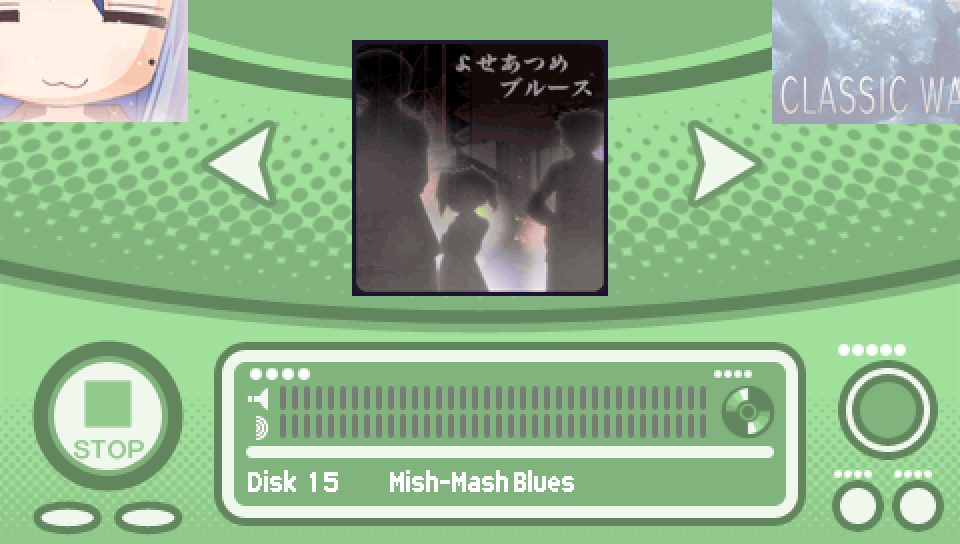
The song "Mish-Mash Blues" from the game's soundtrack is in reference
to the 13th episode (or "session") of the anime "Cowboy Bebop" which has the same name.
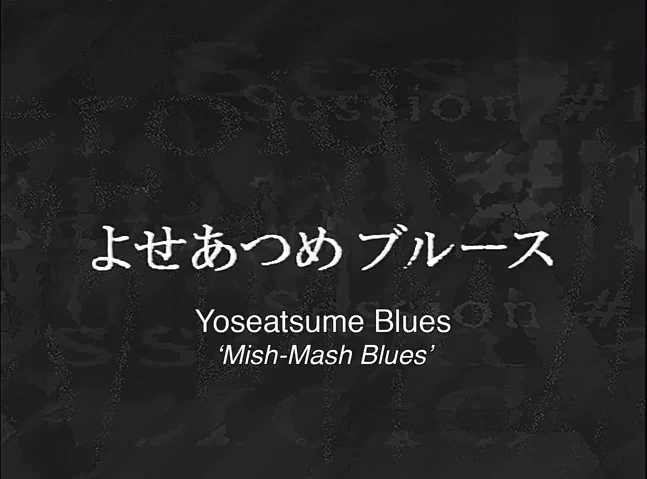
|
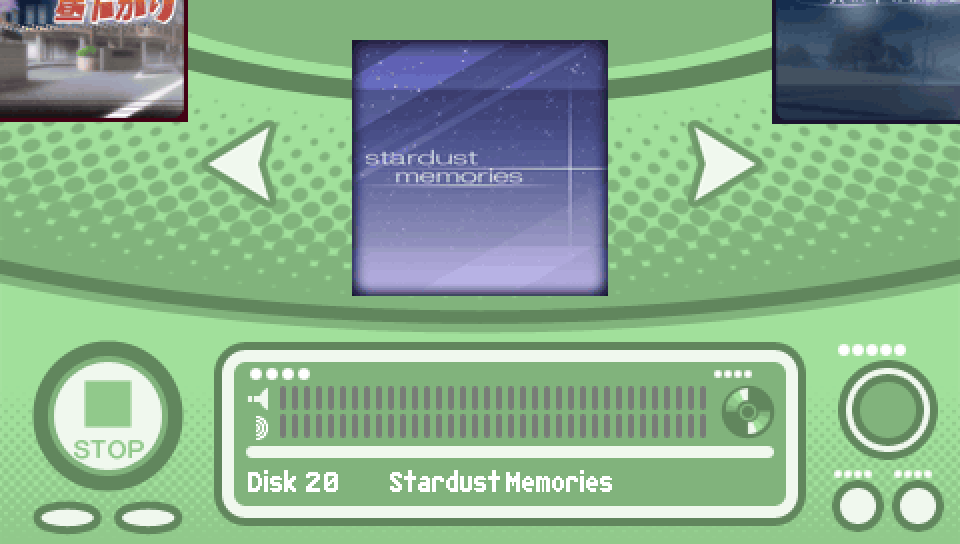
The song "Stardust Memories" from the game's soundtrack is in reference
to the name of the 1991 OVA series "Mobile Suit Gundam 0083: Stardust Memory"
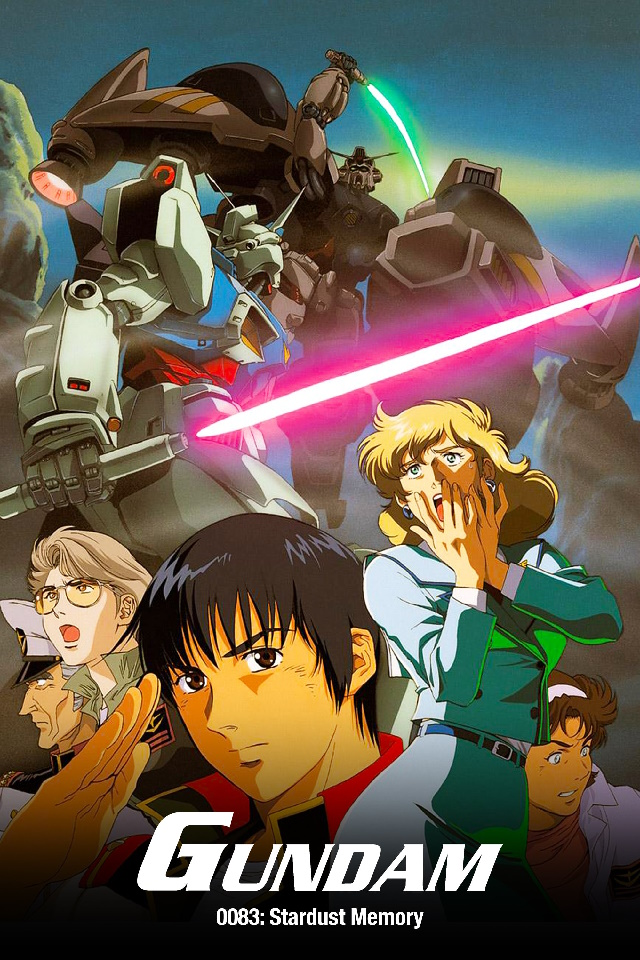
|
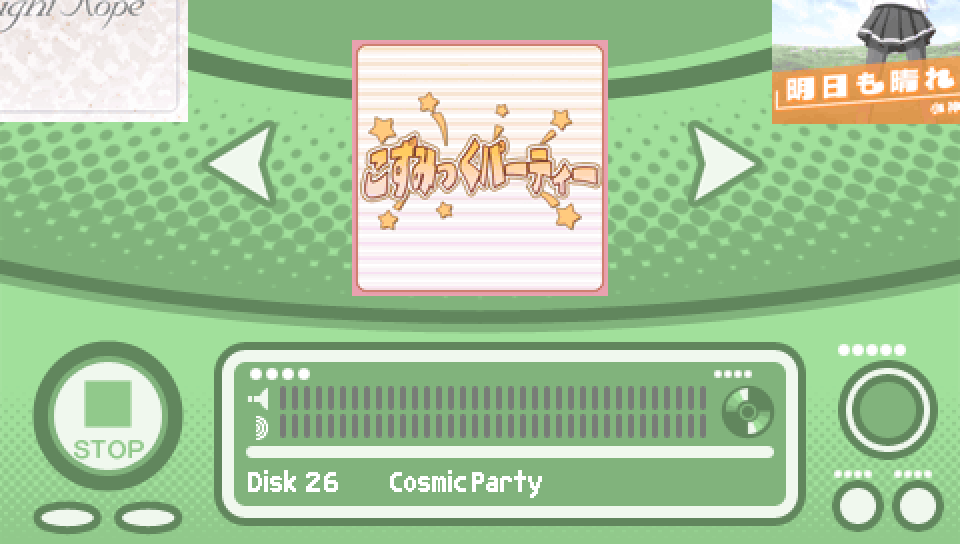
The song "Cosmic Party" from the game's soundtrack is in reference
to the 1999 visual novel "Comic Party". The album art is also
meant to resemble the game's logo.
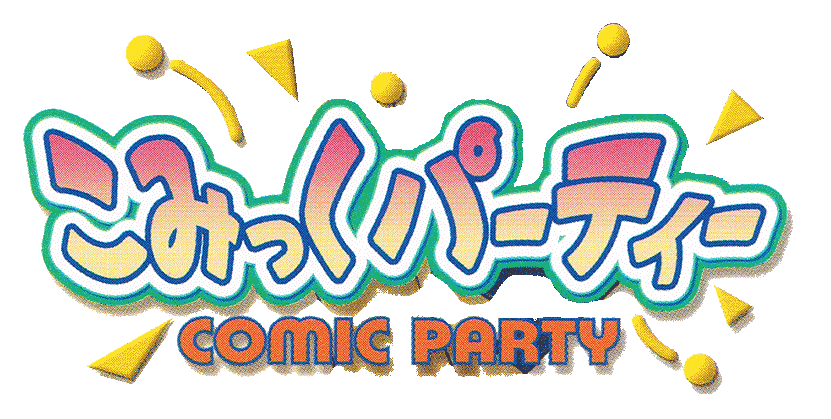
|
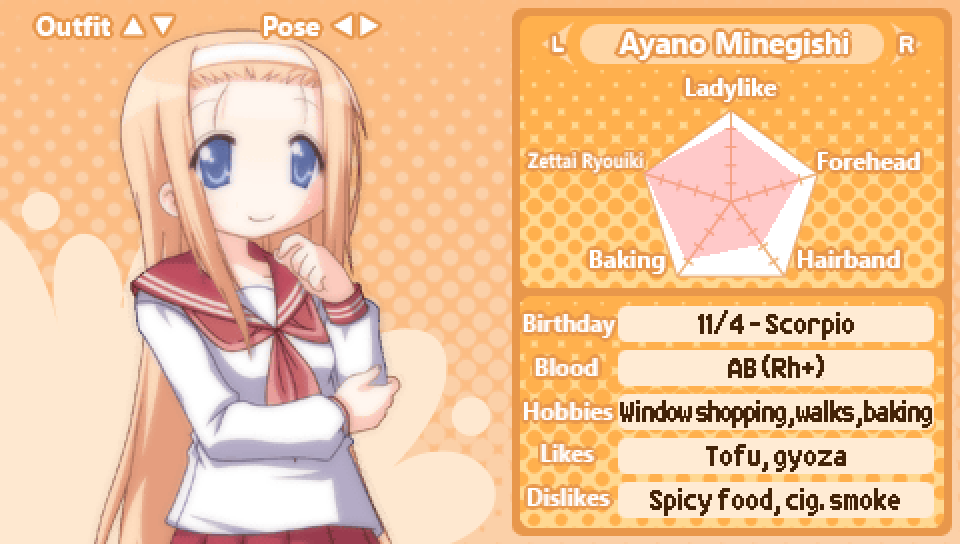
One of Ayano's character stats in the profile menu is "Zettai Ryouiki", which will appear on her
character profile upon first meeting her. This is a Japanese term literally meaning "absolute territory",
and refers to the region of exposed skin that is visible when a girl wears thigh socks and a short skirt.
Ayano is the only Lucky Star girl that wears thigh socks, and therefore is the only one with a "zettai ryouiki",
which is why she is given this stat.
Despite this, however, Ayano's thigh socks are actually not visible anywhere within
Ryouou Gakuen Outousai Portable. All of Ayano's character portraits and CGs where she appears
do not show low enough on Ayano's design to show the socks, and therefore the full "zettai ryouiki"
cannot be seen, as the skirt and socks that bookend it are a crucial component of it.
With that said, Ayano's thigh socks are visible in the PS2 version of one of the endgame CGs,
due to the PS2's 4:3 aspect ratio. The CG will not be shown here due to avoid spoilers,
but rest assured her socks are visible in it.
Outside of the game itself, Ayano's full design can be seen in the game's strategy guide,
allowing one to fully view the "zettai ryouiki".
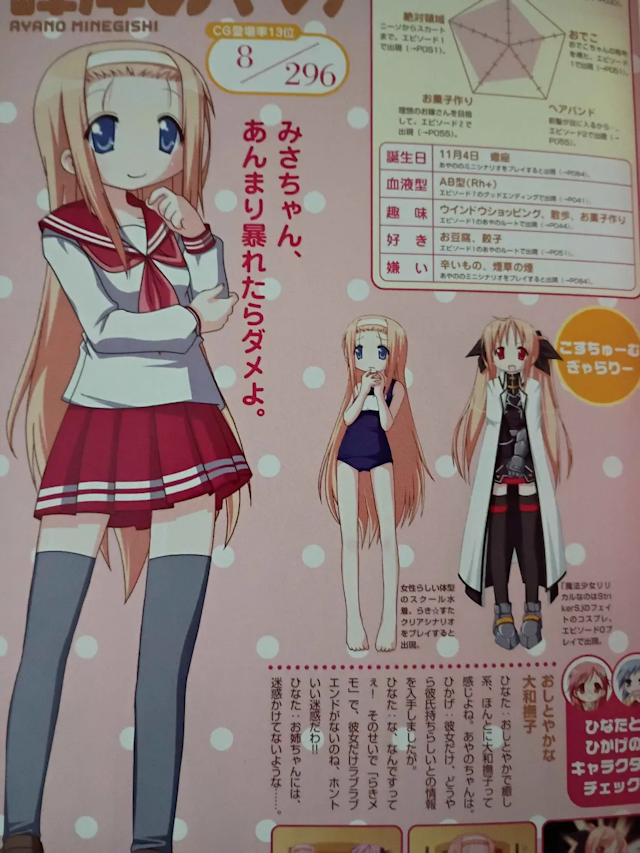
|
|




